

11+ creative writing guide with 50 example topics and prompts
by Hayley | Nov 17, 2022 | Exams , Writing | 0 comments
The 11+ exam is a school entrance exam taken in the academic year that a child in the UK turns eleven.
These exams are highly competitive, with multiple students battling for each school place awarded.
The 11 plus exam isn’t ‘one thing’, it varies in its structure and composition across the country. A creative writing task is included in nearly all of the 11 plus exams, and parents are often confused about what’s being tested.
Don’t be fooled into thinking that the plot of your child’s writing task is important. It is not.
The real aim of the 11+ creative writing task is to showcase your child’s writing skills and techniques.
And that’s why preparation is so important.
This guide begins by answering all the FAQs that parents have about the 11+ creative writing task.
At the end of the article I give my best tips & strategies for preparing your child for the 11+ creative writing task , along with 50 fiction and non-fiction creative writing prompts from past papers you can use to help your child prepare. You’ll also want to check out my 11+ reading list , because great readers turn into great writers.
Do all 11+ exams include a writing task?
Not every 11+ exam includes a short story component, but many do. Usually 3 to 5 different prompts are given for the child to choose between and they are not always ‘creative’ (fiction) pieces. One or more non-fiction options might be given for children who prefer writing non-fiction to fiction.
Timings and marking vary from test to test. For example, the Kent 11+ Test gives students 10 minutes for planning followed by 30 minutes for writing. The Medway 11+ Test gives 60 minutes for writing with ‘space allowed’ on the answer booklet for planning.
Tasks vary too. In the Kent Test a handful of stimuli are given, whereas 11+ students in Essex are asked to produce two individually set paragraphs. The Consortium of Selective Schools in Essex (CCSE) includes 2 creative writing paragraphs inside a 60-minute English exam.
Throughout the UK each 11+ exam has a different set of timings and papers based around the same themes. Before launching into any exam preparation it is essential to know the content and timing of your child’s particular writing task.
However varied and different these writing tasks might seem, there is one key element that binds them.
The mark scheme.
Although we can lean on previous examples to assess how likely a short story or a non-fiction tasks will be set, it would be naïve to rely completely on the content of past papers. Contemporary 11+ exams are designed to be ‘tutor-proof’ – meaning that the exam boards like to be unpredictable.
In my online writing club for kids , we teach a different task each week (following a spiral learning structure based on 10 set tasks). One task per week is perfected as the student moves through the programme of content, and one-to-one expert feedback ensures progression. This equips our writing club members to ‘write effectively for a range of purposes’ as stated in the English schools’ teacher assessment framework.
This approach ensures that students approaching a highly competitive entrance exam will be confident of the mark scheme (and able to meet its demands) for any task set.
Will my child have a choice of prompts to write from or do they have to respond to a single prompt, without a choice?
This varies. In the Kent Test there are usually 5 options given. The purpose is to gather a writing sample from each child in case of a headteacher appeal. A range of options should allow every child to showcase what they can do.
In Essex, two prescriptive paragraphs are set as part of an hour-long English paper that includes comprehension and vocabulary work. In Essex, there is no option to choose the subject matter.
The Medway Test just offers a single prompt for a whole hour of writing. Sometimes it is a creative piece. Recently it was a marketing leaflet.
The framework for teaching writing in English schools demands that in order to ‘exceed expectations’ or better, achieve ‘greater depth’, students need to be confident writing for a multitude of different purposes.
In what circumstances is a child’s creative writing task assessed?
In Essex (east of the UK) the two prescriptive writing tasks are found inside the English exam paper. They are integral to the exam and are assessed as part of this.
In Medway (east Kent in the South East) the writing task is marked and given a raw score. This is then adjusted for age and double counted. Thus, the paper is crucial to a pass.
In the west of the county of Kent there is a different system. The Kent Test has a writing task that is only marked in appeal cases. If a child dips below the passmark their school is allowed to put together a ‘headteacher’s appeal’. At this point – before the score is communicated to the parent (and probably under cover of darkness) the writing sample is pulled out of a drawer and assessed.
I’ve been running 11+ tutor clubs for years. Usually about 1% of my students passed at headteacher’s appeal.
Since starting the writing club, however, the number of students passing at appeal has gone up considerably. In recent years it’s been more like 5% of students passing on the strength of their writing sample.
What are the examiners looking for when they’re marking a student’s creative writing?
In England, the government has set out a framework for marking creative writing. There are specific ‘pupil can’ statements to assess whether a student is ‘working towards the expected standard,’ ‘working at the expected standard’ or ‘working at greater depth’.
Members of the headteacher panel assessing the writing task are given a considerable number of samples to assess at one time. These expert teachers have a clear understanding of the framework for marking, but will not be considering or discussing every detail of the writing sample as you might expect.
Schools are provided with a report after the samples have been assessed. This is very brief indeed. Often it will simply say ‘lack of precise vocabulary’ or ‘confused paragraphing.’
So there is no mark scheme as such. They won’t be totting up your child’s score to see if they have reached a given target. They are on the panel because of their experience, and they have a short time to make an instant judgement.
Does handwriting matter?
Handwriting is assessed in primary schools. Thus it is an element of the assessment framework the panel uses as a basis for their decision.
If the exam is very soon, then don’t worry if your child is not producing immaculate, cursive handwriting. The focus should simply be on making it well-formed and legible. Every element of the assessment framework does not need to be met and legible writing will allow the panel to read the content with ease.
Improve presentation quickly by offering a smooth rollerball pen instead of a pencil. Focus on fixing individual letters and praising your child for any hint of effort. The two samples below are from the same boy a few months apart. Small changes have transformed the look and feel:

Sample 1: First piece of work when joining the writing club

Sample 2: This is the same boy’s improved presentation and content
How long should the short story be.
First, it is not a short story as such—it is a writing sample. Your child needs to showcase their skills but there are no extra marks for finishing (or marks deducted for a half-finished piece).
For a half hour task, you should prepare your child to produce up to 4 paragraphs of beautifully crafted work. Correct spelling and proper English grammar is just the beginning. Each paragraph should have a different purpose to showcase the breadth and depth of their ability. A longer – 60 minute – task might have 5 paragraphs but rushing is to be discouraged. Considered and interesting paragraphs are so valuable, a shorter piece would be scored more highly than a rushed and dull longer piece.
I speak from experience. A while ago now I was a marker for Key Stage 2 English SATs Papers (taken in Year 6 at 11 years old). Hundreds of scripts were deposited on my doorstep each morning by DHL. There was so much work for me to get through that I came to dread long, rambling creative pieces. Some children can write pages and pages of repetitive nothingness. Ever since then, I have looked for crafted quality and am wary of children judging their own success by the number of lines competed.
Take a look at the piece of writing below. It’s an excellent example of a well-crafted piece.
Each paragraph is short, but the writer is skilful.
He used rich and precisely chosen vocabulary, he’s broken the text into natural paragraphs, and in the second paragraph he is beginning to vary his sentence openings. There is a sense of control to the sentences – the sentence structure varies with shorter and longer examples to manage tension. It is exciting to read, with a clear awareness of his audience. Punctuation is accurate and appropriate.

11+ creative writing example story
How important is it to revise for a creative writing task.
It is important.
Every student should go into their 11+ writing task with a clear paragraph plan secured. As each paragraph has a separate purpose – to showcase a specific skill – the plan should reflect this. Built into the plan is a means of flexing it, to alter the order of the paragraphs if the task demands it. There’s no point having a Beginning – Middle – End approach, as there’s nothing useful there to guide the student to the mark scheme.
Beyond this, my own students have created 3 – 5 stories that fit the same tight plan. However, the setting, mood and action are all completely different. This way a bank of rich vocabulary has already been explored and a technique or two of their own that fits the piece beautifully. These can be drawn upon on the day to boost confidence and give a greater sense of depth and consideration to their timed sample.
Preparation, rather than revision in its classic form, is the best approach. Over time, even weeks or months before the exam itself, contrasting stories are written, improved upon, typed up and then tweaked further as better ideas come to mind. Each of these meets the demands of the mark scheme (paragraphing, varied sentence openings, rich vocabulary choices, considered imagery, punctuation to enhance meaning, development of mood etc).
To ensure your child can write confidently at and above the level expected of them, drop them into my weekly weekly online writing club for the 11+ age group . The club marking will transform their writing, and quickly.
What is the relationship between the English paper and the creative writing task?
Writing is usually marked separately from any comprehension or grammar exercises in your child’s particular 11+ exam. Each exam board (by area/school) adapts the arrangement to suit their needs. Some have a separate writing test, others build it in as an element of their English paper (usually alongside a comprehension, punctuation and spelling exercise).
Although there is no creative writing task in the ISEB Common Pre-test, those who are not offered an immediate place at their chosen English public school are often invited back to complete a writing task at a later date. Our ISEB Common Pre-test students join the writing club in the months before the exam, first to tidy up the detail and second to extend the content.
What if my child has a specific learning difficulty (dyslexia, ADD/ADHD, ASD)?
Most exam boards pride themselves on their inclusivity. They will expect you to have a formal report from a qualified professional at the point of registration for the test. This needs to be in place and the recommendations will be considered by a panel. If your child needs extra arrangements on the day they may be offered (it isn’t always the case). More importantly, if they drop below a pass on one or more papers you will have a strong case for appeal.
Children with a specific learning difficulty often struggle with low confidence in their work and low self-esteem. The preparations set out above, and a kids writing club membership will allow them to go into the exam feeling positive and empowered. If they don’t achieve a pass at first, the writing sample will add weight to their appeal.
Tips and strategies for writing a high-scoring creative writing paper
- Read widely for pleasure. Read aloud to your child if they are reluctant.
- Create a strong paragraph plan where each paragraph has a distinct purpose.
- Using the list of example questions below, discuss how each could be written in the form of your paragraph plan.
- Write 3-5 stories with contrasting settings and action – each one must follow your paragraph plan. Try to include examples of literary devices and figurative language (metaphor, simile) but avoid clichés.
- Tidy up your presentation. Write with a good rollerball pen on A4 lined paper with a printed margin. Cross out with a single horizontal line and banish doodling or scribbles.
- Join the writing club for a 20-minute Zoom task per week with no finishing off or homework. An expert English teacher will mark the work personally on video every Friday and your child’s writing will be quickly transformed.
Pressed for time? Here’s a paragraph plan to follow.
At Griffin Teaching we have an online writing club for students preparing for the 11 plus creative writing task . We’ve seen first-hand what a difference just one or two months of weekly practice can make.
That said, we know that a lot of people reading this page are up against a hard deadline with an 11+ exam date fast approaching.
If that’s you (or your child), what you need is a paragraph plan.
Here’s one tried-and-true paragraph plan that we teach in our clubs. Use this as you work your way through some of the example prompts below.
11+ creative writing paragraph plan
Paragraph 1—description.
Imagine standing in the location and describe what is above the main character, what is below their feet, what is to their left and right, and what is in the distance. Try to integrate frontend adverbials into this paragraph (frontend adverbials are words or phrases used at the beginning of a sentence to describe what follows—e.g. When the fog lifted, he saw… )
Paragraph 2—Conversation
Create two characters who have different roles (e.g. site manager and student, dog walker and lost man) and write a short dialogue between them. Use what we call the “sandwich layout,” where the first person says something and you describe what they are doing while they are saying it. Add in further descriptions (perhaps of the person’s clothing or expression) before starting a new line where the second character gives a simple answer and you provide details about what the second character is doing as they speak.
Paragraph 3—Change the mood
Write three to four sentences that change the mood of the writing sample from light to gloomy or foreboding. You could write about a change in the weather or a change in the lighting of the scene. Another approach is to mention how a character reacts to the change in mood, for example by pulling their coat collar up to their ears.
Paragraph 4—Shock your reader
A classic approach is to have your character die unexpectedly in the final sentence. Or maybe the ceiling falls?
11+ creative writing questions from real papers—fictional prompts
- The day the storm came
- The day the weather changed
- The snowstorm
- The rainy day
- A sunny day out
- A foggy (or misty) day
- A day trip to remember
- The first day
- The day everything changed
- The mountain
- The hillside
- The old house
- The balloon
- The old man
- The accident
- The unfamiliar sound
- A weekend away
- Moving house
- A family celebration
- An event you remember from when you were young
- An animal attack
- The school playground at night
- The lift pinged and the door opened. I could not believe what was inside…
- “Run!” he shouted as he thundered across the sand…
- It was getting late as I dug in my pocket for the key to the door. “Hurry up!” she shouted from inside.
- I know our back garden very well, but I was surprised how different it looked at midnight…
- The red button on the wall has a sign on it saying, ‘DO NOT TOUCH.’ My little sister leant forward and hit it hard with her hand. What happened next?
- Digging down into the soft earth, the spade hit something metal…
- Write a story which features the stopping of time.
- Write a story which features an unusual method of transport.
- The cry in the woods
- Write a story which features an escape
11+ creative writing questions from real papers—non-fiction prompts
- Write a thank you letter for a present you didn’t want.
- You are about to interview someone for a job. Write a list of questions you would like to ask the applicant.
- Write a letter to complain about the uniform at your school.
- Write a leaflet to advertise your home town.
- Write a thank you letter for a holiday you didn’t enjoy.
- Write a letter of complaint to the vet after an unfortunate incident in the waiting room.
- Write a set of instructions explaining how to make toast.
- Describe the room you are in.
- Describe a person who is important to you.
- Describe your pet or an animal you know well.
15 Creative Writing Prompts for 11-year-olds Preparing for the 11 Plus English Exam

If your child is in year 5 of primary school, then chances are they may be sitting their 11+ exams soon.
In many of the 11 Plus exams will be an English paper that includes a creative essay, in which your child will be expected to demonstrate their literacy skills creatively by using extensive language, grammar and punctuation.
In order to put their best foot forward, your child will need to prepare adequately – there is no such thing as too much practice when it comes to writing. That’s why we have created some free creative writing resources , including the following 15 creative writing prompts to help your child exercise their creativity
Don’t forget – we have lots of writing prompts books and booklets, too! See below:
15 Creative Writing Prompts

- Let’s say you could create your own animal, what would it look like? How would you describe it in terms of size, colour and height? What would it sound like? What does it eat?
- Write a story about a day in your life from the viewpoint of a mouse.
- Imagine you are 10 years older. Write about what the 21-year-old version of you would be like.
- Imagine that you were chosen as one of the first people to visit Mars. What would you take with you and what do you think the planet would be like?
- If you switched places with your parents for a day, how would you run the house? What rules would you introduce and which rules would you change?
Pages: 1 2 3
Share this:
2 responses to “15 creative writing prompts for 11-year-olds preparing for the 11 plus english exam”, leave a reply cancel reply.
You must be logged in to post a comment.
This site uses Akismet to reduce spam. Learn how your comment data is processed .
- Primary Tuition: 11+ Exam Tuition and Key Stage 1 and 2 Tuition
- Secondary Tuition: Key Stage 3 and GCSE
- Functional Skills Courses for 16+ and Adults

11+ Exam Creative Writing Guide: Help Your Child Write Their Way to Victory

Welcome to U2 Tuition’s 11+ Exam Creative Writing Guide, a valuable resource designed to support your child's journey towards success in the highly competitive 11+ exams. This comprehensive guide has been carefully crafted to provide you with the tools, insights, and guidance necessary to assist your child in developing their creative writing skills and achieving their full potential in the critical assessment. The 11 Plus exams serve as a significant milestone, determining entry into some of the most prestigious schools and setting the stage for their educational journey ahead. Among the various components of the 11+ exams, creative writing holds immense value, as it allows your child to showcase their imagination, language proficiency, and ability to craft compelling narratives.
In the guide, we will explore effective strategies, practical tips, and engaging exercises that will enhance your child's storytelling abilities, expand their vocabulary, and refine their writing skills. One of U2’s founders, Camille, is also the author of a rhyming children’s book, ‘Mister Finch and the Queen ’ - creative writing is hugely important to us and we love to help students hone their creative imagination, in preparation for the exams, but also far beyond.
Contents of the 11+ Creative Writing Guide
Through a series of carefully structured sections, we will delve into the fundamentals of creative writing, equipping you with the knowledge and resources needed to nurture your child's creativity and help them excel in their 11+ creative writing tasks. From sparking their imagination and assisting in the planning process to refining their grammar and sentence structure, we will cover every aspect of the writing journey.
This guide provides you with sample prompts and valuable insights into assessment criteria, allowing you to support your child in preparing for the exams with confidence. By familiarising yourself with the expectations of the 11+ creative writing tasks, you can guide your child in crafting narratives that resonate with the examiners and stand out from the competition.

Section 1: The Fundamentals of Great Creative Writing in Exams
Imagination: unleashing the power of creativity.
One of the key elements that make a piece of creative writing exceptional is imagination. Encouraging your child to tap into their creativity allows them to create unique stories and characters that captivate readers. Here are some ways you can help nurture their imagination:
a. Read widely: Expose your child to a diverse range of books, genres, and authors. Reading not only enhances their vocabulary but also sparks their imagination by introducing them to different worlds, perspectives, and storytelling styles. Here are some of our suggestions:
Sevenoaks Year 7 Reading List: On Sevenoaks School’s 11+ admissions page, they publish a Reading List designed to challenge students to advance their reading level
U2 Tuition’s Book Recommendation Blogs: In our Free Resource Library, we include a range of book recommendations by age. E.g. The 5 Best Books to Read For Younger Readers , or to challenge your child: 7 Books To Read Before You Turn 14
b. Encourage daydreaming : Provide opportunities for your child to daydream and let their imagination wander. This unstructured time allows them to explore their thoughts, visualise scenes, and develop ideas for their writing. Inspiration can be found in such a variety of places e.g. exploring the great outdoors, visiting the theatre or ballet.
c. Engage in imaginative play: Encourage your child to engage in creative play, where they can invent stories, characters, and settings. This playful exploration strengthens their storytelling abilities and nurtures their imaginative thinking.
Structure: Planning and Organisation
An important aspect of successful creative writing is having a well-structured piece. Planning and organisation help your child create a coherent and engaging narrative. Consider the following tips to support them in this process:
a. Brainstorming: Encourage your child to brainstorm ideas before they start writing. They can jot down key plot points, interesting characters, or striking settings (Tip: Stories don’t have to be set in the modern era! A story set in an interesting historical period can be very effective) . The brainstorming process helps them generate multiple options and select the most compelling ones.
b. Story mapping: Guide your child in creating a story map or outline. This visual representation of their narrative allows them to see the overall structure, ensuring that the story has a clear beginning, middle, and end. When practising, students can spend more time planning than they would do in the exam, but as they approach 11+ examinations, they should try to limit themselves to about 5 minutes planning time to ensure they have enough time to write the story.
Exercise - Provide your child with story outline worksheets or templates that guide them through the different elements of storytelling. These worksheets typically include sections for the introduction, rising action, climax, falling action, and resolution. They help your child organise their ideas and ensure a cohesive story structure.
Here are some planning resources we have compiled to help your child become a planning whizz!
Plot diagrams: Introduce your child to plot diagrams such as the story mountain . These visual tools illustrate the key components of a story, including the exposition, rising action, climax, falling action, and resolution. Plot diagrams help your child understand the overall structure of a story and ensure that their narrative has a clear progression.
Exercise - Planning Practice:
Engage your child in story planning exercises that involve outlining their story's beginning, middle, and end. Encourage them to identify the main conflict, the major turning points, and the resolution of their story. This exercise helps them develop a clear direction and roadmap for their narrative.
c. Developing characters: Encourage your child to flesh out their characters by creating detailed descriptions, including their personality traits, motivations, and backstories. Well-developed characters add depth and authenticity to the story.

Engaging Openings: Capturing the Reader's Attention
In the context of exams, it is crucial for your child's writing to capture the examiner's attention from the very beginning. The opening lines should intrigue, engage, and entice the reader to continue. Help your child craft engaging openings by:
a. Starting with action or dialogue: They could begin the story with an exciting event, a dramatic moment, or a thought-provoking line of dialogue. This immediately draws the reader into the narrative and creates a sense of curiosity.
Exercise - Opening Hooks:
Explore different types of opening hooks with your child, such as:
A captivating first sentence that grabs the reader's attention.
An intriguing question that piques curiosity.
A vivid description that immerses the reader in the setting.
A compelling dialogue that sets the tone or reveals a conflict.
Encourage your child to experiment with these techniques to create engaging story openings.
Exercise - Analysing Story Openings From Favourite Books:
Encourage your child to read and analyse opening paragraphs from well-crafted books or short stories. Discuss with your child what makes those openings captivating, such as strong imagery, unique perspectives, or a sense of mystery. This should help inspire your child to incorporate similar techniques into their own writing.
Exercise - Writing Prompts:
Provide your child with specific writing prompts that focus on crafting effective story openings. For example:
Start a story with the line: "The door creaked open, revealing..."
Begin a story with a character waking up in a strange place.
Write a story that starts with a sudden unexpected event.
Such prompts challenge your child to think creatively about how to hook readers from the very first sentence.
Exercise - Sensory Details Exercise:
Encourage your child to practise writing sensory details specifically for story openings. Have them choose a setting, and then ask them to describe what it looks like, sounds like, smells like, and feels like. This exercise helps create a vivid opening that draws readers into the story world.
Exercise - Story Opening Writing Exercises:
Engage your child in writing exercises specifically focused on crafting strong story openings. For example, ask them to write multiple versions of the opening paragraph for the same story idea, experimenting with different hooks, perspectives, or tones. This practice helps them explore different possibilities and select the most compelling opening.
b. Creating vivid descriptions: Encourage your child to use descriptive language to paint a vivid picture of the scene or setting. Engaging the reader's senses through rich imagery helps establish an immersive experience right from the start. Including sensory description is so important - encourage your child to try to use as many of their 5 senses as possible in their writing e.g. sound (via alliteration, onomatopoeia, sibilance etc.), touch (textures - is an object hard, feathery…how does the rain feel on the character’s skin?), sight (using colour, strong descriptive language e.g. double adjectives) etc.
c. Posing a question or mystery: Raise a compelling question or present a mystery in the opening lines. This creates intrigue and prompts the reader to keep reading to find the answers.
Engaging Storytelling:
At the heart of great creative writing lies the art of storytelling. Students should aim to craft a narrative that captivates their reader from the very beginning. As mentioned above, they should start with a strong opening that grabs attention and sets the tone for the story. They must then develop their characters by giving them depth, personalities, and motives. Creating a plot that is well-paced, with rising action, a compelling climax, and a satisfying resolution, is essential for students to stand out amongst other strong candidates. The following section is dedicated to this!
Section 2: The Art of Effective Storytelling
In this section of the guide, we will delve into the art of effective storytelling, exploring various literary techniques that will elevate your child's creative writing to new heights. We will discuss the power of vivid imagery, engaging dialogue, and well-paced plot development. Additionally, we will emphasise the importance of grammar, vocabulary, and sentence structure in crafting polished and sophisticated narratives. To help your child practise these skills, we have included practical exercises and stimulating prompts throughout this section.

Vivid Imagery: Painting Pictures with Words
Vivid imagery is a powerful tool that brings stories to life, allowing readers to visualise the scenes and immerse themselves in the narrative. Encourage your child to incorporate the following techniques:
a. Sensory details: Prompt your child to include sensory details such as sight, sound, smell, taste, and touch. By describing the sensory experiences within the story, they create a rich and immersive reading experience.
Exercise - Sensory Writing Prompts:
Provide your child with prompts that encourage them to incorporate sensory details into their writing:
Ask your child to write a paragraph describing a bustling marketplace, focusing on sensory details to bring it to life.
"Describe a walk through a bustling city street, focusing on the sights, sounds, and smells."
"Imagine you're on a beach at sunset. Write a paragraph that captures the feeling of warm sand between your toes, the scent of the ocean, and the sound of crashing waves."
Exercise - Sensory Observation Exercises:
Encourage your child to engage in sensory observation activities in their everyday life. This could include going on nature walks, visiting different environments, or exploring new places. Prompt them to pay attention to the sights, sounds, smells, tastes, and textures around them. Afterwards, ask them to write a short paragraph or poem that vividly describes their sensory experiences.
Exercise - Sensory Word Banks:
Create a sensory word bank with your child. Brainstorm adjectives and descriptive phrases that relate to each of the five senses. Encourage them to use this word bank as a reference when writing, helping them choose precise and evocative language to convey sensory experiences.
Exercise - Sensory Object Descriptions:
Select an object, such as a piece of fruit or a common household item, and ask your child to write a detailed description that engages multiple senses. Encourage them to explore the object's appearance, texture, smell, taste, and even the sounds associated with it. This exercise helps develop their ability to incorporate sensory details into their writing in a focused and deliberate manner.
Engaging Dialogue: Breathing Life into Characters
Dialogue plays a crucial role in storytelling, giving voice to the characters and revealing their personalities, motivations, and relationships. Help your child create engaging dialogue by:
a. Showing character through speech: Encourage your child to use dialogue to reveal character traits, emotions, and conflicts. Each character should have a distinct voice and manner of speaking.
Exercise - Provide your child with prompts that require them to develop dialogue-rich scenes. This will give them practice in using dialogue effectively to reveal character traits, emotions, and relationships. For example:
Provide your child with a prompt and ask them to write a dialogue between two characters who have opposing viewpoints.
"Write a conversation between two characters who have just discovered a hidden treasure."
"Imagine two friends who are having a disagreement. Write a dialogue that shows their conflicting viewpoints."
Exercise - Character Interview :
Ask your child to imagine they are interviewing one of the characters from their story. Have them prepare a list of questions and encourage them to respond in the character's voice. This exercise helps them dive deeper into the character's personality and unique way of speaking.
Exercise - Dialogue Tags and Actions:
Discuss the importance of using dialogue tags and actions to enhance the portrayal of characters. Encourage your child to include descriptive tags and actions that complement the dialogue and provide additional insights into the characters' emotions or mannerisms. For instance:
She exclaimed with a wide grin, 'I can't believe it!'
He muttered under his breath, 'This is going to be a disaster.'
Well-Paced Plot Development: Building Tension and Momentum
A well-paced plot keeps readers engaged and eager to know what happens next. Teach your child how to develop a well-structured story with the following techniques:
a. Introduce conflict: Encourage your child to introduce conflict early in the story to create tension and drive the plot forward. This can be an internal conflict within the main character or an external conflict with other characters or the setting.
b. Build suspense: Guide your child in building suspense through strategic use of foreshadowing, cliff-hangers, or unexpected plot twists. This keeps readers on the edge of their seats, eager to find out what happens next.
Exercise - Suspenseful Story Prompts: Provide your child with a prompt and ask them to write a short story with a suspenseful plot twist towards the end. For example:
"Write a story about a group of friends who stumble upon a mysterious abandoned house."
"Imagine you're trapped in a haunted forest at night. Describe your attempts to find a way out."
Exercise - Analysing Suspenseful Scenes:
Read suspenseful scenes from well-known books or films with your child. Discuss how the author or filmmaker built tension and kept the reader or viewer engaged. Examples could include:
The introduction of the antagonist in a mystery novel.
A thrilling chase sequence in an action film.
Exercise - Foreshadowing Exercises:
Encourage your child to practice foreshadowing, a literary technique that hints at future events and builds anticipation. Ask them to include subtle clues or hints in their writing that suggest something significant is about to happen. For instance:
"Write a story where a character finds a mysterious object at the beginning, and later reveal its importance or danger."
"Include a brief mention of a storm brewing in the distance, and later incorporate it as a key element of the climax."
Exercise - Studying Suspenseful Authors:
Read works by authors known for their ability to build suspense. Discuss specific techniques they employ and how your child can incorporate similar elements into their writing. Examples of authors known for suspenseful storytelling include:
Edgar Allan Poe
Agatha Christie
Remember, building suspense is about creating anticipation and keeping readers on the edge of their seats. Encourage your child to experiment with these techniques, combine them with their own unique storytelling style, and practice regularly to refine their ability to craft suspenseful narratives.

Grammar, Vocabulary, and Sentence Structure: Polishing the Writing
Strong language skills are essential for effective creative writing. Help your child refine their grammar, vocabulary, and sentence structure by:
a. Expanding vocabulary: Encourage your child to explore new words and phrases, providing opportunities for them to learn and incorporate them into their writing. A rich vocabulary enhances their ability to express ideas precisely.
b. Sentence variety: Teach your child to vary sentence structure by using different sentence lengths, types, and structures. This adds rhythm and flow to their writing, making it more engaging to read.
Exercise - Provide your child with a list of vocabulary words and ask them to write a short story incorporating as many of the words as possible while maintaining a natural flow.
Here are some example resources and exercises that can help 11+ applicants refine their grammar, vocabulary, and sentence structure in their stories:
Grammar Practice Exercises: Utilise online grammar resources or workbooks specifically designed for 11+ exam preparation. These resources provide targeted grammar exercises and explanations to help your child strengthen their understanding of grammatical rules and conventions.
Vocabulary Expansion Activities: Encourage your child to actively expand their vocabulary by engaging in activities such as:
Reading widely: Encourage them to read books, magazines, and newspapers that expose them to a variety of words and contexts.
Word-of-the-day: Introduce a new word to your child each day and challenge them to use it in their writing or conversation.
Thesaurus exploration: Encourage your child to use a thesaurus to find synonyms and antonyms for common words, allowing them to enrich their writing with more precise and varied vocabulary.
Sentence Structure Exercises: Provide your child with exercises that focus on sentence structure and variety. For example:
Rewrite a paragraph by transforming simple sentences into complex or compound sentences.
Ask your child to create a set of sentences using different sentence types, such as declarative, interrogative, imperative, and exclamatory .
Grammar and Vocabulary Games: Make learning grammar and vocabulary fun by engaging in interactive games and activities. There are various online resources and mobile apps that offer educational games to reinforce grammar rules, word meanings, and sentence construction.
Section 3: 11+ Creative Writing Admissions Criteria
Admissions criteria for 11+ creative writing can vary depending on the specific school or exam consortium. However, here are some common factors that are often considered in evaluating creative writing submissions:
1. Creativity and Originality: Admissions teams look for imaginative and original ideas in the writing. They assess whether the story, characters, and plot display unique and creative thinking.
2. Writing Style and Technique: The quality of the writing style and technique is essential. Examiners assess the use of literary devices, descriptive language, sentence structure, and overall fluency. They look for evidence of a strong command of language and the ability to engage the reader effectively.
3. Narrative Structure and Development: The structure of the narrative and its development are crucial. Admissions officers evaluate how well the story is organised, if it has a clear beginning, middle, and end, and whether there is a logical progression of events. They also consider how well the story builds tension, maintains reader interest, and resolves conflicts.
4. Characterisation: Examiners examine the depth and complexity of the characters in the story. They assess whether the characters are well-developed, believable, and have distinct voices. Strong character development helps to engage the reader and bring the story to life.
5. Adherence to the Prompt or Theme: Applicants are typically given a prompt or theme for their creative writing submission. Admissions officers evaluate how well the applicant addresses the prompt or incorporates the theme into their story. They assess the level of understanding and engagement with the given topic.
6. Grammar, Spelling, and Punctuation: While creativity and storytelling are important, examiners also consider the technical aspects of writing. They look for a high level of accuracy in grammar, spelling, and punctuation, as these are indicators of a writer's attention to detail and ability to communicate effectively.
It's important to note that each school or exam consortium may have its own specific criteria and weightings for assessing creative writing submissions. Some schools may also consider the applicant's potential for improvement and growth. It's advisable to review the specific guidelines provided by the school or exam board to understand the precise criteria they use for evaluating creative writing submissions at the 11+ level.
Section 4: 11+ Creative Writing Prompts and Tips
Creative writing prompts can serve as excellent starting points to inspire your child's imagination and help them practise their storytelling skills. Encourage your child to embrace these prompts and unleash their creativity. Here are some example prompts along with tips on how to approach them:
1. Prompt: "Write a story about a magical adventure."
Tip: Encourage your child to let their imagination run wild. They can create a world filled with enchanted creatures, mysterious places, and unexpected twists. Remind them to think about the protagonist, their goals, and the challenges they must overcome.
2. Prompt: "Describe a memorable encounter with an animal."
Tip: Urge your child to tap into their senses and vividly describe the experience. Encourage them to think about the emotions evoked by the encounter, the physical appearance of the animal, and any unique characteristics or behaviors that make it stand out.
3. Prompt: "Imagine you can time travel. Write about a journey to a different era."
Tip: Encourage your child to research the chosen era to add authenticity to their story. They can focus on the sights, sounds, and customs of that time period, and imagine how their protagonist would navigate and interact with the world they've traveled to.
4. Prompt: "Write a story about a secret superpower."
Tip: Encourage your child to think beyond traditional superpowers and explore unique abilities. They can consider how their protagonist discovers their power, how they choose to use it, and the impact it has on their life and the world around them.
5. Prompt: "Describe a peculiar object found in an attic."
Tip: Encourage your child to bring the object to life by providing sensory details and incorporating a sense of mystery. They can explore the history and significance of the object, the emotions it evokes, and the impact it has on the characters or the plot.
Tips for Tackling Creative Writing Prompts:
1. Plan and Outline: Encourage your child to spend a few minutes brainstorming and outlining their ideas before starting to write. This helps them organize their thoughts and create a clear structure for their story.
2. Use Vivid Language: Remind your child to incorporate sensory details and descriptive language to bring their story to life. Encourage them to engage the reader's senses through vivid imagery, similes, and metaphors.
3. Develop Characters: Encourage your child to create interesting and relatable characters. Prompt them to think about their characters' backgrounds, motivations, and conflicts to make their stories more engaging.
4. Build Tension: Encourage your child to create suspense and excitement in their stories by introducing obstacles, conflicts, and unexpected plot twists. Remind them to pace their story effectively to maintain the reader's interest.
5. Edit and Revise: After completing the first draft, remind your child of the importance of revising and editing their work. Encourage them to check for grammar and spelling errors, and to refine their sentences and word choices for clarity and impact.
By providing your child with creative writing prompts and tips for tackling them, you can help them develop their storytelling skills, enhance their creativity, and prepare for the 11+ creative writing exams. Remember to foster a supportive and encouraging environment, allowing your child to explore their imagination and enjoy the process of writing.
Our Top 11+ Creative Writing Book Recommendations
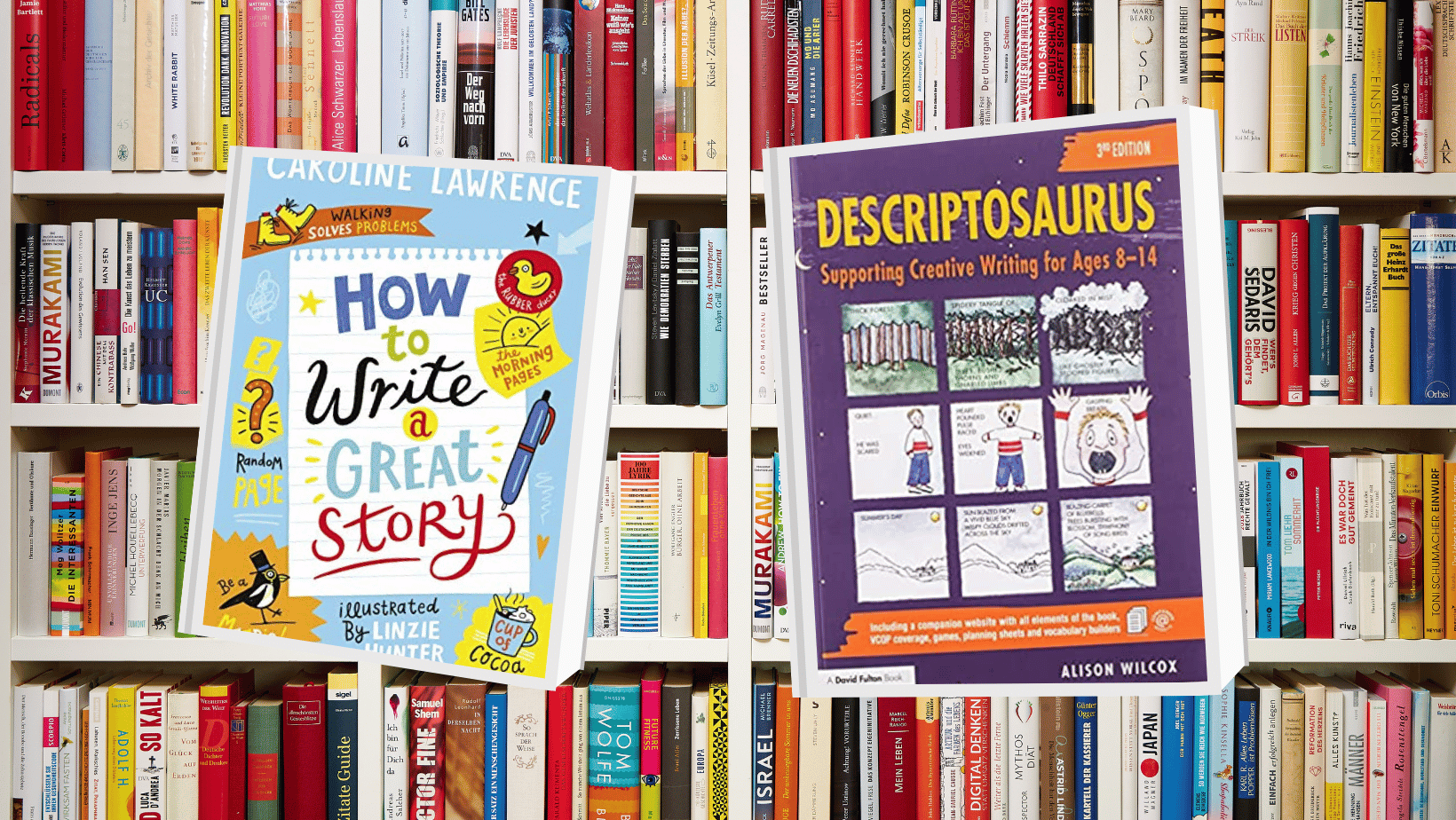
Descriptosaurus by Alison Wilcox is an invaluable resource for young writers looking to enhance their descriptive writing skills. The comprehensive guide offers a wide range of descriptive vocabulary and writing techniques, empowering students to create vivid and engaging descriptions across various genres. With a focus on developing sensory imagery, the book provides abundant examples, prompts, and exercises to inspire creativity and strengthen descriptive writing abilities.
How to Write a Great Story by Caroline Lawrence is a valuable guidebook for aspiring young writers who want to master the art of storytelling. Drawing on her experience as a bestselling author, Lawrence provides practical advice, helpful tips, and creative exercises to help readers craft compelling narratives. From developing engaging characters to building suspenseful plots and creating authentic dialogue, this book covers the essential elements of storytelling in an accessible and engaging manner.
To Conclude Our 11+ Creative Writing Guide
Congratulations on completing our 11+ Creative Writing Guide! By exploring the various aspects of creative writing, from storytelling techniques to sensory details, dialogue, grammar, vocabulary, and more, we hope you have equipped yourself with valuable tools to help your child excel in their creative writing endeavours.
Remember that creative writing is an opportunity for a child to unleash their imagination, express their thoughts, and captivate readers with their words. Students should continue to read widely, analyse the works of their favourite authors, and draw inspiration from the world around them.
Creative writing is not only a valuable skill for exams but also a lifelong tool for self-expression, communication, and personal growth. It nurtures students’ creativity, critical thinking, and empathy, allowing them to explore different perspectives and engage with the world in a unique way.
Are You Seeking an Experienced 11 Plus Creative Writing Tutor to Help Your Child Excel in Their 11 + English Exams?
We have a great team of 11+ English tutors, many of whom are experienced in supporting students in application to the majority of top UK Schools. With our expert guidance, your child will receive targeted instruction to develop their storytelling abilities, refine their grammar and vocabulary, and master the art of creative writing. Our tutors are experienced in preparing students for the specific demands of the 11+ exams, ensuring your child is well-equipped to tackle any creative writing prompt that comes their way.
Investing in a skilled 11+ tutor can make a significant difference in your child's performance and overall success. Our tutors provide a nurturing and supportive environment, fostering a love for writing and encouraging your child to reach their full potential.
The Details
We offer online and face-to-face tuition (our service area for in-person sessions is Central London)
Frequency of sessions is flexible and tailored to the particular student’s needs
Our 11+ English tutors are experienced in preparing students for the particulars of their target schools’ entrance tests - our 11+ English tutors will have studied the subject to degree level (or a related course)
We typically begin with a diagnostic session to informally assess the student’s current ability and identify points for development. All going well, your 11+ Creative Writing Tutor will tailor a plan for preparation
Session rates from £70/h + VAT
Book a free consultation to discuss your child's needs and goals here .
Exploring the Rich Tapestry: A Guide To Preparation for Oxford Archaeology and Anthropology in 2023
Our ultimate guide to applying for dentistry in 2024: preparation, personal statement, interview tips & more.
- T&C’s

Help your child succeed in their 11 Plus exams
The 11 plus guide - free advice and help for the 11 plus exams.

The 11 Plus Guide – FREE advice and help for the 11 Plus exams.
- 11 Plus Exam Papers & Books
- 11 Plus Exam Preparation
- 11 Plus Subjects
- Independent & Private Schools
- Grammar School Test Areas
- 11 Plus Forum
- Numerical Reasoning
- What do Maths tests include?
- Maths preparation mistakes
- Most common Maths mistakes
- Early years Maths preparation
- Year five Maths preparation
- CEM Numerical reasoning
- GL 11 Plus Maths
- School written Maths papers
- Maths- KS2 Syllabus topic guide
- Independent School Maths
- How to prepare for Engish
- English preparation mistakes
- Common English exam mistakes
- Gauging English performance level
- Early years English preparation
- Year five English preparation
- GL 11 Plus English
- CEM 11 Plus English
- School written English papers
- Key topics from the KS2 English Syllabus
- How to prepare for VR
- GL style tests
- CEM style tests
- Independent School VR
- VR preparation mistakes
- Most common VR mistakes
- Pressure and VR
- VR preparation in years three and four
- VR specific year four work
- VR preparation in year five
- How to prepare for Non-Verbal Reasoning
- GL Non-Verbal Reasoning
- CEM Non-Verbal Reasoning
- Independent School NVR
- Preparation mistakes NVR
- Exam mistakes NVR
- Pressure and Non-Verbal Reasoning
- Year three NVR preparation
- Year four NVR preparation
- Year five NVR preparation
- Classic Books Vocabulary
- How Children Develop Vocabulary
- Vocabulary Development Plan
- 11 Plus Vocabulary Books and Reviews
- 11 Plus Vocabulary Development
- 11 Plus Vocabulary List
- Commonly Misspelt Words – 11 Plus
- Homophones for the 11 Plus
- KS2 Statutory Spelling Words
- When to double letters in spelling
- 11 Plus Creative Writing – Example Topics and Tasks
11 Plus Creative Writing – Example Topics and Tasks
Schools can of course ask anything so these example tasks shouldn’t be used as stock answers.
Pupils will however find that developing a full description bank of characters, emotions, action, the natural world and the built environment etc will help them to deliver effective and creative descriptions on the day.
Using those description banks within these sample stories will help them to develop their work further and enable them to embed their thoughts so they can deliver properly on the day.
Remember if you are going to tackle any of these sample writing topics and tasks you should always plan to revisit your work a few days after you have done it. As part of the process children who often re-write their work to improve it find they make better progress.
Good resources to help with creative writing are rare. If you need help then we do recommend this creative writing preparation course . Since we started recommending it we have had very good feedback from our users, whether they have used it to prepare for an 11 Plus exam or an Independent entry test.
11 Plus creative writing example topics list
The following topics and tasks have come up in either in grammar school or independent school 11 plus writing tests:
Core themes for creative writing topics and tasks:
Many stories have core themes or emotions or feelings within them. When developing your descriptions banks these are useful areas to think about:
Animals – Typically describe your pet or your favourite animal or an animal you are frightened of. Be prepared to be use literary devices like personification or exaggeration or even simple similes to bring your description to life.
Emotions and feelings – Stories often include a requirement to describe emotion like fear, or joy or what it feels like to be lost or alone. They could easily ask you to describe enjoyment through a title like My brilliant day. Sometimes the titles may overtly lead you in a very clear direction. Lost ! and Alone! Are two previous examples that have come up.
Activities you enjoy doing – This is chance to describe the activity itself ( whatever you like from mountaineering to gardening and everything in between) plus how it makes you feel. Again your development of description banks should have helped you.
The natural world – Could be hills or mountains, rivers or streams or lightning or the rain or the feeling of sunshine or how a meadow looks or a field of wheat. Children who cover the natural world in their descriptions development work always find it useful.
The built environment – Think houses or offices blocks or cottages or castles. Roads and bridges, churches and sheds. Developing some thoughts about how to describe the built environment is always useful.
Story Titles:
Story titles can be long or short. Here are some examples of story titles which have come up in both Grammar School and Independent School tests.
- The Day Trip
- The Broken Window
- The Abandoned House
- The Voice in the Darkness
- Write a story with Alone as the title, where you suddenly realise that you are on your own. It may be a true or entirely made up, but it should include your thoughts and feelings as well as what happened.
- Write a story (true or made up) about a visit you make to some relations of your own.
- Write a letter to a cousin inviting him to stay with you. You should try and interest him in some of the varied and unusual activities he can take part in.
- Describe a situation which you have experienced which might also be called A Magical Moment, showing what your thoughts and feelings are.
- Write a clear description of an animal you know well. Make sure you describe what it does and how it behaves as well as what it looks like.
- I prefer Winter to Spring.
- The door and what was behind it.
- The Prince of Darkness is a Gentleman.
- Ash on an old man’s sleeve.
- Write a story that begins with the words – I had been waiting for such a long time for this to happen.
- Write a description of someone you admire. (You may choose someone you actually know, or someone you have never met. Describe them and explain why you admire them).
Recommended
Forum Feature
The 11 plus forum - answers to common questions about the 11 plus exam, favourites links, independent school past papers.

11 Plus Exam Format by Region

Preparation Options

Pages of Interest
Top ten tips, 11 plus guided courses, which books to use, 11 plus mock exams.
11 Plus Guide Copyright © 2024
Site Managed by Matt Porter

Choose Your Test
Sat / act prep online guides and tips, 105 creative writing prompts to try out.
General Education

The most common advice out there for being a writer is, "if you want to write, write." While this is true (and good advice), it's not always that easy, particularly if you're not writing regularly.
Whether you're looking for help getting started on your next project, or just want to spend 20 minutes being creative, writing prompts are great ways to rev up your imagination. Read on for our list of over 100 creative writing prompts!
feature image credit: r. nial bradshaw /Flickr
10 Short Writing Prompts
If you're looking for a quick boost to get yourself going, these 10 short writing prompts will do the trick.
#1 : Write a scene starting with a regular family ritual that goes awry.
#2 : Describe exactly what you see/smell/hear/etc, right now. Include objects, people, and anything else in your immediate environment.
#3 : Suggest eight possible ways to get a ping pong ball out of a vertical pipe.
#4 : A shoe falls out of the sky. Justify why.
#5 : If your brain were a tangible, physical place, what would it be like?
#6 : Begin your writing with the phrase, "The stage was set."
#7 : You have been asked to write a history of "The Summer of [this past year]." Your publisher wants a table of contents. What events will you submit?
#8 : Write a sympathetic story from the point of view of the "bad guy." (Think fractured fairy tales like Wicked or The True Story of the 3 Little Pigs! , although the story doesn't have to be a fairy tale.)
#9 : Look at everyday objects in a new way and write about the stories one of these objects contains.
#10 : One person meets a stranger on a mode of transportation. Write the story that ensues.

11 Writing Prompts for Kids
Any of these prompts can be used by writers of any age, but we chose the following 11 prompts as ones that would be particularly fun for kids to write about. (Most of them I used myself as a young writer, so I can vouch for their working!)
#1 : Include something falling in your writing.
#2 : Write a short poem (or story) with the title, "We don't know when it will be fixed."
#3 : Write from the perspective of someone of a different gender than you.
#4 : Write a dumb internet quiz.
#5 : Finish this thought: "A perfect day in my imagination begins like this:"
#6 : Write a character's inner monologue (what they are thinking as they go about their day).
#7 : Think of a character. Write a paragraph each about:
- An important childhood experience that character had.
- The character's living situation.
- Two hobbies or things the character likes to do.
- The room where the character sleeps.
- An ambition of the character.
- Two physical characteristics of the character.
- What happens when a second person and this character meet.
- Two important defining personal traits of this character.
#8 : Start a story with a quote from a song.
#9 : Begin a story with, "It was the summer of ______ when ______"
#10 : Pretend everyday objects have no names. Think about what you would name them based on what they do, what you can use them for, and what they look like.
#11 : Start a story with the phrases "My grandparents are/were," "My parents are/were," or "My mother/father/parent is/was."

15 Cool Writing Prompts
#1 : List five issues that you're passionate about. Write about them from the opposite point of view (or from the perspective of a character with the opposite point of view).
#2 : Walk around and write down a phrase you hear (or read). Make a story out of it.
#3 : Write using no adjectives or adverbs.
#4 : Write a character's inner dialogue between different aspects of a character's self (rather than an inner monologue).
#5 : Write a true story from your past that involves light or darkness in some way.
#6 : "Saying goodbye awakens us to the true nature of things." Write something in which someone has to say goodbye and has a realization.
#7 : Begin by writing the end of the story.
#8 : Write a recipe for an intangible thing.
#9 : Write a horror story about an ordinary situation (e.g., buying groceries, going to the bank, listening to music).
#10 : Write a story from within a bubble.
#11 : Write down 2-3 short character descriptions and then write the characters in conversation with one another.
#12 : Write a story in second person.
#13 : Write a story that keeps contradicting itself.
#14 : Write about a character with at least three big problems.
#15 : Write something that takes place on a Friday, the 13th (of any month).

15 Funny Writing Prompts
#1 : Write a story which starts with someone eating a pickle and potato sandwich.
#2 : Write a short script where the plot has to do with evil dolls trying to take over something.
#3 : Write about writers' block.
#4 : List five election issues that would be ridiculous to includes as part of your election platform (e.g. outlawing mechanical pencils and clicky pens, mandating every person over the age of 30 must own an emergency last rites kit). Choose one of the ridiculous issues and write a speech in favor of it.
#5 : Write a children's story that is insanely inappropriate but can't use graphic language, curses, or violence.
#6 : List five careers. Write about someone with one of those careers who wants to quit it.
#7 : Write down a list of murder methods. Choose one at random from the list to use in a story.
#8 : Write a romance story in which the hero must have a last name corresponding with a physical characteristic (e.g. Jacques Hairyback or Flora Dimple).
#9 : Come up with 10 different ways to:
- order a pizza
- congratulate someone on a job well done
- return to the store something that's broken
#10 : Search for "random Renaissance painting" (or any other inspirational image search text you can think of) on any online internet image search engine. Picking one image, write half a page each of:
- Statements about this image (e.g. "I meant bring me the BREAD of John the Baptist").
- Questions about this image (e.g. "How many of those cherubs look like their necks are broken?").
- Explanations of this image (e.g. "The painter ran out of blue paint halfway through and had to improvise for the color of the sky").
- Commands said by people in this image or about this image (e.g. "Stop telling me to smile!" or "Bring me some gasoline!").
#11 : Write starting with a word that sounds like "chute" (e.g. "chute," "shoot," "shooed").
#12 : Write about a character named X "The [article of clothing]" Y (e.g. Julie "The Yellow Darted Skirt" Whyte) or simply referred to by their clothing (e.g. "the man in the brown suit" or "the woman in black").
#13 : Write down a paragraph each describing two wildly different settings. Write a story involving both settings.
#14 : Think of a fictional holiday based around some natural event (e.g. the Earth being at its farthest point from the sun, in memory of a volcanic eruption, that time a cloud looked like a rabbit riding a bicycle). Write about how this holiday is celebrated.
#15 : Write a "Just-So" type story about a fictional creature (e.g. "how the dragon got its firebreath" or "how the mudkip got its cheek gills").

54 Other Writing Prompt Ideas
#1 : Borrow a character from some other form of media (or create your own). Write from that character's perspective.
#2 : Write for and against a non-consequential controversy (e.g., salt vs. pepper, Mac vs. PC, best kind of door).
#3 : Choose an ancestor or a person from the past to write about or to.
#4 : Write a pirate story with a twist.
#5 : Have a character talk about another character and their feelings about that other character.
#6 : Pick a season and think about an event in your life that occurred in that season. Write a creative nonfiction piece about that event and that season.
#7 : Think of something very complicated and long. Write a page about it using short sentences.
#8 : Write a story as a dream.
#9 : Describe around a food without ever directly naming it.
#10 : Write a monologue (one character, talking to the audience/reader) (*not* an inner monologue).
#11 : Begin a story with the phrase, "It only took five seconds to..."
#12 : List five strong emotions. Choosing one, write about a character experiencing that emotion, but only use the character's actions to convey how they are feeling (no outright statements).
#13 : Write a chapter of the memoir of your life.
#14 : Look through the (physical) things you're currently carrying with you or wearing. Write about the memories or emotions tied with each of them.
#15 : Go be in nature. Write drawing your story from your surroundings (both physical, social, and mental/emotional).

#16 : Write from the perspective of a bubble (or bubble-like creature).
#17 : A person is jogging along an asphalt road. Write a story.
#18 : Title your story (or poem, or play, etc) "Anti-_____". Fill in the blank and write the story.
#19 : Write something that must include an animal, a mineral, and a vegetable.
#20 : Begin your writing with the phrase, "6 weeks later..."
#21 : List 5-10 office jobs. Pick one of them and describe a person working in that job as if you were a commentator on an Olympic sporting event.
#22 : Practice your poetic imagery: overwrite a description of a character's breakfast routine.
#23 : Write about a character (or group of characters) trying to convince another character to try something they're scared of.
#24 : Keep an eye out in your environment for examples of greengrocer's apostrophes and rogue quotation marks. Pick an example and write about what the misplaced punctuation implies (e.g., we have the "best" meat or we have the best "meat" ).
#25 : Fill in the blank with the first word that comes to mind: "_______ Riot!" Write a newspaper-style article describing the events that that took place.
#26 : Write from the point of view of your most-loved possession. What does it think of you?
#27 : Think of five common sayings (e.g., "An apple a day keeps the doctor away"). Write a horror story whose plot is one of those common sayings.
#28 : Write a scene in which two characters are finally hashing out a long-standing misunderstanding or disagreement.
#29 : You start receiving text messages from an unknown number. Tell the story of what happens next.
#30 : Write one character bragging to another about the story behind their new tattoo.
#31 : Superheroes save the world...but they also leave a lot of destruction in their wake. Write about a normal person in a superhero's world.
#32 : Sometimes, family is who we are related to; sometimes, family is a group of people we gather around ourselves. Write a story about (some of) a character's found family and relatives meeting for the first time.
#33 : Write a story that begins in the middle of the plot's action ( en media res ).
#34 : Everyone says you can never have too much of a good thing. Write a story where that isn't true.
#35 : What do ghosts do when they're not creating mischief? Write about the secret lives of ghosts.

#36 : Every year, you dread the last week of April. Write a story about why.
#37 : Write a story about what it would be like to have an animal sidekick in real life.
#38 : Heists don't just have to be black-clad thieves stealing into vaults to steal rare art or money. Write about a group of people (adults or children) who commit a heist for something of seemingly little monetary value.
#39 : "Life is like a chooseable-path adventure, except you don't get to see what would have happened if you chose differently." Think of a choice you've made and write about a world where you made a different choice.
#40 : Write a story about a secret room.
#41 : You find a message in a bottle with very specific directions. Write a story about the adventure you embark upon.
#42 : "You'll always be okay as long as you know where your _______ is." Fill in the blank and write a story (either fictional or from your life) illustrating this statement.
#43 : Forcing people into prolonged proximity can change and deepen relationships. Write about characters on a road trip together.
#44 : In music, sonata form includes three main parts: exposition, development, and recapitulation. Write a short story that follows this format.
#45 : Begin writing with a character saying, "I'm afraid this simply can't wait."
#46 : Write a story with a happy ending (either happily-ever-after or happy-for-now).
#47 : Write about a character before and after a tragedy in that character's life.
#48 : Choose an object or concept you encounter in everyday life (e.g. tables, the feeling of hot or cold, oxygen) and write an infomercial about it.
#49 : "Life is a series of quests, whether important or mundane." Write about a quest you've gone on (or would like to go on, or will have to go on).
#50 : List 10 different ways to learn. Choose one (or more) and write a story where a character learns something using that one (or more) method.
#51 : You've been called to the principal's office for bad behavior. You know what you did. Explain and justify yourself.
#52 : A character discovers their sibling owns a cursed object. Write about what happens next.
#53 : Write a character description by writing a list of items that would be on a scavenger hunt about them.
#54 : The slogan for a product or service you're advertising is, "Kid-tested, _____." Fill in the blank and write the copy for a radio or podcast advertisement for your product.

How to Use Creative Writing Prompts
There's no wrong way to use a creative writing prompt (unless it's to harass and hurt someone)—the point of them is to get you writing and your imagination flowing.
To help you get the most out of these writing prompts, however, we've come up with the six tips below. Try them out!
#1: DON'T Limit Yourself to Prose
Unless you're writing for a particular assignment, there's no reason everything you write in response to a writing prompt has to be prose fiction . Instead of writing your response to a prompt as a story, try writing a poem, nonfiction essay, play, screenplay, or some other format entirely.
#2: DON'T Edit as You Write
The purposes of writing prompts is to get you writing, typos and weird grammar and all. Editing comes later, once you've finished writing and have some space from it to come back to what you wrote.
It's OK to fix things that will make it difficult to read what you've written (e.g., a weird autocorrect that changes the meaning of a sentence), but don't worry too much about typos or perfect grammar when you're writing; those are easy enough to fix in edits . You also can always insert asterisks or a short note as you're writing to remind yourself to go back to fix something (for instance, if as you're writing it seems like you want to move around the order of your paragraphs or insert something earlier).
#3: DO Interpret the Prompt Broadly
The point of using a writing prompt is not to write something that best exemplifies the prompt, but something that sparks your own creativity. Again, unless you're writing in response to an assignment with specific directions, feel free to interpret writing prompts as broadly or as narrowly as you want.
For instance, if your prompt is to write a story that begins with "The stage was set," you could write about anything from someone preparing to put a plan into motion to a literal theatre stage constructed out of pieces of old sets (or something else entirely).
If you're using a writing prompt, it doesn't have to be the first sentence of your story or poem, either; you can also use the prompt as a goal to work towards in your writing.
#4: DO Try Switching Up Your Writing Methods
If it's a possibility for you, see if you write differently in different media. Do you write the same kind of stories by hand as you would typing at a computer? What about if you dictate a story and then transcribe it? Or text it to a friend? Varying the method you use to write can affect the stories you're able to tell.
For example, you may find that it's easier for you to tell stories about your life to a voice recorder than to try to write out a personal essay. Or maybe you have trouble writing poetry, but can easily text yourself or a friend a poem. You might even find you like a writing method you've not tried before better than what you've been doing!

#5: DO Mix and Match Prompt Ideas
If you need more inspiration, feel free to combine multiple prompts (but don't overwhelm yourself with too much to write about).
You can also try switching genres from what might be suggested in the prompt. For instance, try writing a prompt that seems funny in a serious and sad way, or finding the humor in something that otherwise seems humorless. The categories we've organized the prompts into are by no means limiters on what you're allowed to write about.
#6: DO Try to Write Regularly
The more regularly you write, the easier it will be to write (with or without writing prompts).
For some people, this means writing daily; for others, it means setting aside time to write each weekend or each month. Set yourself an achievable goal (write 2x a week, write 1000 words a month) and stick to it. You can always start small and then ramp your wordcount or frequency up.
If you do better when you have something outside yourself prompting to write, you may also want to try something like morning pages , which encourages you to write at least 750 words every day, in any format (story, diary entry, social media postings, etc).

What's Next?
Thinking about attending college or grad school for creative writing? Our articles on whether or not you should major in creative writing and the best creative writing programs are there for you! Plus, if you're a high schooler, you should check out these top writing contests .
Creative writing doesn't necessarily have to be fiction. Check out these three examples of narrative writing and our tips for how to write your own narrative stories and essays .
Just as writing prompts can help give form to amorphous creative energy, using specific writing structures or devices can be great starting points for your next story. Read through our discussion of the top 20 poetic devices to know and see if you can work at least one new one into your next writing session.
Still looking for more writing ideas? Try repurposing our 100+ easy drawing ideas for characters, settings, or plot points in your writing.
Laura graduated magna cum laude from Wellesley College with a BA in Music and Psychology, and earned a Master's degree in Composition from the Longy School of Music of Bard College. She scored 99 percentile scores on the SAT and GRE and loves advising students on how to excel in high school.
Student and Parent Forum
Our new student and parent forum, at ExpertHub.PrepScholar.com , allow you to interact with your peers and the PrepScholar staff. See how other students and parents are navigating high school, college, and the college admissions process. Ask questions; get answers.

Ask a Question Below
Have any questions about this article or other topics? Ask below and we'll reply!
Improve With Our Famous Guides
- For All Students
The 5 Strategies You Must Be Using to Improve 160+ SAT Points
How to Get a Perfect 1600, by a Perfect Scorer
Series: How to Get 800 on Each SAT Section:
Score 800 on SAT Math
Score 800 on SAT Reading
Score 800 on SAT Writing
Series: How to Get to 600 on Each SAT Section:
Score 600 on SAT Math
Score 600 on SAT Reading
Score 600 on SAT Writing
Free Complete Official SAT Practice Tests
What SAT Target Score Should You Be Aiming For?
15 Strategies to Improve Your SAT Essay
The 5 Strategies You Must Be Using to Improve 4+ ACT Points
How to Get a Perfect 36 ACT, by a Perfect Scorer
Series: How to Get 36 on Each ACT Section:
36 on ACT English
36 on ACT Math
36 on ACT Reading
36 on ACT Science
Series: How to Get to 24 on Each ACT Section:
24 on ACT English
24 on ACT Math
24 on ACT Reading
24 on ACT Science
What ACT target score should you be aiming for?
ACT Vocabulary You Must Know
ACT Writing: 15 Tips to Raise Your Essay Score
How to Get Into Harvard and the Ivy League
How to Get a Perfect 4.0 GPA
How to Write an Amazing College Essay
What Exactly Are Colleges Looking For?
Is the ACT easier than the SAT? A Comprehensive Guide
Should you retake your SAT or ACT?
When should you take the SAT or ACT?
Stay Informed
Get the latest articles and test prep tips!
Looking for Graduate School Test Prep?
Check out our top-rated graduate blogs here:
GRE Online Prep Blog
GMAT Online Prep Blog
TOEFL Online Prep Blog
Holly R. "I am absolutely overjoyed and cannot thank you enough for helping me!”

A Guide to 11 Plus Creative Writing Preparation
Updated: December 1, 2023 Author: Creative Hare
Introduction:
As children gear up for their challenging 11 Plus English exams, creative writing often stands as a significant hurdle. Mastering this section requires not just a solid grasp of ambitious vocabulary and literary techniques but also the ability to think outside the box and express ideas in a compelling manner. This takes confidence and experimentation. In this blog, we’ll delve into effective strategies to prepare for the 11+ creative writing exam and unlock the doors to imaginative excellence, happiness and success!
Understand the Exam Format:
- Before diving into preparation, it’s crucial to familiarise yourself with the exam format. There is no singular 11-plus exam format so it is best to check with the admissions team at your target schools what specific format they use.
- Understand the time constraints, the types of prompts, and the criteria by which your writing will be assessed. You generally don’t find mark schemes readily available on school websites. Although 11+ creative writing criteria is devised by the individual schools, aside from spelling and grammar, the skills and techniques commonly assessed include:
Where your child can win marks:
- Use of ambitious vocabulary
- Literary devices (personification, simile, metaphor, repetition, emotive language)
- Imaginative and descriptive writing
- Overall narrative flow and coherency
- Ensure your child practises reading creative writing questions carefully so their written piece addresses the exact question, rather than an interpretation. Click here for a creative writing mark scheme example which can be found on the Latymer School website.
Read Widely and Often:
- A well-read mind is a fertile ground for creativity. Encourage your child to explore a variety of genres, from fiction to non-fiction, poetry to prose.
- Exposure to diverse writing styles enhances vocabulary and fosters creative thinking.
- Use the Christmas holiday to visit your favourite book shop and encourage your child to browse freely - notice the types of books they are drawn to….light, frothy and funny books or perhaps fantasy books?
Build a Strong Vocabulary:
- 11 Plus creative writing flourishes on a rich tapestry of words.
- Make vocabulary building a daily habit.
- Introduce new words, explore their meanings, and encourage their use in everyday conversation.
- Children who take charge of their learning by recording words that they come across are empowered learners.
"The beautiful thing about learning is that no one can take it away from you."
Practice, Practice, Practice:
- Creative writing is a skill honed through practice. Set aside dedicated time for writing exercises regularly. Provide prompts that challenge your child’s imagination, encouraging them to create stories with a distinct beginning, middle, and end. Check out 6 Creative Writing Tips for Children for the best websites for free, fun writing prompts.
Develop a Writing Routine:
- Establishing a writing routine creates a sense of discipline and familiarity. Consistent practice helps build confidence and improves the ability to think creatively under pressure.
Explore Different Genres and Styles:
- The 11 Plus English exam might present prompts from various genres. Prepare your child by exposing them to different styles of writing—mystery, adventure, fantasy, and more. This versatility will prove invaluable during the exam. My new Bright to Brilliant 12-week Creative Writing programme equips children with the full-range of 11-Plus creative writing question types.
Encourage Thoughtful Planning:
- Before jumping into writing, teach your child the importance of thinking ahead. Whether that’s sitting quietly with their ideas or jotting down their ideas in a quick planning format, this will help ensure their writing stays on track!
Seek Constructive Feedback:
- Share your child’s writing with teachers, peers, or family members. Constructive feedback is an invaluable tool for improvement. Encourage your child to identify their strengths and areas to further improve to refine their creative writing skills. This is isn’t easy, it takes practice. However, empowering your child to self-evaluate their writing in a positive light is a key characteristic of awesome, confident writers.
Learn from Examples:
- Analyse various pieces of creative writing. Identify what makes them compelling—the use of descriptive language, character development, plot twists. But encourage your child to ask how they could improve the writing. Children love to offer improvements on what they could do better, so it’s a great way to engage them. Learning from other’s writing can inspire and guide your child’s own writing.
Time Management Skills:
- The 11 Plus exam is as much about managing time as it is about writing skills.
- Practice timed writing sessions to ensure your child can express their ideas effectively within the given constraints.
- Ensuring your child is confident in expressing their ideas in writing before introducing exam style timing will make the experience more comfortable and worthwhile for them.
"I can see my competitors sweating, and I am cool as a cucumber."
Adam Rippon
Preparation for the 11 Plus Creative Writing component is not just about mastering accurate spelling; it’s about cultivating a creative mindset. Through a combination of regular practice, diverse reading, and constructive feedback, students can sharpen their creative writing skills and approach the exam with confidence.
Remember, creativity is a skill that can be nurtured and developed with dedication and the right strategies. Best of luck to all the young writers embarking on this exciting journey!

Interested in exploring a creative writing class?
Let your child discover their creative voice, related articles.

11+ English Sample Papers
Here's a list of 11+ English papers, FREE for you to download.

How Matteo reaped the benefits of 11+ success
Matteo was in Year 4 and attending a small independent school in North London when we first started working together.
Get your free list of 11+ Creative Writing Questions
" * " indicates required fields
Your privacy and trust are important to us. We will never sell, abuse, or misuse your personal information. For full details please see our privacy policy.

- Privacy Overview
- Strictly Necessary Cookies
- 3rd Party Cookies
This website uses cookies so that we can provide you with the best user experience possible. Cookie information is stored in your browser and performs functions such as recognising you when you return to our website and helping our team to understand which sections of the website you find most interesting and useful.
Strictly Necessary Cookie should be enabled at all times so that we can save your preferences for cookie settings.
If you disable this cookie, we will not be able to save your preferences. This means that every time you visit this website you will need to enable or disable cookies again.
This website uses Google Analytics to collect anonymous information such as the number of visitors to the site, and the most popular pages.
Keeping this cookie enabled helps us to improve our website.
Please enable Strictly Necessary Cookies first so that we can save your preferences!
🎉 Our next novel writing master class starts in – ! Claim your spot →
WEEKLY WRITING PROMPTS
Join (probably?) the world's largest writing contest. Flex those creative muscles with weekly writing prompts.
Showing 2119 prompts
All fun and games, write about a character who treats everything like a game and struggles to be serious when they most need to, or vice versa..
LIVE – Character
Write a story about someone who takes a joke way too far.
Write a story about someone participating in a seemingly innocent game that suddenly takes a turn..
LIVE – Dark
Set your story in a playground: two characters are having a serious conversation while on the seesaw/in the jungle gym/on the swings.
LIVE – Angst
Write a story that includes the phrase “It’s all fun and games…”
LIVE – Dialogue

Introducing Prompted , a new magazine written by you!
🏆 Featuring 12 prize-winning stories from our community. Download it now for FREE .
Set your story in a world where astrology and the movements of celestial bodies deeply impact the lives of inhabitants.
People have gathered to witness a once-in-a-lifetime natural phenomenon, but what happens next is not what they expected., imagine an origin myth that somebody might use to explain an eclipse, or some other celestial event., write a story in which a character navigates using the stars., set your story during a total eclipse — either natural, or man-made., subscribe to our prompts newsletter.
Never miss a prompt! Get curated writing inspiration delivered to your inbox each week.
Begin or end your story with a character taking a selfie.
Write about a character who sees a photo they shouldn’t have seen., write a story about a character who risks their life to take a photo., start your story with a character staring at a picture they don’t remember taking., center your story around a photo that goes viral., write a story where time functions differently to our world., write a story about a character who wakes up in space., write a story from the point of view of a non-human character., write a story with a strong sense of place. how is the setting of your world the same as, but different to, our own, write a story imagining 'what if' one historic invention had never happened. how would our world be different now, win $250 in our short story competition 🏆.
We'll send you 5 prompts each week. Respond with your short story and you could win $250!
Contest #246 LIVE
Enter our weekly contest.
This week's theme: All Fun and Games
Prize money
Contest entries, closes at 23:59 - apr 19, 2024 est, recent contests ✍️.
#245 – Heavenly Bodies
#244 – Oh Snap!
#243 – Re-Imagining Our World Through Speculative Fiction with Alice McIlroy
#242 – Fine Art
Recent winners 🏆
Kerriann Murray-Todd – read
Thomas Iannucci – read
Niamh O'Dea – read
Liz Grosul – read
Leaderboard 🥇
#1 Zilla Babbitt
32362 points
#2 Deidra Whitt Lovegren
28692 points
#3 Abigail Airuedomwinya
22415 points
#4 Graham Kinross
14380 points
#5 Scout Tahoe
13196 points
#6 Chris Campbell
11157 points
#7 Thom With An H
10608 points
#8 Rayhan Hidayat
10212 points
#9 Michał Przywara
9880 points
#10 Deborah Mercer
9608 points

Bring your short stories to life
Fuse character, story, and conflict with tools in the Reedsy Book Editor. 100% free.
Creative Writing Prompts
When the idea to start a weekly newsletter with writing inspiration first came to us, we decided that we wanted to do more than provide people with topics to write about. We wanted to try and help authors form a regular writing habit and also give them a place to proudly display their work. So we started the weekly Creative Writing Prompts newsletter. Since then, Prompts has grown to a community of more than 450,000 authors, complete with its own literary magazine, Prompted .
Here's how our contest works: every Friday, we send out a newsletter containing five creative writing prompts. Each week, the story ideas center around a different theme. Authors then have one week — until the following Friday — to submit a short story based on one of our prompts. A winner is picked each week to win $250 and is highlighted on our Reedsy Prompts page.
Interested in participating in our short story contest? Sign up here for more information! Or you can check out our full Terms of Use and our FAQ page .
Why we love creative writing prompts
If you've ever sat in front of a computer or notebook and felt the urge to start creating worlds, characters, and storylines — all the while finding yourself unable to do so — then you've met the author's age-old foe: writer's block. There's nothing more frustrating than finding the time but not the words to be creative. Enter our directory! If you're ready to kick writer's block to the curb and finally get started on your short story or novel, these unique story ideas might just be your ticket.
This list of 1800+ creative writing prompts has been created by the Reedsy team to help you develop a rock-solid writing routine. As all aspiring authors know, this is the #1 challenge — and solution! — for reaching your literary goals. Feel free to filter through different genres, which include...
Dramatic — If you want to make people laugh and cry within the same story, this might be your genre.
Funny — Whether satire or slapstick, this is an opportunity to write with your funny bone.
Romance — One of the most popular commercial genres out there. Check out these story ideas out if you love writing about love.
Fantasy — The beauty of this genre is that the possibilities are as endless as your imagination.
Dystopian – Explore the shadowy side of human nature and contemporary technology in dark speculative fiction.
Mystery — From whodunnits to cozy mysteries, it's time to bring out your inner detective.
Thriller and Suspense — There's nothing like a page-turner that elicits a gasp of surprise at the end.
High School — Encourage teens to let their imaginations run free.
Want to submit your own story ideas to help inspire fellow writers? Send them to us here.
After you find the perfect story idea
Finding inspiration is just one piece of the puzzle. Next, you need to refine your craft skills — and then display them to the world. We've worked hard to create resources that help you do just that! Check them out:
- How to Write a Short Story That Gets Published — a free, ten-day course by Laura Mae Isaacman, a full-time editor who runs a book editing company in Brooklyn.
- Best Literary Magazines of 2023 — a directory of 100+ reputable magazines that accept unsolicited submissions.
- Writing Contests in 2023 — the finest contests of 2021 for fiction and non-fiction authors of short stories, poetry, essays, and more.
Beyond creative writing prompts: how to build a writing routine
While writing prompts are a great tactic to spark your creative sessions, a writer generally needs a couple more tools in their toolbelt when it comes to developing a rock-solid writing routine . To that end, here are a few more additional tips for incorporating your craft into your everyday life.
- NNWT. Or, as book coach Kevin Johns calls it , “Non-Negotiable Writing Time.” This time should be scheduled into your routine, whether that’s once a day or once a week. Treat it as a serious commitment, and don’t schedule anything else during your NNWT unless it’s absolutely necessary.
- Set word count goals. And make them realistic! Don’t start out with lofty goals you’re unlikely to achieve. Give some thought to how many words you think you can write a week, and start there. If you find you’re hitting your weekly or daily goals easily, keep upping the stakes as your craft time becomes more ingrained in your routine.
- Talk to friends and family about the project you’re working on. Doing so means that those close to you are likely to check in about the status of your piece — which in turn keeps you more accountable.
Arm yourself against writer’s block. Writer’s block will inevitably come, no matter how much story ideas initially inspire you. So it’s best to be prepared with tips and tricks you can use to keep yourself on track before the block hits. You can find 20 solid tips here — including how to establish a relationship with your inner critic and apps that can help you defeat procrastination or lack of motivation.
NEW VIDEO COURSE 🎉
How to Write a Novel
Join Tom Bromley for a writing master class and finish your first draft in 3 months . Learn more →
Explore more writing prompt ideas:
Adults Writing Prompts ⭢
Adventure Writing Prompts ⭢
Angst Writing Prompts ⭢
Character Writing Prompts ⭢
Christmas Writing Prompts ⭢
Dark Writing Prompts ⭢
Dialogue Writing Prompts ⭢
Dramatic Writing Prompts ⭢
Dystopian Writing Prompts ⭢
Fall Writing Prompts ⭢
Fantasy Writing Prompts ⭢
Fiction Writing Prompts ⭢
Fluff Writing Prompts ⭢
Funny Writing Prompts ⭢
Halloween Writing Prompts ⭢
High School Writing Prompts ⭢
Historical Fiction Writing Prompts ⭢
Holiday Writing Prompts ⭢
Horror Writing Prompts ⭢
Kids Writing Prompts ⭢
Middle School Writing Prompts ⭢
Mystery Writing Prompts ⭢
Narrative Writing Prompts ⭢
Nonfiction Writing Prompts ⭢
Novel Writing Prompts ⭢
Poetry Writing Prompts ⭢
Romance Writing Prompts ⭢
Sad Writing Prompts ⭢
Science Fiction Writing Prompts ⭢
Short Story Writing Prompts ⭢
Spring Writing Prompts ⭢
Summer Writing Prompts ⭢
Teens Writing Prompts ⭢
Thanksgiving Writing Prompts ⭢
Thriller and Suspense Writing Prompts ⭢
Valentine's Day Writing Prompts ⭢
Vampire Writing Prompts ⭢
Winter Writing Prompts ⭢
Oops, you need an account for that!
Log in with your social account:
Or enter your email:
ThinkWritten
300 Fun Writing Prompts for Kids: Story Starters, Journal Prompts & Ideas
Are you a parent or teacher? Here are 300 fun and creative writing prompts for kids to spark the imagination of young writers everywhere. Use these kids writing ideas as journaling prompts, story starters or just for fun!

We may receive a commission when you make a purchase from one of our links for products and services we recommend. As an Amazon Associate we earn from qualifying purchases. Thank you for support!
Sharing is caring!
It’s never too early to start writing, and so we’ve created this fun list of 300 creative kids writing prompts for teacher and parents to use.
You’ll love these fun ideas for kids writing prompts to use as creative sparks to get young imaginations writing in no time!
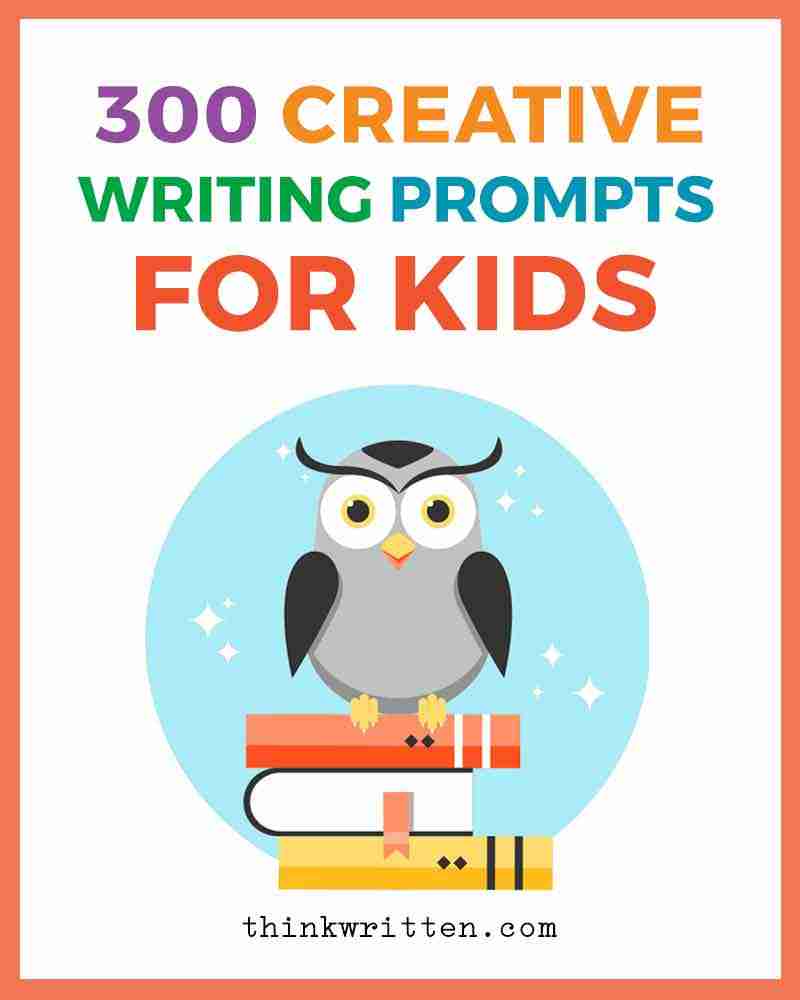
These are perfect to use as kids journal writing prompts, as short story writing prompts, or just for exercises to help students and children of all ages tap into their creativity. Maybe your kids will write an essay, maybe a poem, or maybe even a whole book!
Whether you are a teacher or parent looking to inspire your kids to write, or maybe even an adult who would like to practice writing with a more playful and young-hearted approach, I hope you find these creative writing prompts inspiring!
Buy the Printable Cards! We will always have this list of 300 kids writing prompts available for free, but I’m very excited to now also offer an ad-free printable version of these prompts in my online Etsy shop. Thank you for your support!

The Ultimate List of 300 Fun & Creative Writing Prompts for Kids
#1. Imagine a giant box is delivered to your front doorstep with your name on it. What’s inside and what happens when you open it?
#2. Write a short story about what it might be like if you woke up one morning with a mermaid tail.
#3. Which is better, winter or summer? Write about the reasons why you think winter or summer is better.
#4. Write about what would it be like if you had an alligator as a pet.
#5. If you had $1,000, what would you buy and why?
#6. Write a story using these 5 words: apple, train, elephant, paper, banjo
#7. What do you want be when you grow up and why?
#8. Who is your favorite person on the planet? What do you like most about that person?
#9. If you could have any secret super power, what would you want it to be and why?
#10. Write about 3 places you would like to travel someday. What do these three places have in common?
#11. Write about a time you felt really happy. What happened? What made you feel happy?
#12. Imagine what would happen if someone shrunk you down to be only 1″ tall. How would your life change?
#13. If you were in charge of the whole world, what would you do to make the world a happier place?
#14. Write a story about what it would be like to climb to the very top of the highest mountain in the world.
#15. If you were in charge of planning the school lunch menu, what foods would you serve each day?
#16. What are some of your favorite animals? What do you like about them?
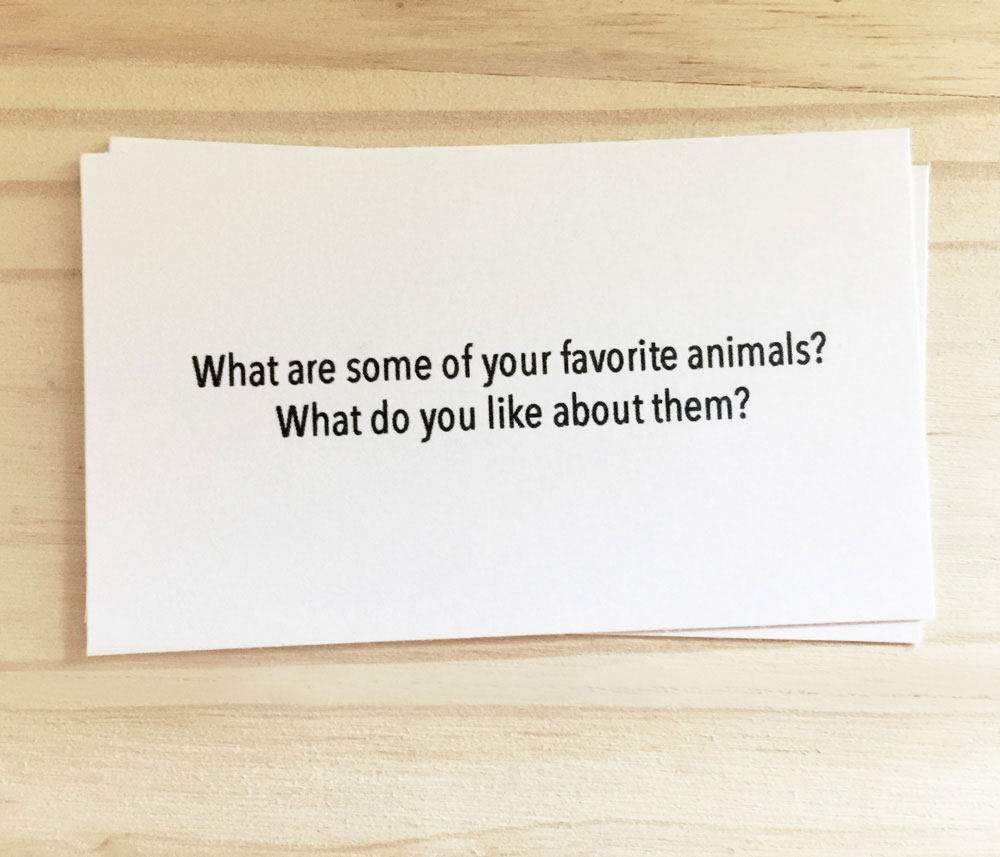
#17. Imagine that dogs take over the world. What do they make the humans do?
#18. Write a story about flying to outer space and discovering a new planet.
#19. You are a mad scientist and have invented a new vegetable. What is it called? What does it look like? What does it taste like? Most importantly: Is it safe to eat?
#20. You go to school one morning to discover your best friend has been turned into a frog by an evil witch! How do you help your friend?
#21. Describe what it is like when trees lose all of their leaves in the autumn season.
#22. Write about your favorite sport and why you like it so much.
#23. Imagine what it might be like to live on a boat all the time and write about it.
#24. If you had one wish, what would it be?
#25. Write about what you might do if you have the super power to become invisible.
#26. You are walking through the forest when one of the trees starts talking to you. What does it say? What do you do?
#27. The weather forecast is calling for a blizzard in the middle of the summer. What do you do?
#28. What types of transportation will people have in the future?
#29. What were some of your favorite toys when you very little? Do you still enjoy playing with them?
#30. What would a day in your life be like if you were a movie star?
#31. Imagine you’ve invented a time machine! What year do you travel to?
#32. What are your favorite things to do over summer vacation?
#33. What is your favorite holiday and why?
#34. If you could meet any fictional character from a book, who would it be?
#35. You are writing a travel guide for kids visiting your city. What places do you think they should visit?
#36. What is a food you hate? Write about it!
#37. Imagine what it would be like if there was no electricity. What would be different in your daily routine?
#38. You are building a new city! What types of things do you think your city needs? How will you convince people to move to your new city?
#39. What is your favorite movie? Write your review of the movie and why you think people should watch it.

#40. Imagine you get a magic sweater for your birthday. What happens when you wear the sweater? What do you do with these new found magical powers?
#41. You are the security guard at the zoo and someone has stolen a rhinoceros! How do you track down the thief?
#42. You have been invited to have lunch with the queen. What foods do you eat and what topics do you and the queen discuss?
#43. If you could design a school uniform, what types of clothes would you suggest? What colors would they be?
#44. Imagine you are a reporter interviewing a celebrity about their life. What questions do you ask?
#45. You are running a lemonade stand. Describe the steps for how you make lemonade and the types of customers you see during the day.
#46. Write a story about being the ruler of an underwater world.
#47. Write an acrostic poem for the word “treehouse”.
#48. You decide to grow a sunflower, but the sunflower grows so tall it reaches up to the sky! Write about what happens when you decide to climb to the top. What do you discover?
#49. Imagine you look out the window and it is raining popsicles from the sky! Write a story about the experience.
#50. If you could be any animal, which one would you be and why?
#51. If you were on a spaceship, what would you be most excited about seeing?
#52. Do you have any pets at home? Write an essay about how you take care of your pets. If you do not have a pet, what type of pet might you like?

#53. Imagine you are opening a store that only sells items which are blue. What types of items do you sell?
#54. Have you ever lost something that is important to you? Were you able to find it?
#55. Write a story about a kid who is moving to a new school. How do you think they might feel?
#56. Rewrite the ending of your favorite fairy tale. For example, what would have happened if Cinderella never went to the ball?
#57. Have you ever forgotten to do your homework? What happened?
#58. Do you have a favorite song? Write about the type of music you like to listen to.
#59. Imagine your parents wake you up one morning to tell you they will take you to do anything you want to do for the whole day – you don’t even have to go to school or do your chores. What would you choose to do and why?
#60. Do you like amusement parks? What are some of your favorite rides?
#61. Write a story using these three words: detective, piano, and pizza.
#62. Have you ever been to the beach? Write about your favorite things to do. If you have never been to the beach, what would you like to do the first time you visit?
#63. Is there a favorite tv show you like to watch? Write about your favorite character and why they are your favorite.
#64. Write a poem using onomatopoeia , where the words you use are pronounced similar to the sound they make. For example, buzz, bark, sizzle, slam and pop.
#65. Have you ever had to stand in line to wait a long time for something? What did you do while you waited? How did you feel while waiting? How did you feel once the wait was over?
#66. Is it a good idea to keep ALL secrets a secret? Write about examples of when it is okay to spill a secret – and when it isn’t.
#67. Is there something you are good at doing? Write about your best strengths.
#68. What historical time period and location would you go back to live in if you could? Write about it!
#69. Write about 5 things you can do that are important for you to stay healthy and safe.
#70. Do you think thunderstorms are scary? Why or why not?
#71. What would you most like to learn over the next year? Think about things that interest you or questions you might have about the world and make a list!
#72. You are going on a trip to a jungle safari! What items do you pack in your suitcase?

#73. Imagine you are sitting at home one day and you hear someone shrieking in the living room they see a mouse in the house! Write a story about what might happen next.
#74. You are writing a letter to someone who is having a hard time making new friends at school. What do you write? What advice do you give them?
#75. Imagine you just met a magician – but their beloved rabbit who they pull out of a hat for all the tricks has been kidnapped! How do you help find the rabbit?
#76. Do you hear what I hear? Set a timer for 5 minutes and write about all of the sounds you hear in those 5 minutes.
#77. Imagine you go to get a haircut and they accidentally shave your head! How do you feel about that and what would you do?
#78. Do you find it easy to talk to people you don’t know? What are some ways you can start up a conversation with someone you have never met before?
#79. Are there any chores you have to do at home? What are they? What do you like – and not like – about each one?
#80. Open up a random book to any page. Write for 5 minutes about the first word you read.
#81. Pretend you are a writer for your city’s newspaper. Who would you like to interview for a news story and why?
#82. There are many fictional characters who live in unusual houses, such as the old woman who lived in a shoe. What kind of unusual house would you like to live in? Write about what it would be like to live in an unusual house!
#83. Write a list of 10 things you can do to practice kindness to others.
#84. Is there a homework subject you dread? Why do you not like getting homework in that subject?
#85. What is your favorite month of the year? Write about why you like it and some of your favorite things to do during that month.
#86. Imagine you are planning a surprise birthday party for someone. How do you keep it a surprise?
#87. Pretend you walked outside to find a sleeping dragon in the grass! Why is the dragon there? Is it a friendly dragon? What do you do? Write about it!
#88. What are you grateful for today and why?
#89. You were on your way to a very important event when you fell into a puddle. Now what?
#90. Have you ever watched a movie and didn’t like how it ended? Write what you think should happen instead.
#91. Can you answer this riddle from Alice in Wonderland ? How is a raven like a writing desk?
#92. Imagine you are the captain of a pirate ship. Write a diary entry for what your day was like.
#93. If you could start any type of business, what kind of business would you start? What types of products or services would you provide?
#94. Write a sequel to one of your favorite fairy tales. For example, what was Goldilocks’s next adventure after she left the bears?
#95. What is something you are afraid of? What helps you to feel less afraid of something? What would you say to a friend who feels scared to help them feel less afraid?
#96. Write a letter to your future self in 20 years.

#97. In addition to basic survival needs such as food, water, air and shelter, what are 3 things you would you need to be happy?
#98. If you could invent a robot of any type who could do anything you imagine, what types of things would you would have the robot to do?
#99. Which do like better? Apples or Oranges? How are they alike? How are they different?
#100. Why did the chicken cross the road? You are a detective and are assigned to the case. How do solve the mystery?
#101. Write instructions for how to make your favorite snack. Be sure you add your favorite tips and suggestions for how to select the best ingredients!
#102. Imagine you borrowed a friend’s favorite lucky pencil to help you pass a math test – but then it snapped in half! How will you ever tell the news to your friend?
#103. Look around the current room you are sitting in and choose 3 random objects that are nearby. Now write a story or poem that includes those three items!
#104. Write a letter to the author of a book you recently read and tell them what you liked most about the book.
#105. Ernest Hemingway is famous for writing a six word story. Can you write a story in just 6 words?
#106. What do you think will be the future for cell phones? Will people still use them in 25 years or will something else take its place?
#107. Do you want to go to college? Why or why not?
#108. Write a story or poem about a kitten who wanders off and gets lost. How does the kitten find its way home?
#109. Currently, it is required by law that kids go to school. Do you think this is a good or bad idea?
#110. If you could invent a new board game, what would it be called? How is it played? What are the rules? What makes it fun to play? Write about it!
#111. Imagine you come home to discover your entire bedroom is covered in ketchup! What on earth happened? What is your reaction? How do you clean everything up?
#112. What is something you learned today?
#113. Would you rather have a goldfish or shark as a pet?
#114. From A-Z: make a list of something for every letter of the alphabet.
#115. Have you ever gone fishing? If you have, did you like it? Why or why not? If you haven’t, do you think you might want to?
#116. What is one of the most important things you do each and every day?
#117. Write a story about Gretchen the Grouch, a girl who is always angry! Will she ever be happy? Why is she so grumpy all of the time?
#118. How do you feel when someone takes something of yours without asking? What is a good way to deal with it when that happens?
#119. Write a poem that starts with the word “if”.
#120. Write a story about a family of rabbits who live in the woods. What are some of the challenges they face?
#121. What clothes do you think are the most comfortable? What kind of clothes do you like to wear the most? What clothes do you NOT like to wear?
#122. Imagine there are no grocery stores and you must get your own food. What are some of the ways you find food? What types of things do you eat?
#123. What are 3 things you can do that are good for the environment?
#124. If you could meet any famous person today, who would you want to meet and why? What questions might you ask them?
#125. A tongue twister is a quick poem where many of the words start with the same letter and are similar in sound. For example, “Peter picked a peck of pickled peppers.” Try writing your own with this fun kids writing prompt!
#126. What is the first thing you think of when you hear or see the word green?
#127. A hero is someone who is admired for their courage and achievements. What do you think makes someone a hero? Who are some of your heroes?
#128. What did you do during summer vacation last year? What do you want to do for summer vacation this year?
#129. Write a story about a super hero dog who saves the day! Who does the dog help and why?
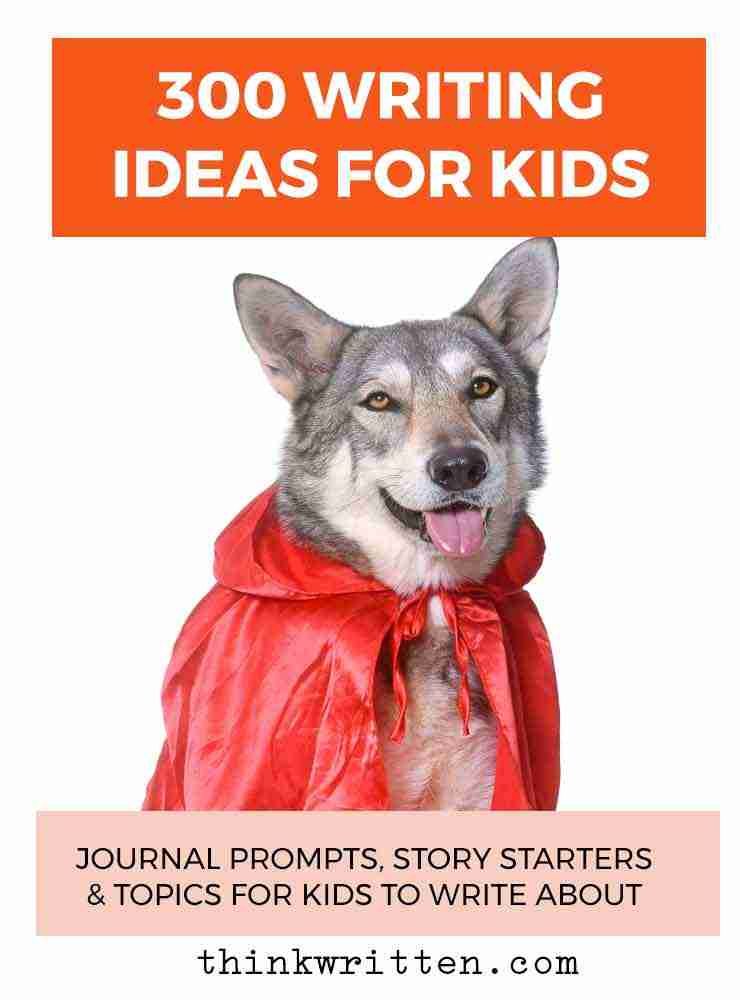
#130. Would you rather live somewhere that is always cold, or somewhere that is always hot? Write about which one you would rather choose.
#131. Have you ever volunteered to help a charity? If so, write about the experience! If not, what are some charities you think you might like to volunteer for?
#132. What does the word courage mean to you?
#133. What makes you unique? What are some things about you that make you an individual?
#134. Have you ever been to a museum? What is your favorite thing to look at on display?
#135. What can you do to set a good example for others to be kind?
#136. A Tall Tale is a story that exaggerates something that actually happened. Write a tall tale about something that recently happened to you.
#137. What is one of your favorite toys that you think you might still want to have and play with when you are 22 years old?
#138. Oh no! Everyone around you is sick with a nasty cold! Write a silly poem about how you try to avoid catching their germs!
#139. Personification is when a non-living object takes on human characteristics. Write a story where you personify a common electronic gadget in your house, such as the Television or toaster.
#140. Write a poem using similes, which is when you say an object is like something else. Here is an example of a simile: “Her eyes were as blue as the sky.”
#141. Have you ever read a book written by Dr. Suess? Write your own “Suess-style” story, complete with rhymes and made up words.
#142. Do you have any siblings? Think about what it might mean to be a good brother or sister and write about it!
#143. Make a list of questions to interview your parents or grandparents about what it was like when they were growing up as a kid. Then, ask them the questions and write about their answers!
#144. You are in charge of writing a new radio show just for kids! What topics will you talk about? What music do you play?
#145. What do you usually eat for breakfast every day? What, in your opinion, is the greatest breakfast food ever created? What makes it so great?
#146. Write a 12 line poem where every line is about a different month of the year.
#147. What is something you look forward to doing the most when you are an adult?
Use these prompts in your classroom! Get the ad-free printable version of these prompts to inspire your students to write! Thank you for your support!
#148. Do you like to try new things? What is something new you have tried recently or would like to try?
#149. Imagine what it might be like to be alive in Egypt when the pyramids were built. Write about what it was like.
#150. A credo is a statement of personal beliefs. Try writing your own credo for things that you believe in and feel are important.
#151. The circus has come to town but they have no place to perform! How do you help the ringmaster find a place to put on a show?

#152. Do you like to act? What are some of your favorite actors or actresses? What do you think makes someone a good actor or actress?
#153. “Practice makes perfect” is a popular saying. What is something you like to practice so you can become better at it? A sport? A musical instrument? A special skill? Do you like to practice?
#154. Write about what it might be like to be water drops freezing and turning into ice.
#155. Do you think it is important to keep your room clean? What do you like about having a clean room?
#156. Imagine your parents are sending you away for a two week summer camp trip. Would you be excited? Why or why not?
#157. What are you currently learning about in history class? Write a fictional story about someone from the past you are learning about.
#158. Many wars have been fought in the past. Instead of going to war, what do you think countries could do to resolve their differences peacefully?
#159. Every year over 8 billion plastic bottles and cans are thrown away. What are some things you can do to help encourage your family and friends to recycle?
#160. Imagine if you were the principal of the school. What might you do differently? What things would you do that are the same? Write about it!
#161. Pretend that one day you are at your neighbor’s house and you notice a strange noise coming from the basement. You go downstairs to investigate to see a large machine running with many lights and buttons. Why is it there?
#162. Write an essay that starts with the line, “Tomorrow, I hope…”
#163. If you could give one thing to every child in the world, what would you want to give them?
#164. Do you have a piggy bank at home? How do you earn money to add to your savings?

#165. What qualities make a house a home? What are 3 things you think every house should have?
#166. Would you rather go scuba diving or rock climbing? Write about which one you think you would like to do more and why.
#167. Do you think it is a good idea for kids to write a daily journal? What are some of the benefits of writing every day?
#168. Do you like watching fireworks or are they too noisy? Write about a time when you saw fireworks in the sky.
#169. Oh no! Your friend has turned into a statue! How did this happen? What do you do? Does your friend ever turn back into a person again?
#170. If you could be any movie character, who would you be and why?
#171. A mysterious message appears in code on your computer screen. What could it mean?
#172. If you could go to work with one of your parents for a day, what do you think the day would be like? What types of things do your parents do at work all day long?
#173. Imagine you are the President and you are creating a new national holiday. What is your holiday about? How is it celebrated? What day of the year do you celebrate? Write about it!
#174. You won a never-ending lifetime supply of spaghetti noodles! What will you do with all of these noodles?
#175. Would you rather be a bunny rabbit or a hawk? Why did you choose the one you chose?
#176. Your teacher has been acting mysterious lately. After school one day, you notice a weird green light shining through underneath the door of your classroom. What do you do? What is happening with your teacher?
#177. Write an article about tips for how kids can be more organized and study well for tests.
#178. Look at any product in your house and read the ingredients labels. Research what each ingredient is. Do you think these ingredients are good or bad for people?
#179. If you were a doctor, what do you think would be the most important part of your job every day?
#180. The school librarian needs your help! A truck just arrived with 2,000 books and she can’t fit all the books onto the shelves! What do you do? How do you find a place to put all these books?
#181. Do you think it would be fun to plant a garden? What types of plants would you want to grow? Write about your garden ideas.
#182. What is a sport or activity you would like to try playing for the first time?
#183. Do you think kids should be allowed to do the same things as adults? What things do you think kids should be able to do that only grown-ups can?
#184. Imagine you and your parents switch places for a day. Your parents are the kids and you are now in charge! What would you do?
#185. Write a get-well letter to someone who has been sick. What can you say to make them feel better?
#186. If you could visit any planet in the solar system, which planet would you like to visit the most and why? Write about what it might be like.
#187. Have you ever been to a farm? What did you like about it? If you haven’t been to a farm, do you think you might like to visit one? Why or why not?
#188. The mayor of the city has a big problem and needs your help! What is the problem and how will you solve it?
#189. Pretend your little sister ate carrots for dinner and the next morning woke up with rabbit ears! How did this happen? What do you do? Will she be a rabbit forever?
#190. Imagine you wake up in the morning to find out you get to relive any day of your life again for the whole day. What day would you want to experience again and why?
#191. Do you think you might like to be a firefighter? Why or why not?

#192. You are a lawyer and your client has been accused of stealing a car. How do you convince the jury your client is innocent?
#193. Think of the four elements: fire, air, earth, and water. Which of these four elements do you like the best?
#194. What would you do if you could be invisible for a whole day? Do you think you would enjoy it or be glad to be back to normal the next day? Write about it!
#195. Imagine you are a meteorologist and people are starting to get angry that your weather predictions are always wrong. What do you do?
#196. If you could create any law, what would it be? Why do you think the law is an important one to have?
#197. You are going incognito and need to hide to your identity so you aren’t recognized or discovered while you walk through the city. What type of disguise do you wear?
#198. Write a persuasive letter to your parents explaining why you should get a new pet. Make sure you provide a convincing argument they won’t be able to refuse!
#199. Your friend wants to do something dangerous. What should you do?
#200. How do you think the world would be different if there were no oceans?
#201. What do you do when someone disagrees with your opinions? Is there a better way to handle conflicting opinions?
#202. What do you think you as a kid could do to help encourage more people to read?
#203. Do you have a good luck charm? What makes this item lucky? When do you use it? How do you use it?
#204. What is at the end of a rainbow? Imagine you follow a rainbow to the end. What do you discover? Is it a pot of gold, or something else?
Use these prompts in your classroom! Get the ad-free printable version of these prompts to inspire your students to write! Thank you for your support!
#205. What do you think the consequences should be for someone who is caught cheating on a test at school?
#206. Imagine you are riding your bike one day when you encounter an older kid who wants to steal your bike. What do you do?
#207. You are the lead singer and star of a famous rock and roll band, but there is one problem – your drummer is jealous of your fame! How do you solve this situation?
#208. If you could help a group of kids in any part of the world, what kids would you want to help the most and why? What are some things you think would help these kids?
#209. Everyone knows the house on the end of the street is haunted. What are some of the strange things that happen there? Why is the house haunted?
#210. You notice at school one day there is a door to a secret passage next to the janitor’s closet and decide to explore. Where does it lead? Why is it there? Do you go alone or bring a friend along?
#211. A bucket list is a list of things you want to accomplish in your lifetime. What are 5 things on your bucket list?
#212. Imagine the perfect treehouse or clubhouse for you and all of your friends as a place to hang out. Describe what it is like inside.
#213. Do you get bored easily? Make a list of things you can do whenever you feel like you are bored and there is nothing fun to do!
#214. Now vs. Then: Think about how today is different from one year ago. How have you changed? What things in your life are different?
#215. Write your autobiography about your life.
#216. It’s a heat wave! What do you do when the weather is hot? What are some of your favorite ways to stay cool?
#217. What are three important safety tips every kid should know to stay safe?
#218. What genre of books do you like to read the most? Write about the characteristics of the genre and list some of your favorite books as examples.
#219. Holiday Traditions: How does your family celebrate the different holidays and events? What are some traditions you do each and every year?
#220. Imagine one day in science class a science experiment goes terribly wrong and now you and all of your classmates have superpowers! What are your superpowers and what do you do with them?

#221. Who is favorite teacher? Why are they your favorite?
#222. You are baking a cake, but you accidentally put salt in the cake instead of sugar. Nobody will eat it! How do you feel? What will you do next time?
#223. Do you think it is important to have good table manners? What do you think some good manners to practice might be?
#224. Many schools no longer teach cursive handwriting. Do you think this is a good or bad thing? Do you know how to write cursive handwriting? Would you like to learn if you haven’t?
#225. If you were the owner of a theme park, what types of rides and attractions would have? Describe what they would be like and why people would want to visit your park.
#226. Your parents give you $100 to spend at the grocery store. What do you buy and why?
#227. Some people who are alive today grew up without computers or video games. What would you do if you didn’t have a computer or video games? How would life be different?
#228. You walk into your living room and discover there is a giant elephant standing there. How did the elephant get there? What do you do about it? How do you explain the elephant in the living room to your parents?
#229. Have you ever had a weird dream? What happened in the dream? What do you think it means?
#230. Do you like to draw or paint? Write a story inspired by a painting, doodle, or sketch.
#231. You are being sent on a mission to outer space to live in a space station for 5 years. What supplies do you pack and why?
#232. What is the scariest creature alive on earth? Describe in detail what makes it so horrifying.
#233. What do you think your pet might say if they could talk to you?
#234. Imagine your school is putting on a talent show. What act will you perform? What other acts will be in the show?
#235. If you could breathe under water, what would you do?
#236. What time of day do you think school should start? Write a convincing argument on why or why not the time of day school starts should change.
#237. If you were to start your own YouTube video channel, what would the videos on your channel be about?
#238. Do you like to cook? What are some things you like to make and eat?
#239. Your school is having a field day and you are in charge of planning the activities and games. What types of activities and games would you plan for the event?
#240. If you had a remote control drone that takes video of everything it sees from the sky and you could take it anywhere, what would you film? For example, the inside of a volcano or soar it over the plains of Africa.
#241. The Bermuda Triangle is an area of the ocean where many ships and planes have gone missing. Why do you think this could be? Write a story about what it might be like to travel there.
#242. There are 7 great wonders of the world – which one do you think is the most wonderful?
#243. If you could speak any foreign language fluently, which one would you like to speak and why?
#244. You are inventing a new flavor of ice cream! What is the new flavor called and what ingredients do you need to make it?
#245. Would you rather go to a baseball game or read a good book? What reasons do you have for your choice?
#246. You walk outside to get your mail and your mailbox starts talking to you! What does your mailbox have to say?
#247. Imagine you are a famous person. What are you most famous for? What is it like to be famous?
#248. What do you think would be the most fun job in the world to have? Give examples of why you think it would be a fun job to have.
#249. Write a poem about an object that is shiny and dazzling.
#250. Do you like to watch the Olympics? Why or why not? If yes, what is your favorite Olympic sport?
#251. What kind of car do you want to drive when you are older? Do you think learning to drive will be easy or hard?
#252. What do you think would make for a great gift to give someone on their birthday?
#253. Describe a time when you needed help and someone helped you. What did they help you with and how did it make you feel?
#254. If you could be any type of fruit or vegetable, what would you be and why?
Love these prompts? Get the ad-free printable version of these prompts to use at home or in the classroom!
#255. Do you think it is more important to have a good imagination or have all the facts proven?
#256. Do you have a favorite aunt, uncle, or another relative? Write a story about their life and why you like to be with them.
#257. Think of a time you laughed really, really hard. What was so funny? Why were you laughing? Write about it!
#258. Write a poem about an emotion. For example: happy, sad, angry, embarrassed, guilty.
#259. Do you ever have a hard time falling asleep? What are some things that help you feel sleepy?
#260. If you could drive a car, where would you drive and why?
#261. Imagine you are trading places with your friend for a day. What will it be like to be at their house? What will your friend think while they are at your house? Write about it!
#262. If you could break a world record, what would it be? What do you think would be necessary to be able to break the world record?
#263. Imagine you live in Colonial times. What would it be like to grow up as a kid in Colonial America?
#264. You are building a new city. What is the name of your city? What is the weather like? What buildings will you build?
#265. What do you think it would be like to work as a sailor on big ship in the ocean each day?

#266. Imagine you are the teacher for the day. What types of activities do you make the students in the class do?
#267. How would you feel if your parents told you that you would be getting a new baby brother or sister? Write about it!
#268. Do you know any good jokes? What are some of your favorite jokes? What makes them funny? Do you think you could write your own?
#269. Imagine you are floating down a river on a raft. What types of things can you see from the river that you normally wouldn’t see from the land?
#270. You want to start a new hobby collecting something. What kinds of things would you collect and why?
#271. Your mom announces she is having a yard sale. Would you let her sell any of your things? Why or why not?
#272. Imagine you walk out your front door one morning and it is raining popcorn! What do you do?
#273. You are camping in the woods one night and hear a scary noise. What do you do? What might be the cause?
#274. What do you think might make kids really happy to go to school? What are some things you think schools should do so that it could be more fun?
#275. Today’s lunch at the cafeteria was unusually horrible. You are a detective on the case to investigate. What do you think is the cause?
#276. If you had a tree that grows money, what would you do?
#277. What would you do if you had a unicorn as a pet?
#278. Would you rather go to the zoo or go to the aviary? Which one would you pick and why?
#279. What are some safety tips you should follow when riding a bike?
#280. You are designing the cover of a magazine. What are some of the headlines on the cover?
#281. Are you afraid of the dark? Why or why not?
#282. If you could learn to play any type of musical instrument, which one would you like to learn how to play and why?
#283. Imagine you are playing a sport that involves a ball, such as soccer, baseball or kickball. What would it be like if the ball could talk?
#284. You come home to discover a friendly alien has been living in your closet. What do you do? Why is there an alien in your closet?
#285. Is there something you are afraid of that you wish you weren’t afraid of? Write about it.
#286. Write about the best party you’ve ever been to. What made the day fun and special?
#287. What makes you feel loved and cared about? What are some ways people can show you that they love and care about you?
#288. There is a kite flying competition coming up and you are going to design your own kite. What will your kite look like? What colors will it be? Will it have any certain shape?
#289. You are given the challenge to drop an egg on the floor – without it breaking! What are some things you might try to make sure the egg won’t break?
#290. What are some of the things you can do every day to stay healthy?
#291. Do you think grown-ups are boring? Why do you think they are so boring all of the time? What is something fun that boring grown-ups could do instead of being so boring?
#292. Write a lyrical poem or song about what kids do while they are at school all day long.
#293. What are the first things you like to do when you are done with school each day? What are some of the activities you like when you are not at school?
#294. Imagine dinosaurs were still alive today. How do you think our lives would be different?
#295. Would you rather visit a volcano or a desert? Which one would you choose and why?
#296. Is there a sound you think is annoying? What types of sounds drive you crazy? Write about them!
#297. What do you think it would be like to be the size of an ant for a day? What types of things would you do?

#298. Imagine one of your stuffed animals comes to life and starts talking to you. What types of things will you talk about? What will you do?
#299. What makes you feel happiest? Write about the things in life that make you feel happy!
#300. Imagine there is no gravity. What kind of things would you do you for fun? How would some of the things you already do for fun be different?
Buy the Printable Cards! We will always have this list of 300 kids writing prompts available for free, but I’m very excited to now also offer an ad-free printable version of these prompts in my online Etsy shop. Thank you for your support!
Parents and teachers, I hope you enjoyed these 300 writing prompts for kids and that you will use them to inspire your children’s creative imaginations.
These prompts of course can be used in a number of different ways and can be adapted for a variety of different styles of writing !
What do you think? Do you think these are good conversation and story starters for kids? Do you have any ideas for writing prompts you would like to share?
And of course, if you’d like to make it super fun and easy to use these prompts at home or in your classroom, be sure to get our ad-free printable version of these kids writing prompt cards now available in my Etsy shop.
We’d love to hear your thoughts on different creative writing ideas and topics for kids to write about! Share your thoughts in the comments below!
Chelle Stein wrote her first embarrassingly bad novel at the age of 14 and hasn't stopped writing since. As the founder of ThinkWritten, she enjoys encouraging writers and creatives of all types.
Similar Posts

108 Romance Writing Prompts & Love Story Ideas

42 Fantasy Writing Prompts & Plot Ideas
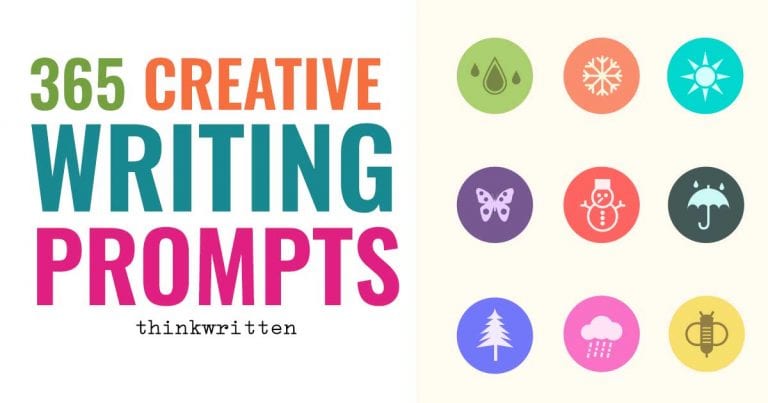
365 Creative Writing Prompts
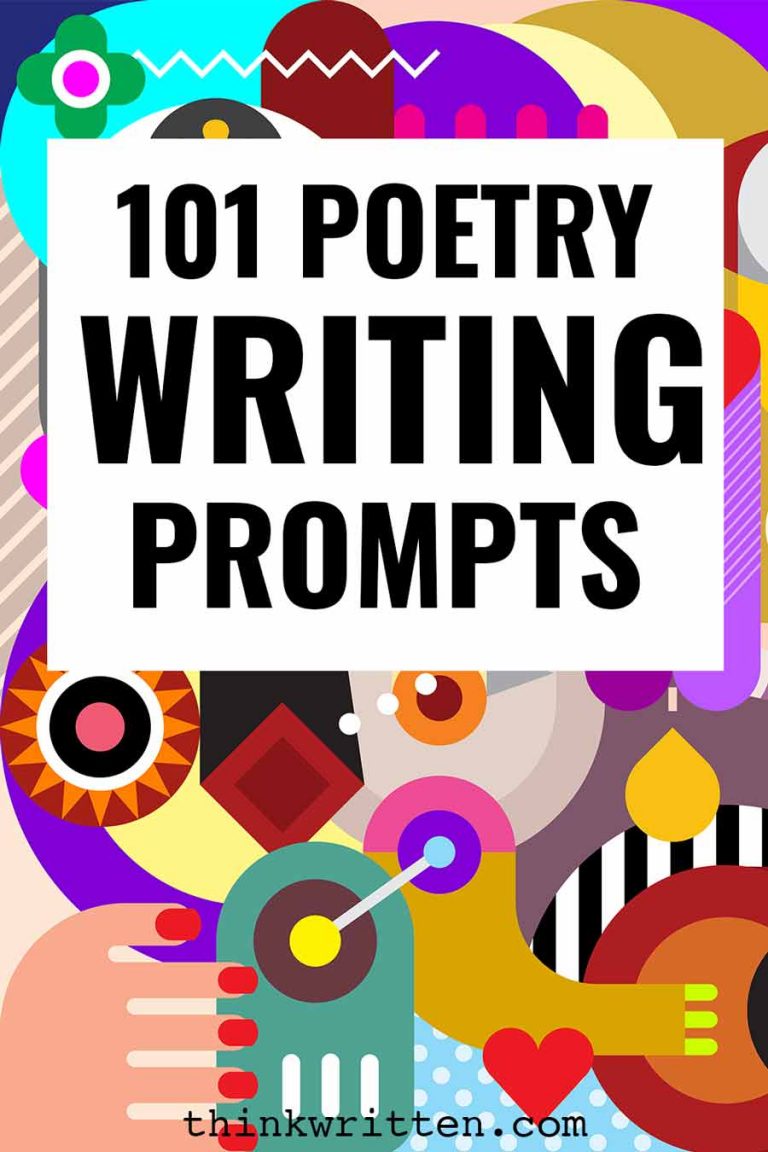
101 Poetry Prompts & Ideas for Writing Poems

7 Creative Writing Exercises For Writers
48 comments.
These are awesome! I feel like answering the questions myself! Thanks a million!
Thanks! Glad you enjoyed them! 🙂
Lovely and amazing help
I wrote all 300! but my fingers hurt badly now. :l But i got to admit these are exellent questions!
Hi. Thanks for this list. So many great ideas. I will definitely use some of them for my Language Arts class.
hi people THIS WAS SO LONG but so worth it for my class thx mate
This was great for homework
Thank you for the topics. It was really helpful
Your writing prompts are awesome
These are amazing! Thank you so much for sharing. I will definitely be using it with my kids.
Thank you! I hope they enjoy the writing prompts!
I love these, they are awesome and very helpful too. Thank you very much.
these questions hooked me on easily thanks your the best!
They are all good prompts
This is always good and improves the brain.
These are very useful and very enjoyable topics, i enjoy by giving these to my students , their creations are marvelous
It’s was very long but worth it
This is good. I love it. It helps me in my studies. I share it with my friends children that likes the writing. We love it. Please, think of another writing.
Thanks! Worth printing and providing for my middle school students as a first week of the year activity. Must have taken you ages to come up with all 300 of these!
I’m glad to hear you can use them for your students! It did take some time, but it’s well worth it knowing it might inspire kids to write! 🙂
You need a printable version of this!!
Hi Katelyn, we have one! https://gumroad.com/UBnsO Hope you enjoy!
The link doesn’t seem to be working for me… Could you send me a copy of the list, please?
Hi Tori, the printable version of this post is available as an ad-free paid upgrade – you can purchase it through my Gumroad store: https://gum.co/UBnsO
I quite liked your ideas, I’ll try a few, surely!
How long did it take for you guys to make 300 ideas?
Definitely took some time Vilenti, but it was definitely worth writing all of them! Our prompts reach over a million people a year and are used in literacy, poverty, and mental health programs worldwide. 🙂
These were awesome, thanks a TON
i have school work and this is one thing i do.
i do this for school work to
i do this for school work
Hello Chelle, thanks a lot for this. During these tough Covid times, I find your list to be a great idea to engage kids. Have got them started on some today. Hopefully this will be a long term engagement for them.
The prompts are grrrreat
This was really helpful i have looked for a lot of these, that have a lot of topics and only found one other good one and finished it all, i got to 17 and was like are they all this good! And they all are so thanks!
Glad you enjoyed them!
These are awesome
These are amazing! Thank you so much for sharing.
I loved looking at these prompts!! They were very helpful. I am loving writing and supporting my claims with these prompts. You should post more ideas!! Thanks for sharing the prompts.
Do you have any more?
This really was think written
I’d like to use a few of your questions in a journal for adults that I am creating for sale. I will absolutely credit you at the beginning of the book. Is that okay with you or not? I don’t want to infringe on any copyright laws. I think I used about ten of them.
Hi Kristen, you cannot use these prompts for products for sale, that would definitely be an infringement on copyright. These prompts can only be used for non-commercial use.
this is the greatest app ever
I like all the questions
thank you for all the ideas they are so good
OMG These are all very good and many questions i like all these Thankyou soooooooooooo much for these
I’m in class doing this and it is so fun yes every body is doing this
I LOVE these! My daughter and I stumbled across a post full of fun writing prompts on another website but they were more geared for adults. This list is HUGE and perfect for us to tackle together. Thank you! ❤️
Leave a Reply Cancel reply
Your email address will not be published. Required fields are marked *
Save my name, email, and website in this browser for the next time I comment.
11 Plus creative writing tips and examples

Preparing for your 11 Plus creative writing exam doesn’t have to be a worry. We help you here with 11 Plus creative writing tips and examples to prepare you for the exam. We're here to help you practice and improve your writing techniques and creative writing skills so you’re ready for your 11 Plus exams .
Creative writing can be really fun – you can explore something you really want to and write about something that means a lot to you. Although, we know it can be a little bit worrying for some students that don’t enjoy writing as much or don’t feel confident in their writing skills.
So, ahead of your 11 Plus exams we want to help you prepare with these 11 Plus creative writing tips and strategies.
What Is 11 Plus Creative Writing?
The 11 Plus creative writing exam assesses a child’s ability to compose structured and engaging pieces of written work. It’s designed to evaluate a student’s fluency, imaginative capabilities, grammar, punctuation and overall ability to write creatively.
What does the 11 Plus creative writing exam include?
The 11 Plus creative writing exam is usually 25-30 minutes and could involve the continuation of a storyline that you’ll be provided with. Alternatively you might be asked to write a short piece of your own in response to a visual stimulus – this could be describing a character or writing something from their perspective, like a diary entry.
Here are some the potential writing tasks you could be given for your 11 Plus creative writing exam:
Descriptive task – continuing on a short story that you’ll be provided with, or describing a place or situation that your character finds themselves in.
Persuasive task – you could be asked to write a letter or an article with the goal to persuade the reader to feel or act in a certain way after reading it by using emotive language.
Narrative task – this would usually involve writing your own short story.
Expository task – this could involve writing an article or set of instructions designed to inform the reader how to go about doing something properly.
What are the 11 Plus creative writing topics?
Prior to starting your creative writing piece, you’ll need to have a topic. It’s important that the topic remains at the centre of everything you’re writing, as it will shape the direction of the story and the characters
You can think of a topic as a theme for your story. This can be really simple, as a simple theme will really help write a story in your own way.
For your 11 plus creative writing exam, you’ll likely be presented with a topic that you then have to write about. Often these topics will have you writing about:
Being lost or scared, capturing the feeling of being alone and writing a story about overcoming it.
Doing something exciting or achieving something impressive, the best day of your life so far.
A holiday or an adventure
Travelling to the city or countryside and what you might experience there.
Writing a short story on each of the topics above can be a great way to familiarise yourself with creative writing.
What do examiners look for in creative writing?
Successfully passing your creative writing 11 Plus creative writing exam is a lot less daunting if you know what the examiners are looking for in your creative writing.
Unlike other exams, it can be difficult to prepare the exact answers. It’s not like a sum in maths, where there’s only one correct answer after your working out. That doesn’t mean there aren’t specific things that examiners are looking for. Let’s take a look at those:
A well planned piece of writing
Strong creativity and good imagination
A fluent writing style
Good and correct use of punctuation
Good use of English grammar
Complex sentences that are broken in an easy-to-read way with commas
Good spelling
Good and exciting vocabulary
Neat, easy-to-read handwriting
You can use those things as a checklist for your creative writing. When you write practice pieces, read them back and see if you can check off everything on the list of things that examiners are looking for. This will not only highlight areas needing improvement but will also act as a confidence-building tool.
11 Plus creative writing marking scheme
Your creative writing task will be worth 50% of your English 11 plus exam paper. So, you’ll want to make sure you’re well prepared!
Part of preparing for the creative writing task is ensuring you know how the exam will be marked. Here’s what your examiner will look at when they mark your work:
The plot – you need to write a piece that’s got an engaging plot, but more importantly it needs to follow a strong beginning, middle and end structure. We’ll be getting more detail about that further on. Make sure you plan your story to ensure you have a well-structured and easy-to-follow plot.
Vocabulary – Make sure you’re using a wide range of adjectives, nouns and adverbs. Rather than describing everything the same way, come up with some other engaging ways to write something. Use a good amount of complex words that you normally wouldn’t use (and make sure you understand what they mean so you use them correctly).
Writing devices – no, your examiner isn’t looking at what pen you used to write the exam. Writing devices refer to things like metaphors, similes, tension building short sentences, alliteration and irony. Try sentences like “he was as fast as a runaway train,” for a simile example. See if you can write a few sentences that each use a different writing device to practice.
Grammar – now is a good time to start practising your grammar skills. Make sure you’re using commas correctly when you write long sentences, and that you format your character dialogue properly. There are a few common grammar mistakes that may catch you out, so keep practising.
Spelling – While avoiding spelling mistakes is good, to get great marks on your exams you’ll want to use complicated words and spell them correctly. It might be tempting to avoid complicated words if you’re not sure how to spell them but it’s actually not a bad idea to use one or two complicated words and spell them so they’re recognisable than to use no complicated words at all.
11 Plus creative writing tips and techniques
Every great writer has one thing in common – writing techniques! Everyone can develop their creative writing skills by practising these creative writing tasks.
Getting creative
If you want to write a story this should be your starting point! Have a good think about the topic for your story and the character you’ll be writing about. Take a minute to sit back, close your eyes and think about the world of your story. Can you see it?
If you can visualise the world of your story, then you’ve got a good idea to work with! Get creative about the story and think about directions that it can go, and the characters you can work with.
Planning and structure
Once you’ve got your theme in place you need to have a think about the direction of your story. Think about how your story starts, how you want it to end and then think about how you want your main character to get there.
Remember the classic story structure of beginning, middle and end:
Use the beginning of your story to introduce your character, where they are and maybe one of two of their friends. Maybe even try to set them a goal at this point, what’s something they really, really want?
Introduce the middle of your story with a problem or an obstacle for your main character to overcome. This is going to be the longest section of your story, so make sure you don’t spend too long with the opening! Think about how your character would overcome the problem you’ve introduced for them.
In the end your main character overcomes the problem that you introduced for them. Think about what they would feel, the relief they’d experience and how you can sum that up in a paragraph or two.
There are lots of different ways to write a story, but following the beginning, middle and end structure like this will really help you plan. Try to just write a few short sentences from the beginning, middle and end, then expand it out from there.
If you need more inspiration to improve your writing skills, why not see David Walliam’s top ten writing tips ?
Creative writing examples: using the senses
Remember – writing descriptively helps your ideas to really come across in what you’re writing. The person reading your creative writing piece can’t read your mind!
A great way to really set a scene in your creative writing is to use the senses:
Sight – what can your character see? Describe how the scene around them looks, and be sure to use some good adjectives.
Sound – can your character hear anything? Even if your character can’t hear anything, that can sometimes be a great way to set a scene. Or maybe your character can hear lots of noise? Either way, make sure the reader knows that.
Smell – what does the place your character’s in smell like? You can make a disgusting, murky bog seem even filthier by describing how smelly it is to the reader. We all react strongly to smells, good or bad, so make sure you’re describing them to your reader.
Touch – what can your character feel? Are they sitting on a really soft sofa? Is the cat they’re stroking extra fluffy? Describe everything your character feels!
Taste – is your character tasting anything? Of course, if your character’s eating you need to describe it. How sweet are the sweets they’re eating? How bitter is the medicine they had to take? You could even get creative and describe a smell so bad that your character can almost taste it!
Get creative when you write about senses. You don’t have to cover every sense in order, you can mix things up in a paragraph or two, and sometimes you only need to cover two or three senses in a particular scene. Make sure you’re always telling your audience what your character is experiencing so the reader can put themselves in your character’s shoes. Utilising this technique ensures the reader engages with your creative writing piece.
Fluent writing
Practice makes perfect when it comes to fluent writing. To practice fluent writing, set yourself a creative writing task as if you were taking your 11 Plus creative writing test.
Try keeping the stories short. Just a few paragraphs so you can do a few attempts. When you’re finished, read them back to yourself out loud. See if the sentences are easy to read out loud. If they’re not, it might be good to rewrite them in a way that makes them easier to say. Try doing this out loud too, rephrase the sentence so it means the same thing but is easier to say.
Reading out loud is not something you will be doing at the exam, so practicing your fluency at home is the key. Never be scared to do a few practice stories before your 11 Plus creative writing exam.
Proofreading Your Creative Writing
Finally, once you’ve finished writing and you’re happy with how fluent your piece sounds you’ve got to proofread it! That means checking your grammar, your punctuation and spelling.
Make sure you’ve only used capital letters where they need to be used – the start of sentences and the names of people and places.
Make sure you’ve used quotation marks correctly – start a new paragraph for when a character starts speaking, open with a quotation mark and then write what they said before closing with a quotation mark. Make sure you carry on writing after they’ve finished speaking with a new paragraph!
Have you checked the tenses? Make sure you’re not mixing up past, present and future tenses !
Have you used enough punctuation? Make sure all your sentences end with full stops, but also that questions end with a question mark. Space out long sentences with a well-placed comma and make sure if a character says something loudly or is surprised that you’re using exclamation marks.
Check your spelling! Are there any words you struggle with? Go back and check them to make sure they look right. If you’re really struggling to spell a word, maybe use a different one for your creative writing piece – lots of writers do this! If you do this a lot, then it might be worth doing some spelling practice.
How do I prepare for creative writing?
When it comes to 11 Plus creative writing exams it’s difficult to find something specific to revise – unlike exams in maths or English spelling, creative writing exams don’t have a right or wrong answer. So, don’t get overwhelmed by reading countless creative writing books.
The best way to prepare for a creative writing test is to practice all the key points we mentioned above. Set yourself some small creative writing tasks, practice your spelling and get some help fromyour teachers. You could also ask your parents or guardians about tuition to help you prepare for your creative writing .
We also have some creative writing book suggestions and worksheets that could help you prepare.
11 Plus creative writing examples books
If you’re looking for some books to help you prepare for your 11 Plus creative writing exam or want to find some creative writing examples, here are some of our favourites:
11+ Essentials Creative Writing Examples Book 1 (First Past the Post)
11+ Essentials Creative Writing Examples Book 2 (First Past the Post)
Bond 11+: English Focus on Writing: 9-11 years
RSL Creative Writing, Book 1: KS2, KS3, 11 Plus & 13 Plus – Workbook For Ages 9 Upwards
11+ Creative Writing
Remember to always ask a parent or guardian before buying anything online.
11 Plus creative writing tasks and worksheets
Here are some of our own worksheets that’ll help you prepare and improve your creative writing skills:
Creating characters
Creating dilemmas
Creating settings
My favourite author
Try an 11 plus creative writing tutor
If you’re worried about your 11 plus creative writing exam, that’s okay. There are numerous ways you can prepare without getting yourself overwhelmed. We’ve already covered how practice makes perfect when it comes to writing, so creative writing courses could be a great way for you to improve your confidence.
11 Plus tuition will also help with your creative writing. Explore Learning’s expert tutors can help you work on your story planning and structure, grammar, writing fluency and vocabulary.
Don’t let yourself get overwhelmed about your 11 Plus creative writing task, we’re here to help you do your best.
Tuition from £175 / month
Start your 11 Plus and Entrance Exam journey today.
Cancel anytime
No joining fee
In centre or online
Memberships to suit you
11 Plus creative writing FAQs
How to prepare for 11 plus creative writing.
Prepare by understanding the 11 Plus creative writing requirements. Engage in regular practice on various topics like adventures, challenges and feelings. Focus on grammar, punctuation, fluency, spelling and vocabulary. Always proofread and consider getting feedback.
Is there creative writing in the 11 Plus exam?
The 11 Plus exam may include a creative writing component, often lasting 25-30 minutes, where a student demonstrates their narrative and language skills.
What are the different types of creative writing 11+?
The 11 Plus creative writing includes descriptive, persuasive and narrative tasks. Studentsmay be asked to craft or add to stories, describe scenarios, write persuasive letters or informative pieces.
How do I study for a creative writing exam?
Study by practising various creative writing tasks regularly. Focus on language proficiency, structure your narratives and proofread. For tailoredsupport, consider 11 Plus tuition .
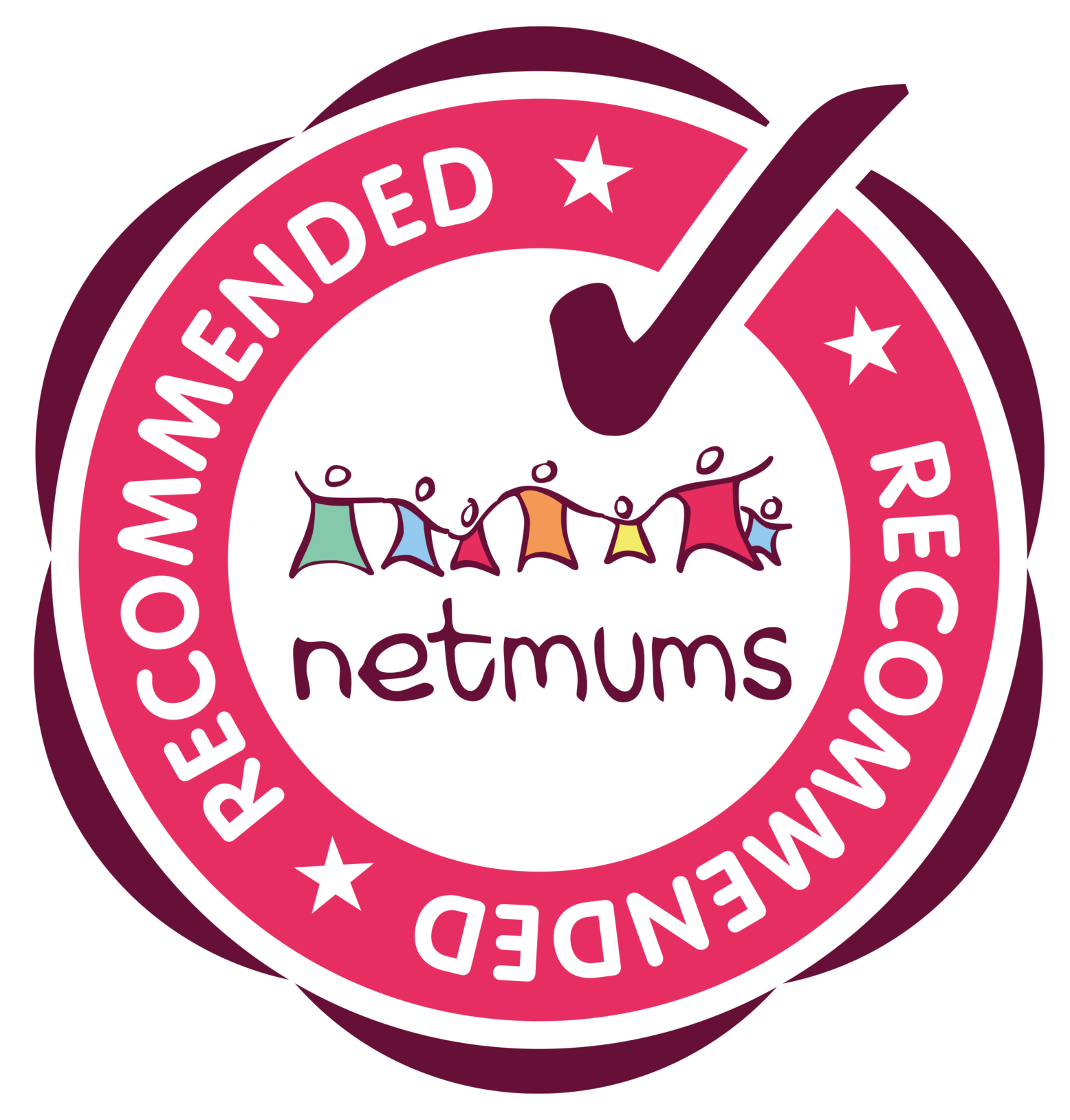
Your nearest centres
Sorry, we don't have any centres within {{distance}} miles, explore learning online tuition.
We also offer online tuition to flexibly fit into your family’s life.
Results from outside {{distance}} miles
Please select a centre.
Showing {{count}} closest to '{{postcode}}'
{{address}}
{{distance}} miles
Can't find a centre near you?
Search again.

11 Plus Creative Writing Tasks List
by Danielle | Jan 11, 2023 | Blog , Creative Writing

The questions your child might be asked in an 11+ creative writing assessment is endless but here is a list which you could use to guide you. These tasks are all taken from real 11+ papers, from schools including Latymer Upper, St Pauls Girls, The Perse School, Emanuel School, Alleyn’s School, Merchant Taylors and the Essex CSSE Exam.
Write a Story
- ‘Taught a Lesson!’ Write a story about a bully who is taught a lesson.
- Write a story entitled, ‘Alone’.
- “The Fire” Write a story with this as your title. Concentrate on describing a fire and its effects, and the thoughts and feelings of the people involved, so that it is convincing for your reader.
Continue a Story
- Continue the story that begins with, Outside my front door, someone had left a large cardboard box .
- Continue the Story that begins with, Pushing the door, his hand shook uncontrollably as he watched the ground open up to reveal a spiral staircase winding down to the unknown.
Write a recount
- Imagine you are a Martian landing on Planet Earth. Write a diary entry (in English!) about your first day.
- A Walk in the Dark. You have had to go out after dark to carry out an errand. Write a letter to a friend telling them: • What you saw. • What you heard. • How you felt about being out by yourself in the dark.
Write a Description
- Imagine it is very early in the morning and you are all alone in your school just before anyone else has arrived. Describe your observations and what you feel.
- Describe a visit to a very cold place.
- Imagine that your train stops in a tunnel in the dark for half an hour. Describe what you see and how you feel.
- Describe someone you will never forget and explain why.
Write about an Experience
- Write about a time when you had to do something that scared you. Explain what happened and describe how you felt. You should make your writing as interesting and detailed as possible.
- Write about a time that you or someone else became frustrated by something. Explain what happened and how you felt.
Write a piece of Non-Fiction
- Write a persuasive letter to your local MP about the litter in your area and what you want them to do about it.
- Do you think children should have access to smart phones? Write a discursive magazine article in which you outline reasons for and against.
- Explain what is your favourite time in the whole year. You should aim to write at least six sentences.
- Write down, in six or seven sentences, instructions for a younger brother, sister or friend on how to clean their teeth.
- Write six or seven sentences describing an animal. For example, a cat, a dog, a guinea pig, a horse. Make your writing as vivid as possible.
- In six or seven sentences, write down clear instructions how to make a piece of toast with jam. Make your writing as precise as possible.
Write about an Image
- Write a story based on the picture below.
- Describe the image.

Creative Writing: Core Skills and Story Writing

11+ Interview Practice Workshop

Years 4-6 Comprehension Course

Years 2-3 Creative Writing Club: Smashing Story Skills
Other blogposts.

What is the Future Stories Community Enterprise?
Feb 15, 2024
What is the Future Stories Community Enterprise? The Future Stories Community Enterprise (FSCE) was established in early 2022 and their aim is to make grammar school entrance examinations both rigorous and yet accessible to all children, including disadvantaged and...

Why should your child join our creative writing courses?
Jan 23, 2024
Children study English often every day at school so why are our creative writing courses so important? In the latest national Key Stage 2 assessment results published in July 2023, 71% of pupils met the expected standard in writing at the end of Key Stage 2, a lower...

What books should my child be reading in 2024?
Jan 1, 2024
Are you stuck for reading book ideas for your child?Here are some ideas to get you going! Reception: Brown Bear, Brown Bear, What Do You See? by Bill Martin JnrWhere’s Spot? by Eric HillThe Very Hungry Caterpillar by Eric CarleClifford the Big Red Dog by Norman...
11+ Creative Writing Exam Prompts

Author: Sam Wainwright
Categories: Blog, Revision, Tips
Date: November 5, 2021
Most independent schools require prospective pupils to write an essay as part of their selective entrance exams. This can be in the form of a nonfiction essay or a creative writing assignment. Typically, students are given between 20 to 30 minutes for this essay and can select what to write from a number of up to four essay titles or other writing prompts, such as images.
Children do often feel that the essay element of the 11+ is a monumental, insurmountable task, and parents preparing them for it can often feel the same way! The tough time limit and the unseen writing prompts can make the essay quite daunting.
What’s more, it can be difficult to find the right resources to prepare effectively for the 11+ creative writing exam. For students seeking extra help, we recommend Eleven Plus Exams’s creative writing preparation course . The course consists of a thorough walkthrough of the forms of fiction and non-fiction that have appeared over the years in 11+ creative writing exams and what skills and techniques are needed to write successfully in each. Each lesson in the course covers different writing briefs commonly found in the exams and teaches pupils how best to tackle all types of questions, placing a focus on exam timing and exam practice.
For those looking for some quick tips and practice materials, you can read our advice for how students can improve their writing and what an examiner is really looking for in a writing essay here .
Creative Writing Prompts
Preparation is key to succeeding in this part of the 11+. Children should aim to write on a daily basis. This does not have to be a full essay every time, but a sentence or two in their vocabulary journals can really help to inspire more ideas and help boost their confidence in their own creativity! The brain, like most other parts of the body, needs to be exercised in order to grow stronger. Creativity and inspiration are no exceptions to this. The more a child dedicates their efforts to creating and exploring new ideas, the easier this will start to come to them. And in the time pressure of an exam, this kind of skill can be invaluable!
Children should therefore practice writing to unseen prompts – they should come up with their ideas, plan, write and proofread all in 20-30 minutes.
We have compiled lists of the different types of writing prompts that can appear in a 11+ exam to help kickstart your child’s creative writing and to provide ample fodder for exam accurate preparation.
Remember that if your child does tackle any of these sample tasks they should set aside time a few days after completing them to revisit their work. Children who rewrite their stories, especially after receiving feedback from readers, often find they are able to spot where to improve and make better progress in elevating their writing.
Essay Titles
Essay titles may be the most common creative writing task assigned to students. For this task, students will be given a single title or a writing brief and must write their story to fit it accordingly. For these types of prompts, it is important to read the whole brief carefully .
Before students begin writing or even planning their essays, they should highlight the keywords in their title or brief. They should note if there are any specific instructions that they must follow. Students will be marked according to how well they fulfil the task they have been given.
For example, we can take a question from Merchant Taylor School in London.
The prompt reads: Write a story with Alone as the title, where you suddenly realise that you are on your own. It may be true or entirely made up, but it should include your thoughts and feelings as well as what happened.
Successful students would follow this brief entirely. Those who title their story Alone and write a story that fits this thematically but fail to write their character suddenly realising that they are on their own, would potentially lose marks for failing to follow the title brief fully.
Here are some more essay titles for your students to practice with.
- Write a story (true or made up) about a visit you make to some relations of your own. (Question from Merchant Taylor School)
- Write a letter to a cousin inviting them to stay with you . You should try and interest them in some of the varied and unusual activities they can take part in. (Question from Merchant Taylor School)
- Describe a situation that you have experienced which might also be called A Magical Moment , showing your thoughts and feelings on the event. (Question from Merchant Taylor School)
- Write a clear description of an animal you know well. Make sure you describe what it does and how it behaves as well as what it looks like. (Question from Merchant Taylor School)
- I prefer Winter to Spring (Dulwich College, London)
- The door and what was behind it (Dulwich College, London)
- The prince of Darkness is a Gentleman (Dulwich College, London)
- Ash on an old man’s sleeve (Dulwich College, London)
- My hobby (Emmanuel College, London)
- Write a story that begins with the words, I had been waiting for such a long time for this to happen… (Emmanuel College, London)
- Write a description of someone you admire . (You may choose someone you actually know, or someone you have never met. Describe them and explain why you admire them.) (Emmanuel College, London)
And more…
- A surprising spy
- Break time at school
- Write a story about a lost key
- Is life too hectic to enjoy fully?
- My favourite memories
- A farewell party
- An attempted robbery
- It was a while before I realised my cat could talk
- Moving Houses
- The new pupils
- The Burglary
- My Brilliant Idea
- The Balloon
- The school rules
- A place that inspires you
- Your favourite day out
- Are Jamie Oliver’s new school dinners a good idea.
- What makes a good friend?
- Describe the scene and the activities at a bus station.
- How does the life of your generation differ from that of your grandparents?
- Discuss the good and bad effects of competition in modern life.
Visual Stimuli
Another type of essay prompt is the visual stimuli. This typically involves one image or a series of images that students can select from that will serve as the basis for a creative writing or nonfiction essay.
This type of prompt is more interpretive than any of the others. Essays can be purely descriptive, wherein students are asked to simply describe the scene pictured using evocative language, or they can be more abstract, in which students are asked to use a picture as a jumping off point for their ideas, and to create a story based on what they see.
Students should therefore practice both describing scenes in unseen pictures and also interpreting unseen pictures to create a story. In the case of the latter, they will often be marked on their creativity and ability to incorporate what they see in an innovative way, as well as on the usual hallmarks of good creative writing.
Here are some examples of visual stimuli for your students to practice with.
Students can practice writing descriptions of the scenes or characters they see, or they can try to write stories based on them. Printing the pictures and labelling them can help with generating ideas and sparking imagination.

Continue an Extract
Students may also be asked to continue a given piece of writing. This could be a single, unseen sentence or paragraph or it could be based on a longer comprehension that the students will have already read as a part of their exam paper. In either case, strong reading skills will be crucial to success in this type of writing prompt.
Students should once again read the question they have been given carefully to ascertain the exact details of their task; they may be asked to continue a text directly from where it finishes, or may be given particular instructions from where to pick it up. They may also be instructed to respond to the text, rather than continue it, which can involve writing letters to characters within it or writing a story based on the events of what they have read.
Students are being marked on their understanding of the text they have read as well as their innate writing ability – successful candidates will demonstrate that they understand the events, tone, genre, style and characters of what they have read.
Here are a few paragraphs from classic texts to kickstart your student’s practice for this question style.
It is good practice to attempt full practice papers for this question style also, as it will help children to prepare for the strict timings and the challenges of the potential comprehension part more accurately.
The printable version can be accessed here .
- Dracula by Bram Stoker (Gothic/Horror) Here and there are silver threads where the rivers wind in deep gorges through the forests. But I am not in heart to describe beauty, for when I had seen the view I explored further; doors, doors, doors everywhere, and all locked and bolted. In no place save from the windows in the castle walls is there an available exit. The castle is a veritable prison, and I am a prisoner!
- Peter Pan by J. M. Barrie (Fantasy) If you shut your eyes and are a lucky one, you may see at times a shapeless pool of lovely pale colours suspended in the darkness; then if you squeeze your eyes tighter, the pool begins to take shape, and the colours become so vivid that with another squeeze they must go on fire. But just before they go on fire you see the lagoon. This is the nearest you ever get to it on the mainland, just one heavenly moment; if there could be two moments you might see the surf and hear the mermaids singing.
- Treasure Island by Robert Louis Stevenson (Adventure) Then all of a sudden there was a tremendous explosion of oaths and other noises—the chair and table went over in a lump, a clash of steel followed, and then a cry of pain, and the next instant I saw Black Dog in full flight, and the captain hotly pursuing, both with drawn cutlasses, and the former streaming blood from the left shoulder.
Sample Essays
The following sample essays were written by children preparing for their selective examinations for entry into senior independent schools. Whilst they have been typed out, the original spelling, punctuation and grammatical errors have been preserved deliberately. These can be great practice to go through with your child, to see if they can spot these errors. This can help improve both their spelling, punctuation and grammar skills as well as their proofreading abilities.
These essays are also a great way for children to see what is expected of them in their exam. This can make the task far less daunting, as they can see what is reasonable and achievable for them to write in their given time limit! You can find more sample essays like those below in our Creative Writings Examples books .
- 11 Plus Sample Essay 1: Original Version and Corrected Version: Tsunami
- 11 Plus Sample Essay 2: Original Version and Corrected Version: Alone
- 11 Plus Sample Essay 3: Original Version and Corrected Version: Ace
Further Practice
For more focussed practice, we have written our own series of Creative Writing preparation books .
These books are full to the brim with more prompts like those above and they are divided into distinct sections dedicated to different styles of writing, with a number of example pieces in each chapter written by students who have sat the 11+. Examining these extracts, like the samples above, and completing the accompanying writing activities will give your child a better understanding of what is required of them in the exam and will provide a great insight into the types of writing they are able to produce themselves, based on the work of children their own age.
Buy these books here .

« The Eleven Plus Exams Forum
Independent School Interview Tips »
Do you have some more questions or want to discuss the package that's right for you?
Enter your address to get updates from eleven plus exams.
100 Creative Writing Prompts for Middle & High School – 2024
April 15, 2024

Some high school students dream of writing for a living, perhaps pursuing an English major in college, or even attending a creative writing MFA program later on. For other students, creative writing can be useful for school assignments, in English and other subjects, and also for preparing their Common App essays . In a less goal-oriented sense, daily freewriting in a journal can be a healthy life practice for many high schoolers. Not sure where to start? Continue reading for 100 creative writing prompts for middle school and high school students. These middle/high school writing prompts offer inspiration for getting started with writing in a number of genres and styles.
Click here to view the 35 Best Colleges for Creative Writing .
What are Creative Writing Prompts?
Similar to how an academic essay prompt provides a jumping-off point for forming and organizing an argument, creative writing prompts are points of initiation for writing a story, poem, or creative essay. Prompts can be useful for writers of all ages, helping many to get past writer’s block and just start (often one of the most difficult parts of a writing process).
Writing prompts come in a variety of forms. Sometimes they are phrases used to begin sentences. Other times they are questions, more like academic essay prompts Writing prompts can also involve objects such as photographs, or activities such as walking. Below, you will find high school writing prompts that use memories, objects, senses (smell/taste/touch), abstract ideas , and even songs as jumping-off points for creative writing. These prompts can be used to write in a variety of forms, from short stories to creative essays, to poems.
How to use Creative Writing Prompts
Before we get started with the list, are a few tips when using creative writing prompts:
Experiment with different formats : Prose is great, but there’s no need to limit yourself to full sentences, at least at first. A piece of creative writing can begin with a poem, or a dialogue, or even a list. You can always bring it back to prose later if needed.
Interpret the prompt broadly : The point of a creative writing prompt is not to answer it “correctly” or “precisely.” You might begin with the prompt, but then your ideas could take you in a completely different direction. The words in the prompt also don’t need to open your poem or essay, but could appear somewhere in the middle.
Switch up/pile up the prompts : Try using two or three prompts and combine them, or weave between them. Perhaps choose a main prompt, and a different “sub-prompt.” For example, your main prompt might be “write about being in transit from one place to another,” and within that prompt, you might use the prompt to “describe a physical sensation,” and/or one the dialogue prompts. This could be a fun way to find complexity as you write.
Creative Writing Prompts for Middle School & High School Students (Continued)
Write first, edit later : While you’re first getting started with a prompt, leave the typos and bad grammar. Obsessing over details can take away from your flow of thoughts. You will inevitably make many fixes when you go back through to edit.
Write consistently : It often becomes easier to write when it’s a practice , rather than a once-in-a-while kind of activity. For some, it’s useful to write daily. Others find time to write every few days, or every weekend. Sometimes, a word-count goal can help (100 words a day, 2,000 words a month, etc.). If you set a goal, make sure it’s realistic. Start small and build from there, rather than starting with an unachievable goal and quickly giving up.
100 Creative Writing Prompts for Middle School & High School Teens
Here are some prompts for getting started with your creative writing. These are organized by method, rather than genre, so they can inspire writing in a variety of forms. Pick and choose the ones that work best for you, and enjoy!
Prompts using memories
- Begin each sentence or group of sentences with the phrase, “I remember…”
- Describe a family ritual.
- Choose an event in your life, and write about it from the perspective of someone else who was there.
- Pick a pathway you take on a regular basis (to school, or to a friend’s house). Describe five landmarks that you remember from this pathway.
- Write about your house or apartment using a memory from each room.
- Write an imaginary history of the previous people who lived in your house or apartment.
- Write about an ancestor based on stories you’ve heard from relatives.
- What’s your earliest memory?
- Who was your first friend?
- Write a letter to someone you haven’t seen since childhood.
- Write about yourself now from the perspective of yourself twenty, or eighty, years from now.
- Write about the best month of the year.
- Write about the worst day of the year.
- Rant about something that has always annoyed you.
- Write about the hottest or coldest day you can remember.
- Visualize a fleeting moment in your life and as though it’s a photograph, and time yourself 5 minutes to write every detail you can remember about the scene.
- Draw out a timeline of your life so far. Then choose three years to write about, as though you were writing for a history book.
- Write about a historical event in the first person, as though you remember it.
- Write about a memory of being in transit from one place to another.
Objects and photographs as creative writing prompts
- Describe the first object you see in the room. What importance does it have in your life? What memories do you have with this object? What might it symbolize?
- Pick up an object, and spend some time holding it/examining it. Write about how it looks, feels, and smells. Write about the material that it’s made from.
- Choose a favorite family photograph. What could someone know just by looking at the photograph? What’s secretly happening in the photograph?
- Choose a photograph and tell the story of this photograph from the perspective of someone or something in it.
- Write about a color by describing three objects that are that color.
- Tell the story of a piece of trash.
- Tell the story of a pair of shoes.
- Tell the story of your oldest piece of clothing.
Senses and observations as creative writing prompts
- Describe a sound you hear in the room or outside. Choose the first sound you notice. What are its qualities? It’s rhythms? What other sounds does it remind you of?
- Describe a physical sensation you feel right now, in as much detail as possible.
- Listen to a conversation and write down a phrase that you hear someone say. Start a free-write with this phrase.
- Write about a food by describing its qualities, but don’t say what it is.
- Describe a flavor (salty, sweet, bitter, etc.) to someone who has never tasted it before.
- Narrate your day through tastes you tasted.
- Narrate your day through sounds you heard.
- Narrate your day through physical sensations you felt.
- Describe in detail the physical process of doing an action you consider simple or mundane, like walking or lying down or chopping vegetables.
- Write about the sensation of doing an action you consider physically demanding or tiring, like running or lifting heavy boxes.
- Describe something that gives you goosebumps.
- Write a story that involves drinking a cold glass of water on a hot day.
- Write a story that involves entering a warm house from a cold snowy day.
- Describe someone’s facial features in as much detail as possible.
Songs, books, and other art
- Choose a song quote, write it down, and free-write from there.
- Choose a song, and write a story in which that song is playing in the car.
- Choose a song, and write to the rhythm of that song.
- Choose a character from a book, and describe an event in your life from the perspective of that character.
- Go to a library and write down 10 book titles that catch your eye. Free-write for 5 minutes beginning with each one.
- Go to a library and open to random book pages, and write down 5 sentences that catch your attention. Use those sentences as prompts and free-write for 5-minutes with each.
- Choose a piece of abstract artwork. Jot down 10 words that come to mind from the painting or drawing, and free-write for 2 minutes based on each word.
- Find a picture of a dramatic Renaissance painting online. Tell a story about what’s going on in the painting that has nothing to do with what the artist intended.
- Write about your day in five acts, like a Shakespearean play. If your day were a play, what would be the introduction, rising action, climax, falling action, and resolution?
- Narrate a complicated book or film plot using only short sentences.
- Read a short poem. Then write a poem that could be a “sister” or “cousin” of that poem.
Abstract ideas as creative writing prompts
- Write about an experience that demonstrates an abstract idea, such as “love” or “home” or “freedom” or “loss” without ever using the word itself.
- Write a list of ways to say “hello” without actually saying “hello.”
- Write a list of ways to say “I love you” without actually saying “I love you.”
- Do you believe in ghosts? Describe a ghost.
- Invent a mode of time travel.
- Glass half-full/half-empty: Write about an event or situation with a positive outlook. Then write about it with a miserable outlook.
- Free-write beginning with “my religion is…” (what comes next can have as much or as little to do with organized religion as you’d like).
- Free-write beginning with “my gender is…” (what comes next can have as much or as little to do with common ideas of gender as you’d like).
- Write about a person or character that is “good” and one that is “evil.” Then write about the “evil” in the good character and the “good” in the evil character.
- Write like you’re telling a secret.
- Describe a moment of beauty you witnessed. What makes something beautiful?
Prompts for playing with narrative and character
- Begin writing with the phrase, “It all started when…”
- Tell a story from the middle of the most dramatic part.
- Write a story that begins with the ending.
- Begin a story but give it 5 possible endings.
- Write a list of ways to dramatically quit a terrible job.
- Write about a character breaking a social rule or ritual (i.e., walking backwards, sitting on the floor of a restaurant, wearing a ballgown to the grocery store). What are the ramifications?
- You are sent to the principal’s office. Justify your bad behavior.
- Re-write a well-known fairytale but set it in your school.
- Write your own version of the TV show trope where someone gets stuck in an elevator with a stranger, or a secret love interest, or a nemesis.
- Imagine a day where you said everything you were thinking, and write about it.
- Write about a scenario in which you have too much of a good thing.
- Write about a scenario in which money can buy happiness.
- Invent a bank or museum heist.
- Invent a superhero, including an origin story.
- Write using the form of the scientific method (question, hypothesis, test, analyze data conclusion).
- Write using the form of a recipe.
Middle School & High School Creative writing prompts for playing with fact vs. fiction
- Write something you know for sure is true, and then, “but maybe it isn’t.” Then explain why that thing may not be true.
- Write a statement and contradict that statement. Then do it again.
- Draft an email with an outlandish excuse as to why you didn’t do your homework or why you need an extension.
- Write about your morning routine, and make it sound extravagant/luxurious (even if it isn’t).
- You’ve just won an award for doing a very mundane and simple task. Write your acceptance speech.
- Write about a non-athletic event as though it were a sports game.
- Write about the most complicated way to complete a simple task.
- Write a brief history of your life, and exaggerate everything.
- Write about your day, but lie about some things.
- Tell the story of your birth.
- Choose a historical event and write an alternative outcome.
- Write about a day in the life of a famous person in history.
- Read an instructional manual, and change three instructions to include some kind of magical or otherwise impossible element.
Prompts for starting with dialogue
- Write a texting conversation between two friends who haven’t spoken in years.
- Write a texting conversation between two friends who speak every day and know each other better than anyone.
- Watch two people on the street having a conversation, and imagine the conversation they’re having. Write it down.
- Write an overheard conversation behind a closed door that you shouldn’t be listening to.
- Write a conversation between two characters arguing about contradicting memories of what happened.
- You have a difficult decision to make. Write a conversation about it with yourself.
- Write a conversation with a total lack of communication.
- Write a job interview gone badly.
Final Thoughts – Creative Writing Prompts for Middle School & High School
Hopefully you have found several of these creative writing prompts helpful. Remember that when writing creatively, especially on your own, you can mix, match, and change prompts. For more on writing for high school students, check out the following articles:
- College Application Essay Topics to Avoid
- 160 Good Argumentative Essay Topics
- 150 Good Persuasive Speech Topics
- Good Transition Words for Essays
- High School Success

Sarah Mininsohn
With a BA from Wesleyan University and an MFA from the University of Illinois at Urbana-Champaign, Sarah is a writer, educator, and artist. She served as a graduate instructor at the University of Illinois, a tutor at St Peter’s School in Philadelphia, and an academic writing tutor and thesis mentor at Wesleyan’s Writing Workshop.
- 2-Year Colleges
- Application Strategies
- Best Colleges by Major
- Best Colleges by State
- Big Picture
- Career & Personality Assessment
- College Essay
- College Search/Knowledge
- College Success
- Costs & Financial Aid
- Dental School Admissions
- Extracurricular Activities
- Graduate School Admissions
- High Schools
- Law School Admissions
- Medical School Admissions
- Navigating the Admissions Process
- Online Learning
- Private High School Spotlight
- Summer Program Spotlight
- Summer Programs
- Test Prep Provider Spotlight

“Innovative and invaluable…use this book as your college lifeline.”
— Lynn O'Shaughnessy
Nationally Recognized College Expert
College Planning in Your Inbox
Join our information-packed monthly newsletter.
I am a... Student Student Parent Counselor Educator Other First Name Last Name Email Address Zip Code Area of Interest Business Computer Science Engineering Fine/Performing Arts Humanities Mathematics STEM Pre-Med Psychology Social Studies/Sciences Submit
- Work + Money
- Relationships
- Slow Living
99 Creative Writing Prompts For Overcoming Writer’s Block

I want to start writing fiction this year. It’s a goal I’ve had on my mind for a while now, but as an essayist and nonfiction writer, I’ve been getting in my head about it. I have no idea how to create stories or characters. But it’s something I want to learn.
In preparing to make this pivot, I’ve discovered that writing prompts are invaluable. They can help us think about stories and subject matter in new ways and serve as a source of inspiration. Even for writers who aren’t looking to explore a new genre, prompts can be useful when we’re in a rut or need some creative magic. Instructions and parameters can help get the words flowing.
While these writing prompts are organized by month, they are designed to be used at your leisure. Feel free to follow it weekly or jump around. You may need to take breaks throughout the year or come back in the summer when you have more time to write—that’s okay, too! Use this list however it works for you and your creative flow!
For further inspiration and encouragement, here are some tips for starting a writing practice .
1. The human spirit is strong. Write about an experience in your life that has made you more resilient .
2. Releasing resolutions can be as important as reaching them. Write an essay in which you reflect on a resolution you didn’t keep.
3. Martin Luther King Jr. said , “I am not interested in power for power’s sake, but I’m interested in power that is moral, that is right and that is good.” Write a story in which your main character uses their power for good. End it with a time jump showing the long-term ripple effects.
4. Craft a story where your main character gets caught outside in a winter storm. How do they find their way home?
5. The darker months can sometimes feel lonely, but moments alone often shape us in powerful ways. Write a lyrical essay about your own isolation experiences and what you’ve discovered about yourself through these seasons.
6. Write a story about a group of friends who travel somewhere warm for a winter holiday.
7. Imagine a group of strangers meeting while trapped in an airport for 24 hours due to flight delays. Who are they? What types of conversations do they have? How will these new relationships evolve and shape the rest of their lives?
8. Begin a short story in which your main character accepts an important award.
9. What does it mean to say, ‘I love you?’ Write an essay that includes an anecdote about the first time you remember feeling loved.
10. Write a comedic story from the perspective of a restaurant server on Valentine’s Day.
11. Who was your childhood best friend? Write an essay using the second-person (try crafting it as a letter ) about what that friendship meant to you.
12. Think about a favorite story or fairytale from your childhood. Rewrite it with an alternative ending.
13. Begin a short story in which your main character is at a coffee shop with their love interest on a winter day.
14. Write about a time you did something that scared you.
15. Imagine a world in which the days are getting progressively shorter. How will your characters stop this countdown and save humanity before it’s too late?
16. Create a story in which two friends meet at a Lunar New Year celebration.
17. Write a scene based on a recent encounter with a stranger.
18. For International Women’s Day (March 8), write a first-person story that takes place at a protest during the women’s liberation movement .
19. In an essay, reflect on the women who’ve helped you become who you are today.
20. Craft a poem from the sun’s perspective in honor of the spring equinox (March 20).
21. In spring, there is a turning. Write an essay about how seasonal changes mirror a transformation in your own life.
22. Try your hand at an allegory using natural elements to convey a larger message about humanity.
23. Your main character just came home from a trip to find their house has disappeared and been replaced with a supermarket. It’s like it was never even there. What happens next?
24. Consider the meaning of beauty and how it has shifted and evolved with time. Write an essay about this.
25. Write a poem about the power of music. Use these playlists for inspiration.
26. Create a short story that begins with you waking up on a train destined for somewhere tropical.
27. For Earth Day 🌎 (April 22), write an essay about sustainable living . What does it mean to you? If you need help getting started, try opening the piece with an anecdote about the first time you thought about climate change and sustainability.
28. In the circle of life, beginnings are preceded by endings. Write about an ending that has led to a new beginning in your life.
29. Begin a story in which your main character wakes up with a superpower.
30. What was the last great novel you read? Try your hand at a book review, writing as if you’re a famous critic for a publishing house or magazine.
31. Imagine a famous chef loses their sense of taste and serves an overly salted meal to eager patrons. What happens next?
32. Write an essay about your childhood home.
33. Write a third-person story about two friends playing in the rain. Rather than focusing on creating climax, aim to capture their feelings of pure love and friendship.
34. What is something you’ve always been scared of? Write a future-tense essay about when and how you will overcome this fear.
35. Toni Morrison once wrote , “Definitions belong to the definers, not the defined.” Write an essay defining yourself, starting with the sentence, “To others, I may seem…but that is not who I am.”
36. Write a poem about your first pet. If you’ve never had a pet, write about your plants or something else you’ve cared for.
37. Write an essay about the day you got your driver’s license.
38. Creativity can be a tool for processing our heartaches. Craft a personal essay about the last time you felt grief—and be gentle with yourself as you get the words on the page.
39. Your main character is on a rooftop in New York City, escaping the crowd of a party. What happens next?
40. Write a summer scene that begins with dialogue.
41. In a personal essay, describe your last vacation, but write about the trip in present tense .
42. Write a short story from an inanimate object’s perspective, either in nature or in your home.
43. The main characters in your story have gone on a camping trip. But when they return from the woods, their city is no longer there. In fact, they can’t find any sign of civilization. Write a suspenseful thriller about what happens next.
44. Craft a poem using the word “citrus.”
45. A couple is sharing a picnic lunch on a beach. By the end of the story, one of them is walking away in tears. What happens? Focus on building tension and the backstory that leads to this moment.
46. Write an essay about a time you worked tirelessly for something, and it didn’t turn out as you hoped or planned.
47. Create a story in which your main character is experiencing profound joy.
48. In a personal essay, revisit a moment when you learned to take your own advice .
49. Using this list of instrumental covers , rewrite the lyrics to a hit song.
50. Write a story in which you’re a tourist and visiting your home city for the first time.
51. Two friends take out a boat on the lake and discover the water has magic powers. Write a fantasy scene about their adventure.
52. Learn about your Enneagram number , then write a personal essay with anecdotes that exemplify your basic desire and basic fear.
53. You and your best friend are on a sailboat off the coast of Italy when suddenly the captain disappears. What happens next?
54. Write a story about an encounter with a sea creature.
55. Create a lyrical essay in which the main character is “summer heat.”
56. Write an essay through the lens of your childhood self about your first year at school. Try to be as specific as possible, including the names of friends and teachers. You can use old photos or talk to your parents for reference if needed.
57. Write a story that begins with your main character swimming in a lake.
58. Sometime this week, spend a few minutes sitting outside or staring out your window to observe another person. Write about what you notice that can help to sketch them as a character.
59. Make a case for one of your favorite traditions —whether it be celebrating a recognized holiday or a personal ritual.
60. Write a short story that begins with the ending. For example, perhaps your story is about a girl who gets lost at sea and then captured by pirates—only to become a pirate herself. Begin the story with the girl as a pirate, and then show the readers how she got there.
61. What is the happiest you’ve ever been?
62. Create a short story that starts with your main character going off to college.
63. What is the most important lesson you’ve learned this year?
64. Lidia Yuknavitch says , “There is so much to learn from the edge of things, from the cracks and cuts and fissures of the earth, of our hearts.” Write a lyrical essay about the cuts and fissures in your own heart and how they’ve led you to this very moment.
65. Write a sensory essay about nature without naming the objects you’re writing about. For example, “The towering giants boast cherry-ripe foliage at this time of year.”
66. Craft a short story about the final day of summer (September 22). 🍂
67. Try your hand at children’s lit by creating a story for a younger audience. Have your main character learn a valuable life lesson, and use these stories for inspiration if you need help!
68. When was the last time you felt most alive?
69. Write an essay about a change you knew was coming and how you prepared for it.
70. Create a story where the main character is a caregiver for a loved one.
71. Write a poem about shadows.
72. On Indigenous People’s Day (October 10), write a historical nonfiction essay about the native land you’re living on . For guiding questions, use the Catalyst Project’s worksheet and Resource Generation’s Land Reparations Toolkit and Indigenous Solidarity Toolkit .
73. Write a story in which a “monster” turns out to be a “hero,” or vice versa. This can be either nonfiction or fiction.
74. You and your significant other are at home watching a scary movie when the power goes out. Create a spooky story about what happens next!
75. Create a spooky children’s story that takes place in a magical forest.
76. Write a story that begins with a girl making her own Halloween costume.
77. Write a persuasive essay about an unconventional fear. Make a case for why more people should consider this fear.
78. A group of friends escapes to a private island for an end-of-year holiday. But when they arrive, the hotel is deserted, and the boat has already left the dock. What happens next?
79. Write about the last time you felt hopeful.
80. In preparation for losing an hour of daylight this month, write a poem about all your favorite cozy things.
81. Write a story that begins with your main character dreaming.
82. In “ Braiding Sweetgrass ,” Robin Wall Kimmerer writes, “In some Native languages the term for ‘plants’ translates to ‘those who take care of us.’” In an essay, write about how the earth cares for humanity. Begin with a personal anecdote about a time you felt nurtured by nature.
83. Write a first-person essay that revolves around food or a family recipe.
84. Practice shifting between past and present tense by writing an essay about a childhood experience that impacts who you are today.
85. Write a letter to your younger self.
86. Create a story based on a time you went on a spontaneous adventure.
87. Your main characters are at a college football game when, suddenly, the sky goes black. What happens next?
88. How do you overcome self-doubt? Write a how-to essay.
89. What are you most grateful for this year?
December
90. Write a poem about your favorite sound.
91. Reflect on winter pastimes. What do you love most about this season? Write a short essay about it.
92. Make up your own holiday poem reminiscent of “Night Before Christmas” (or the equivalent for your celebrated traditions).
93. Your main character is a ballerina performing in The Nutcracker, but secretly, they wish to be a teacher. Write a story about this.
94. Who is someone you admire in your life? Write a tribute essay to them.
95. To get in the spirit, create a Hallmarkesque script for a cheesy holiday film.
96. Write an essay that begins with your favorite holiday memory.
97. Your main character is a flight attendant working the holiday season. Write about a strange encounter they have on the plane.
98. What is the importance of rest, and why is it such a necessary practice for our lives?
99. In your final prompt of the year, write an essay about time and forward motion. Begin by reflecting on the past, write about the importance of mindfulness and living in the present moment, and then welcome whatever comes next.
If you write a story with one of these writing prompts and you’d like to share, feel free to link or paste it in the comments below! 💛
Kayti Christian (she/her) is the Managing Editor at The Good Trade. She has a Master’s in Nonfiction Writing from the University of London and is the creator of Feelings Not Aside , a newsletter for sensitive people.
RELATED READING

- Skip to primary navigation
- Skip to main content
- Skip to primary sidebar
Teaching Expertise
- Classroom Ideas
- Teacher’s Life
- Deals & Shopping
- Privacy Policy
20 Creative Writing Activities For Middle School: Poem Ideas, Prompts, Story Starters, And Worksheets
April 10, 2024 // by Stephanie Ledford
Some students are prolific writers, needing no help putting pen to paper and telling their stories. However, there are other students who need a little more direction in order to get their stories out. Whatever the case may be, these 20 creative writing activities for middle school will have all of your students showing their creative prowess.
1. I Am From
After reading the poem “Where I’m From” by George Ella Lyon, have students write their own “I Am From” poems. Using a template, all students will be able to create wonderful poems illustrating their own unique backgrounds.
Learn More: Made by Teachers
2. Found Poems

Using the words of others, students create their own “found poems.” By taking a snippet here and a line there, they can arrange them in their own creative ways to create new, interesting poems. Reading a book as a class? Have them use the book to create a found poem!
Learn More: Read, Write, Think
Your middle schoolers are sure to feel like poets in the making with this creative assignment. Encourage them to connect themselves to something bigger, like their families, their culture, or their historical background as you task them with creating poems using their own names. Prompt them to begin their writing process by having them use the letters of their names to inspire a new line of poetry that they think reflects who they are as a person.
Learn More: Mama Smiles
4. Chain Stories
This assignment has each student start with a blank piece of paper. After giving them a writing prompt , every student begins writing a story. After your chosen time limit is up, they stop writing and pass their story to the next person in their group who then has to continue telling the story. When each story returns to its original author, the activity is complete.
Learn More: Creativities ESL
5. Visual Character Sketch
Being able to add depth to a character can be difficult for many students. By allowing a student to create a visual sketch, you are allowing them a different approach to writing a character description.
Learn More: Adobe Education Exchange
6. What If…
“What if” writing prompts are a great way to get your learners’ creative juices flowing. By posing a question, they’re given a starting point, and it’s up to them to decide what twists and turns their stories will take. Will they write a sad, action-packed, or scary story? The possibilities are endless!
Learn More: Journal Buddies
7. Descriptive Writing Prompts
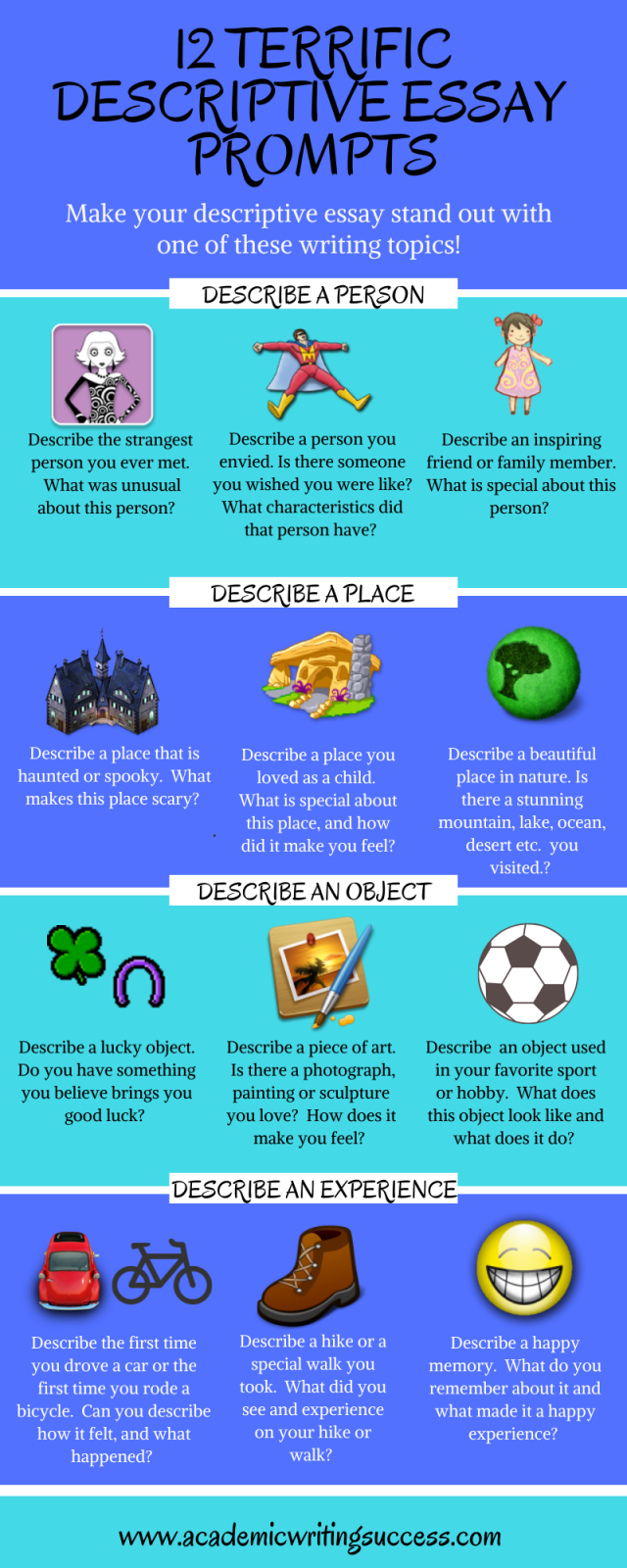
Descriptive writing activities are another way for middle school students to practice their creative writing skills. They can give their descriptions their own unique twists by using their different writing styles to describe common objects. And hey, they might have a different appreciation for the things in their everyday worlds after this assignment!
Learn More: Academic Writing Success
8. Scary Stories
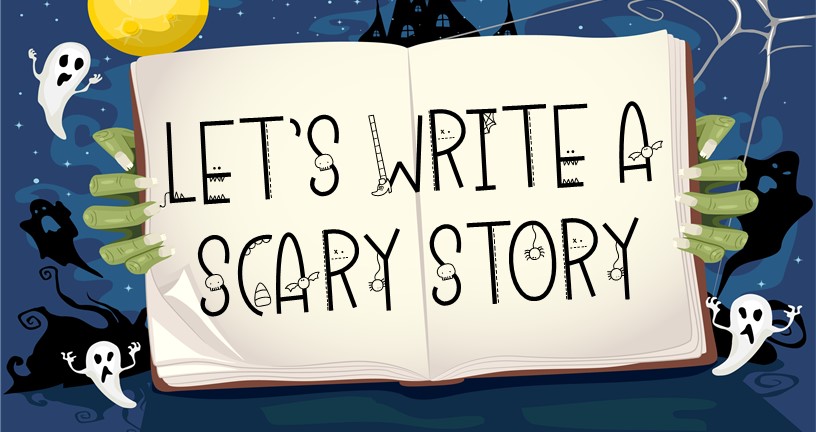
Go through the entire writing process and teach your students how to write scary stories! Before you begin writing, though, read them some (age-appropriate) scary stories to give them the chills and an idea of what is expected in a scary story.
Learn More: Keep ’em Thinking
9. Daily Journal Writing
There is no better way to improve students’ writing abilities than to do daily writing. Each day, give students a different prompt and allow them to write for fifteen minutes. After, allow them the opportunity to share their story with their peers or the class.
Learn More: Daily Teaching Tools
10. So Much Depends Upon…
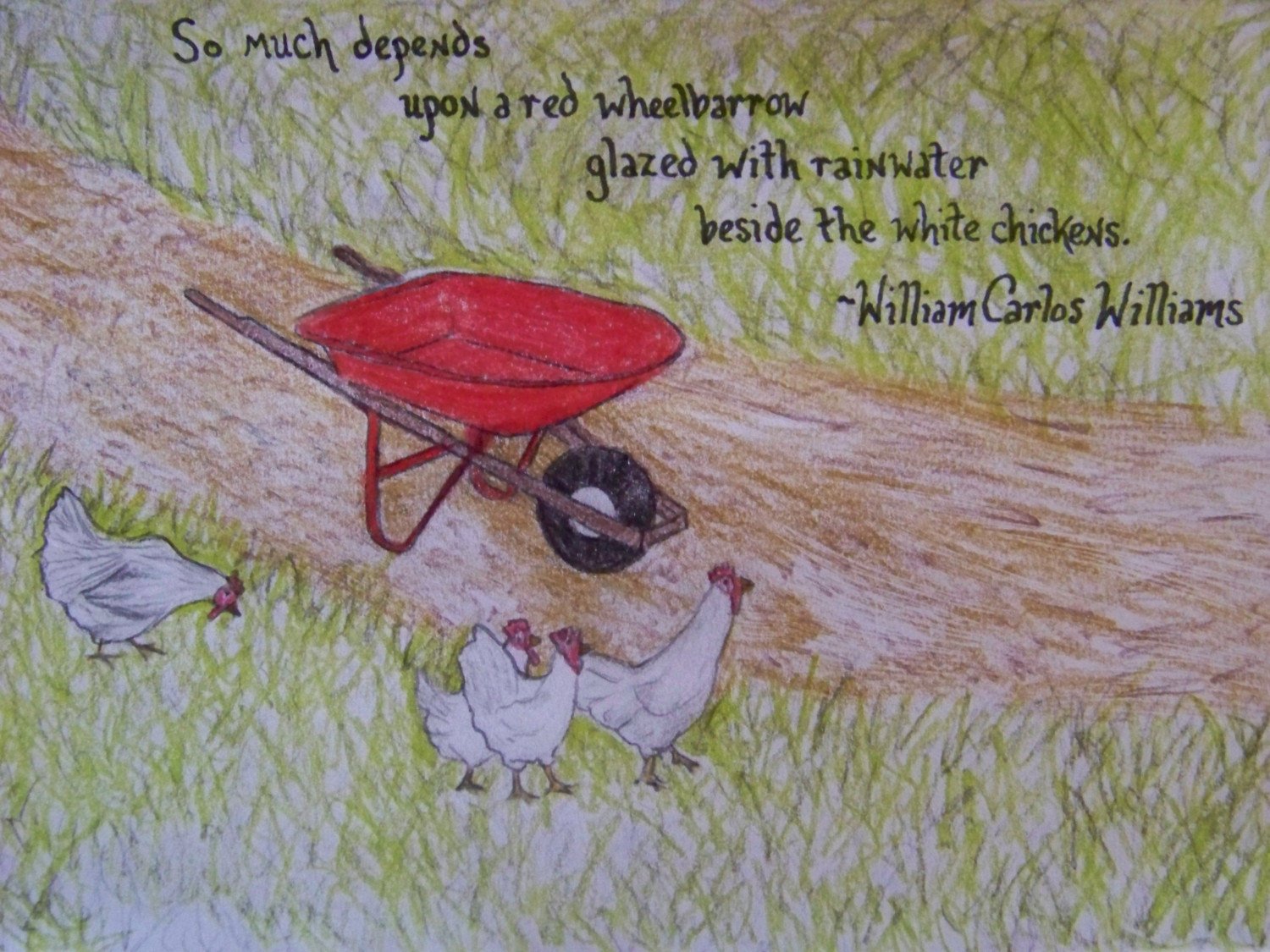
“ The Red Wheel Barrow “–such a simple yet eloquent poem. Following this lesson plan, your students will be able to write their own simple yet eloquent poems and feel like accomplished writers.
Learn More: NYLearns
11. An Ode to…
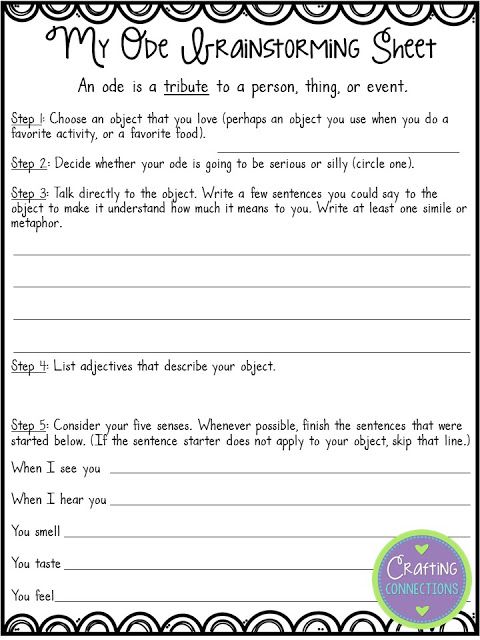
Reluctant writers are often intimidated by complicated writing ideas. By using a template like the one pictured above, your students will all be able to feel like poets as they create their own odes about a person, place, or thing.
Learn More: Crafting Connections
12. Story Starters
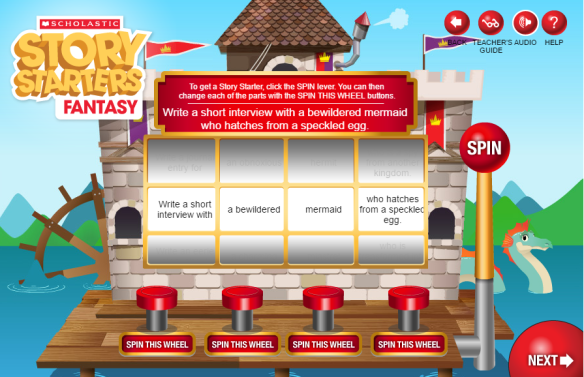
Story starters are a great way to help students begin their stories. If you have a digital classroom, the Scholastic story starter page is great because it can formulate much different writing prompts, helping engage all students.
Learn More: Scholastic
13. My Time Machine Trip
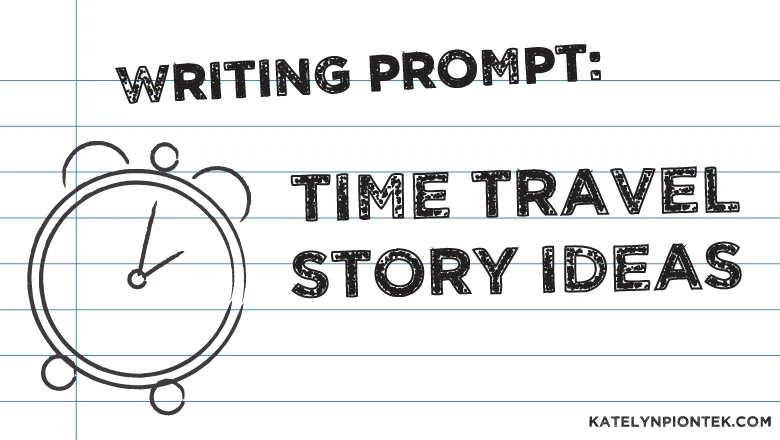
What is everyday life like in 1902? How about in 2122? Have students write stories about their experiences traveling through time using the attached worksheet. For those that need a little extra help, allow them to research time periods so they have an idea of what life was like then.
Learn More: K12 Reader
14. Writing and Math

This is a great assignment for a math class! Using the provided instructions, students are to write a story that explains to their boss the math they used while delivering packages. Since this assignment asks them to cover specific math concepts, make sure you cover them in class first (or hand this assignment to a math teacher and let them have at it!).
Learn More: Dr. Hamblin
15. How to Bake Cookies for Santa
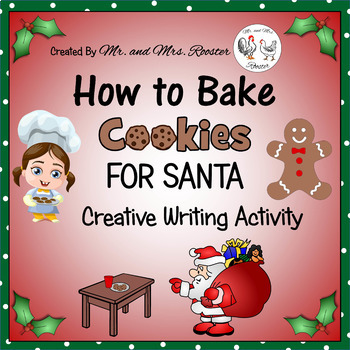
Seasonal writing activities are a great way to get kids excited around the holidays! One way to get descriptive paragraphs out of your students is through these instructions on how to bake cookies for Santa. The great thing about this assignment is all levels of writers can participate. Those that are more advanced can provide more details and struggling writers can still feel accomplished by explaining the cookie-making process!
Learn More: Teachers Pay Teachers
16. Diary Entry of a Literary Character
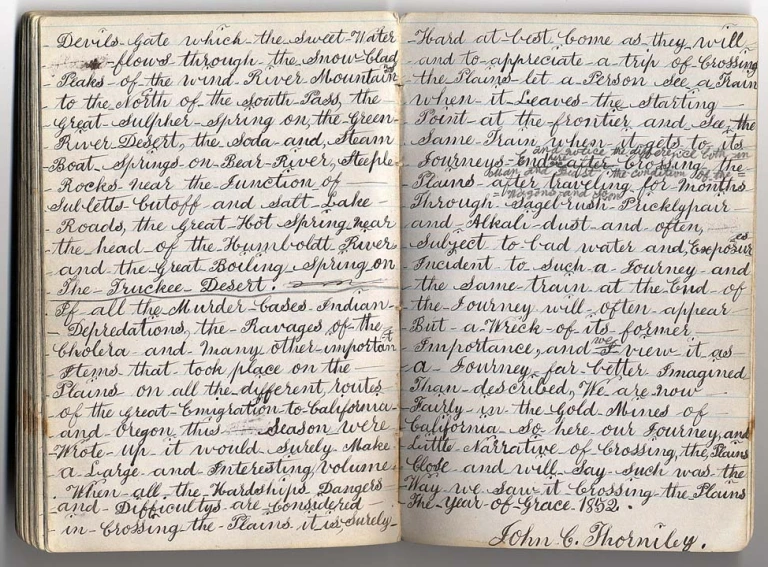
Another favorite among creative writing ideas is having students write diary entries in the voice of a character from literature. This can be a character from a book you read as a class or from a book they read on their own. Either way, it will showcase their creative writing skills and their knowledge of the character!
Learn More: Banana Magic
17. Write a Rant

Writing a rant is a good assignment to use when you are trying to teach about the different voices we use when writing. When writing a rant, you are going to use an angrier, more aggressive voice than if you were writing a children’s story. This is a great warm-up to get students ready to write persuasive essays.
Learn More: Teachers and Writers Magazine
18. Write a Newspaper Story

After reading through some newspapers to get ideas on how newspaper articles are formatted, have each of your students write their own article. When they are all done, you can compile a classroom newspaper!
Learn More: Nie Online
19. Coat of Arms
Studying Shakespeare? Maybe European countries where it was common to have a Coat of Arms? If so, this assignment is perfect for your class. Have students create a coat of arms and then write a few paragraphs explaining their choices.
20. A Letter to Yourself

Have students write letters to their future selves. Give them specific questions to answer like “where do you see yourself in five years? Are you happy with your life? Is there anything you would change?” And then in five years, mail the letters to their parents!
Learn More: Ms. Carota

11 Creative Homemade Bird Feeder Ideas For Your Garden
Posted: February 5, 2024 | Last updated: February 5, 2024
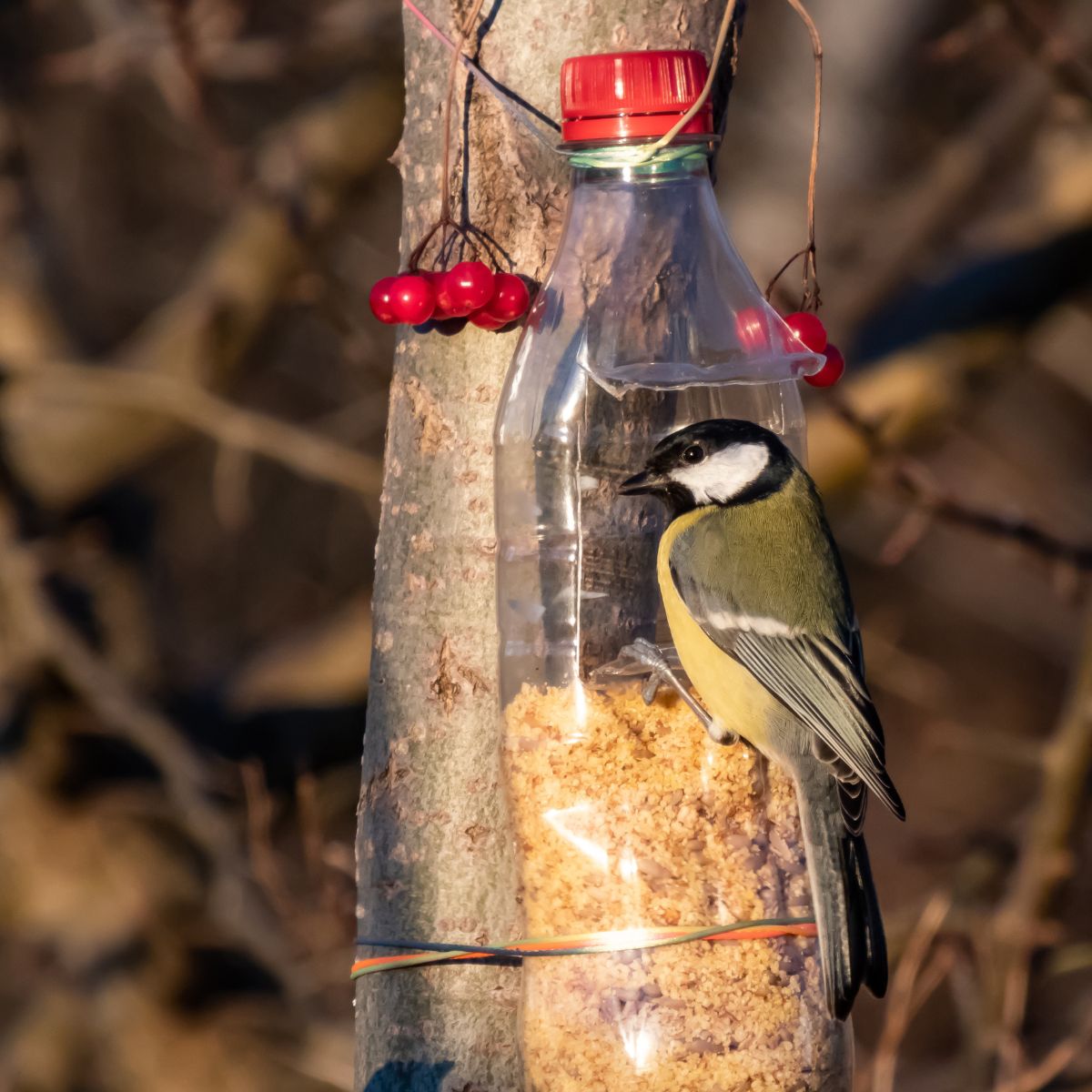
A beautiful backyard bird feeder is all it takes to bring a variety of birds to your garden. You can watch them snack on the feast together and chirp away without a care in the world. If you’re an avid bird watcher like me, you’ve probably bought a few bird feeders. I’m sure that they look picture-perfect. However, I am trying to take the DIY route as much as I can these days.
Luckily, it’s easier than you think because there are many homemade bird feeder ideas .
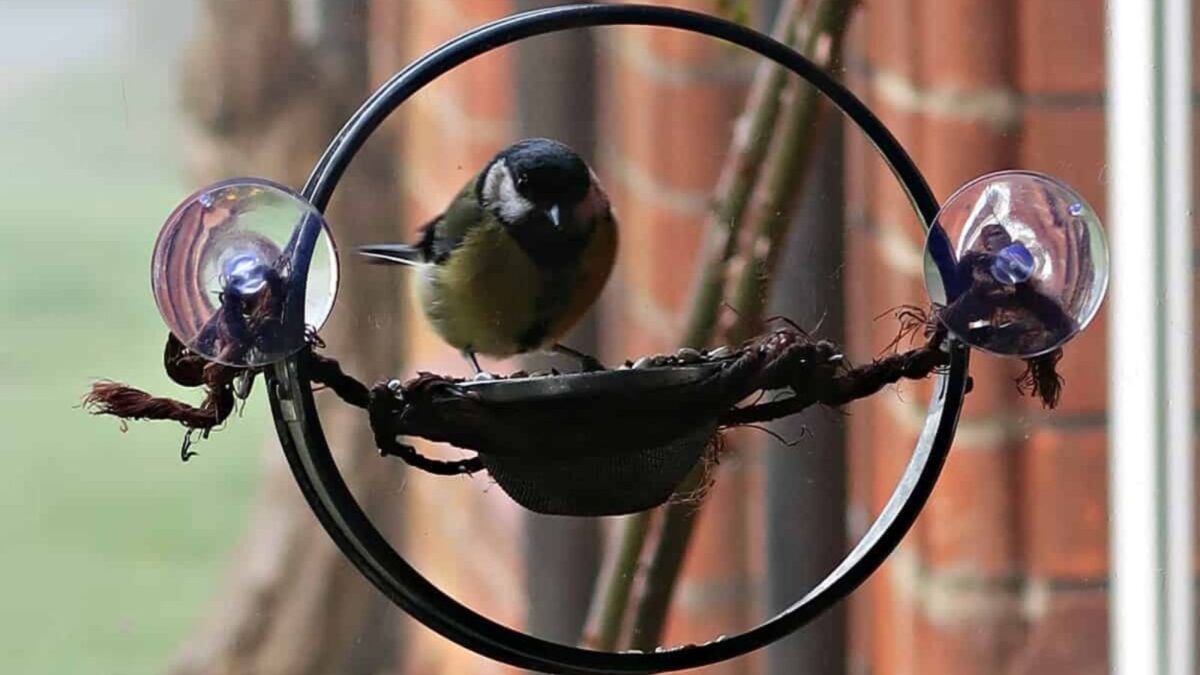
1. Cute Window Bird Feeder
Don’t you hate it when birds fly away as soon as you step into the garden? Craft Invaders figured out a brilliant way to avoid that. These guys have a knack for twisting traditional things into something unique.
That’s precisely what this homemade bird feeder is all about. You use a few old kitchen utensils, a florist’s wire, and suction cups.
Then voila! You’ve got a bird feeder to stick to the window sill. Once the birds get used to this exciting contraption, you’ll start getting feathered company flying over for breakfast.
Get instructions here.
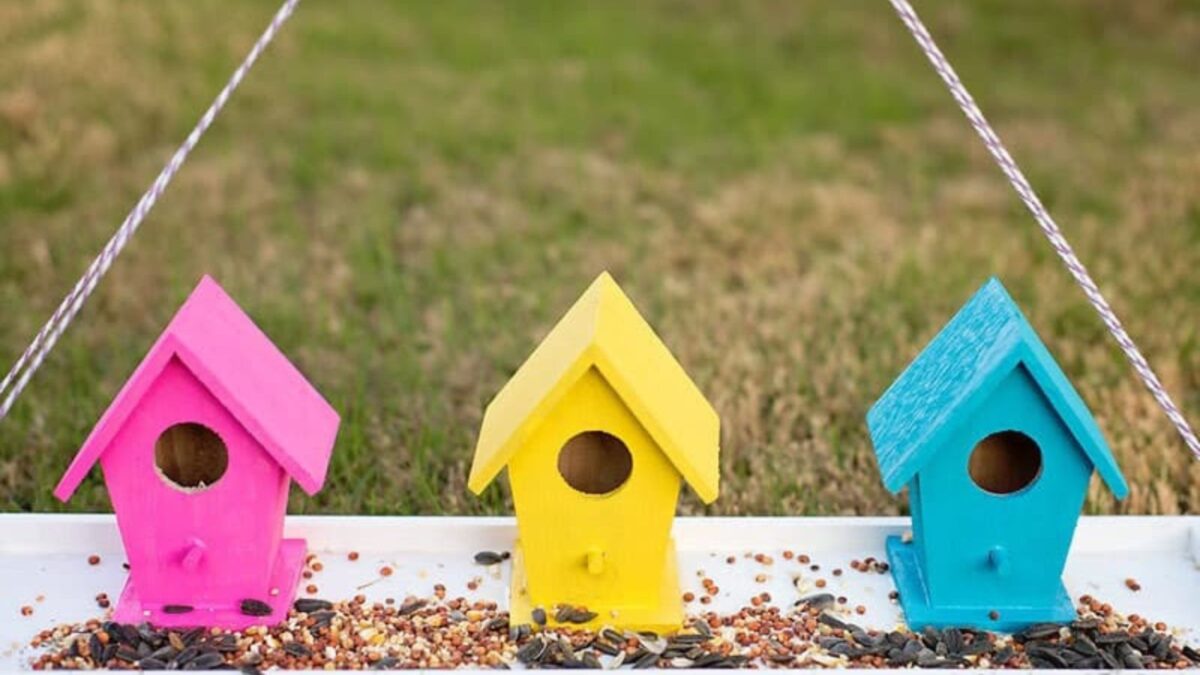
2. DIY Bird Feeding Station
Not all of us are blessed with DIY skills. However, that doesn’t mean that we can’t enjoy making bird feeders. It’s why I selected Jamie’s charming birdhouse idea for my DIY bird feeder list.
She bought a few miniature birdhouses from the dollar store, painted them in vibrant shades, and then glued them to a flat tray. See details here .
After that, you need a strong string that manages to handle the weight of the tray and the birdhouses.
The most significant advantage of this project is that it’s got a professional touch to it. I recommend using them as gifts for your fellow backyard gardeners .
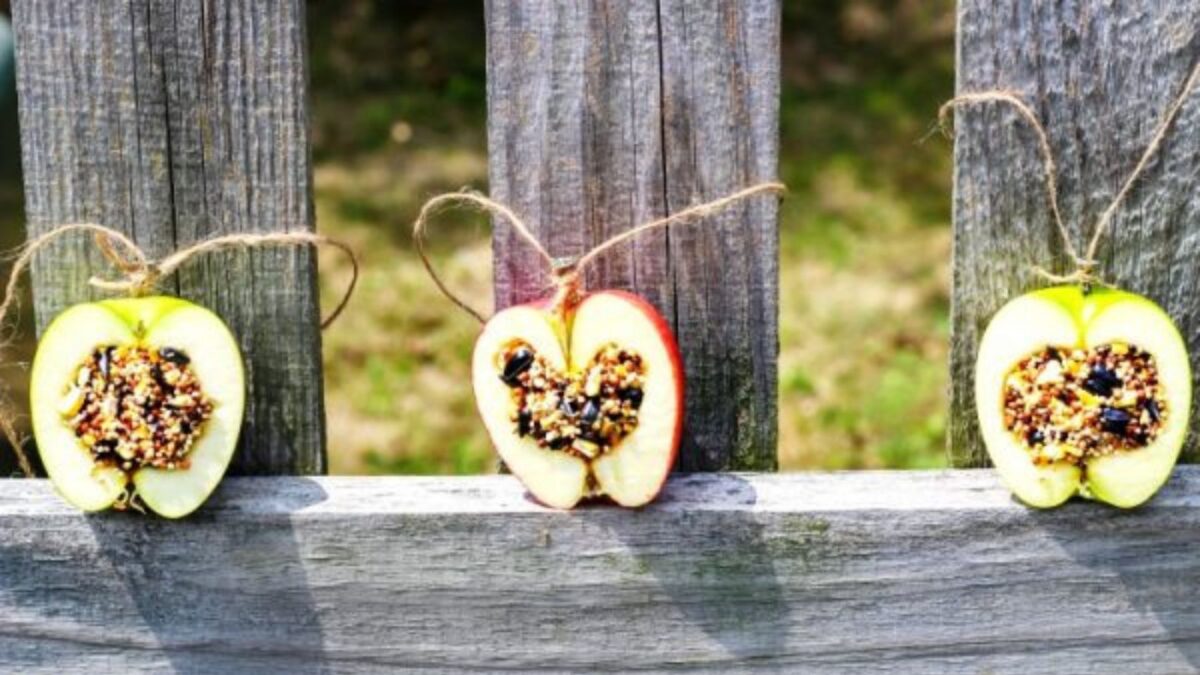
3. Apple Birdseed Feeders
Kim knocks it out of the park with these apple ornamental feeders. I usually end up with a surplus of apples during autumn. I don’t always know what to do with the fruit once I have cooked up some delicious apple recipes . I don’t mind using the leftovers for this nature enthusiast’s cause.
Creating these is similar to the orange cups. Only this time, you’ve got to take out the core and some of the flesh instead of the whole thing. You then fill the apple with a mixture of gelatin and seeds. Then, place them on your picket fence or wall to welcome the hungry arrivals. Details here .
It’s a true homage to the crispy, crunchy season of fall and the abundant harvest it brings with it. I plan to team up these gorgeous snack bars with my pumpkin planters .
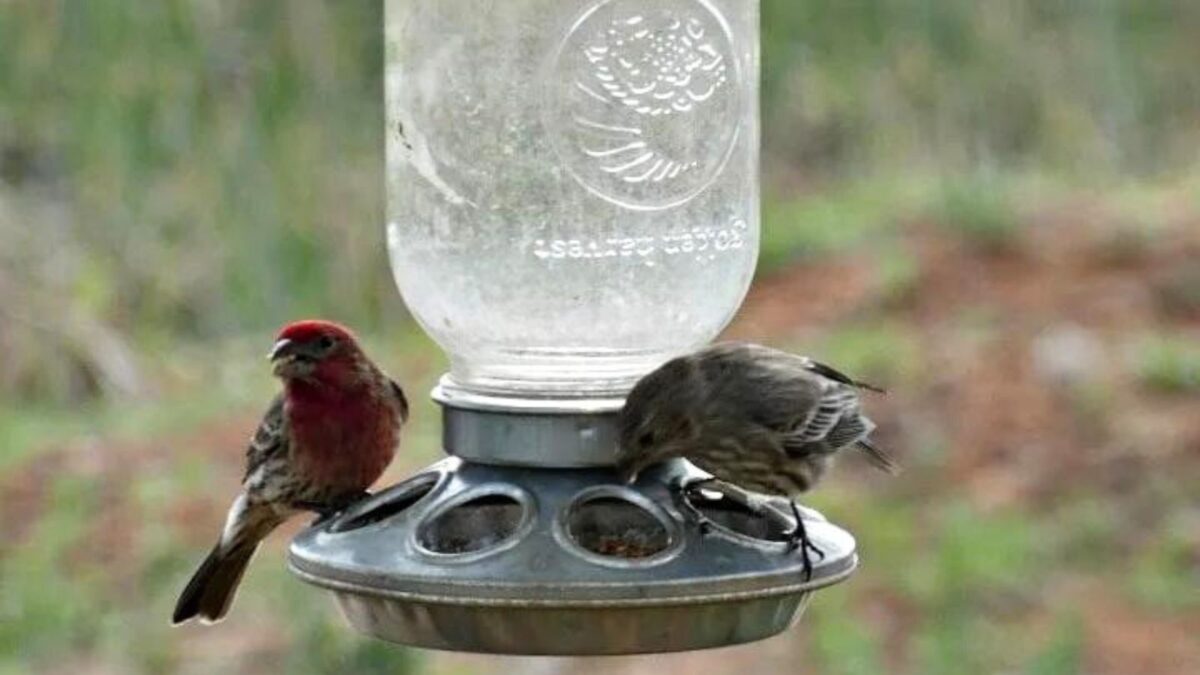
4. Mason Jar Birdfeeder
It’s a super simple idea lasting longer than the plastic varieties.
What do you need?
– mason jar – a baby chick bird feeder – medium-sized vintage lid
That’s it! You have to assemble these core components with super-strong glue. Then, let the glue set, and you are ready to go. Step-by-step instructions here.

5. Tea Cup Bird Feeder
Craft Bits is always coming up with classic takes on modern ideas. This cute teacup arrangement reminded me of tea parties held at Grandma’s. It’s charming and elegant to look at and fulfills the function of feeding the birds effortlessly.
I bet that it’ll make for a great Christmas gift for grandma . Imagine her surprise if she sees one of her china-patterned tea sets assembled for her birdies.
You can also set this up for a friend who is fond of ‘Alice in Wonderland.’ This certainly takes inspiration from the Mad Hatter’s infamous tea party.
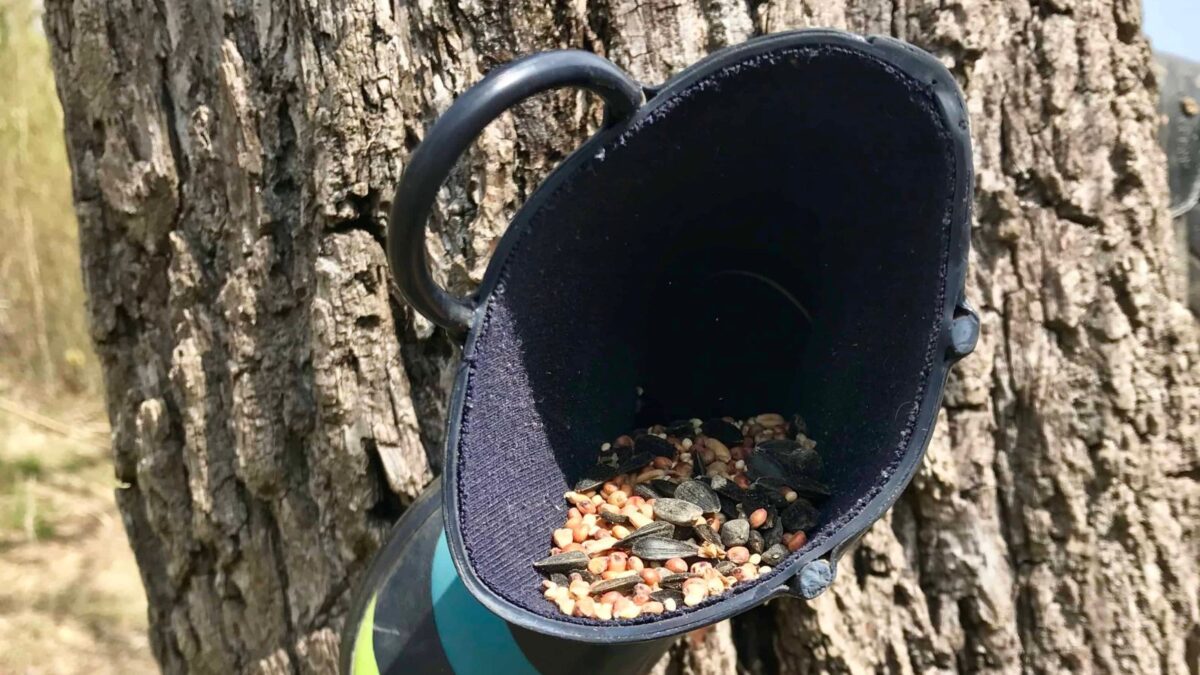
6. Eco-Friendly Bird Feeder
The Happiest Camper uses her happy-go-lucky spirit and creative ideas to find a purpose for all unwanted things. Her eco-friendly take on bird feeding took me by surprise, but I warmed up to it soon enough. I never thought I’d use a shoe to feed birds , but here we are.
You can try this out with any shoes/boots you have outgrown. Drill them to a tree trunk or hang them on the branches. No bird will decline this unusual platter as long as they don’t fall off and are full of seeds. It also makes for a unique fall decor for your lawn.
Pro tip: It might sound obvious, but don’t forget to wash your shoes before using them.

7. Plate and Bowl Feeder
This blog helps you to turn your garbage into treasure by presenting wonderful ways to reutilize the products. So, what are we reusing for the bird feeder? Plates and bowls.
The exciting part about this homemade bird feeder is that it feels like an extension of the two ideas that have already been shared. That’s because it’s got a big plate covering the feeder like the first one. The plate shields the food from rain and snow, just like the lid.
Once again, you can use spare utensils from the kitchen to create this beauty. The other option is to go to a thrift store or neighborhood yard sale to find the plate and bowl. No matter what you do, it is an inexpensive way to feed the birdies.
The only difference is that this one requires some solid DIY skills. So remember to wear your protective gear if you opt for this project.

8. Fresh Orange Bird Feeder Kids Can Make
Kids will LOVE making these citrus cups. Use fresh orange peels to make a bright bird feeder. The trick is to scoop out the fruit’s flesh instead of peeling the skin in layers.
After that, you must attach strings to the cup and fill it with the seeds. Then, hang it anywhere in the backyard for the birdies. The biggest bonus is that this is 100% environmentally friendly. So the children can learn about conservation and nature at the same time.
Pro tip: the bigger the orange, the better!

9. Coffee Mug Bird Feeder
Ann teaches us to live life to the fullest without breaking the bank, so I wasn’t surprised to find a clever bird feeder on her blog .
Didn’t we do a teacup version of this? Yes, we did, but mugs are more weather-resistant and durable. They don’t break that easily, either.
I also thought that it makes an excellent gift for the coffee lover in your life. It’ll be a nice change from the customized coffee mug or coffee blend basket they usually get.
Why? This quirky gift is personal and gives a nod to their favorite beverage. It also adds a fun vibe to the garden too. The person you gift it to will always think of you whenever they see a bird snacking on this thoughtful gift.

10. Popsicle Stick Bird Feeder
This is such a great idea! Use Popsicle sticks to build a bird’s food station. It’s a great way to include an interactive activity for your kid’s birthday party.
Details here.

11. Milk Carton Bird Feeder
An empty milk carton can turn into a delicious buffet for the birds. You can leave it simple, like the one above, or get creative with decorations.
This would be a great kids’ activity: have an adult cut the box in the required shape and then let the kids run wild. I’m pretty sure they’ll develop various versions of this project.
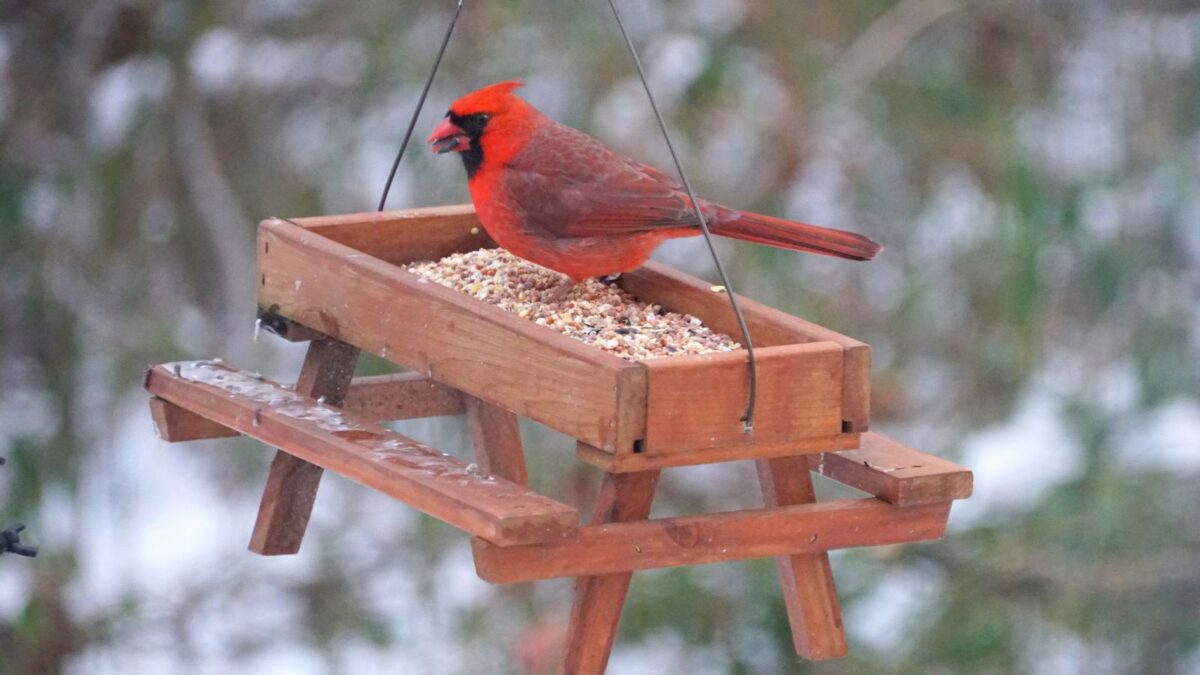
Best Bird Feeders For Cardinals
Since cardinals are bigger birds, you must remember their size when choosing a bird feeder. It’s hard for cardinals to maneuver around a tube-type or small bird feeder if the feeder doesn’t have a suitable perch.
Here are the best bird feeders for cardinals.
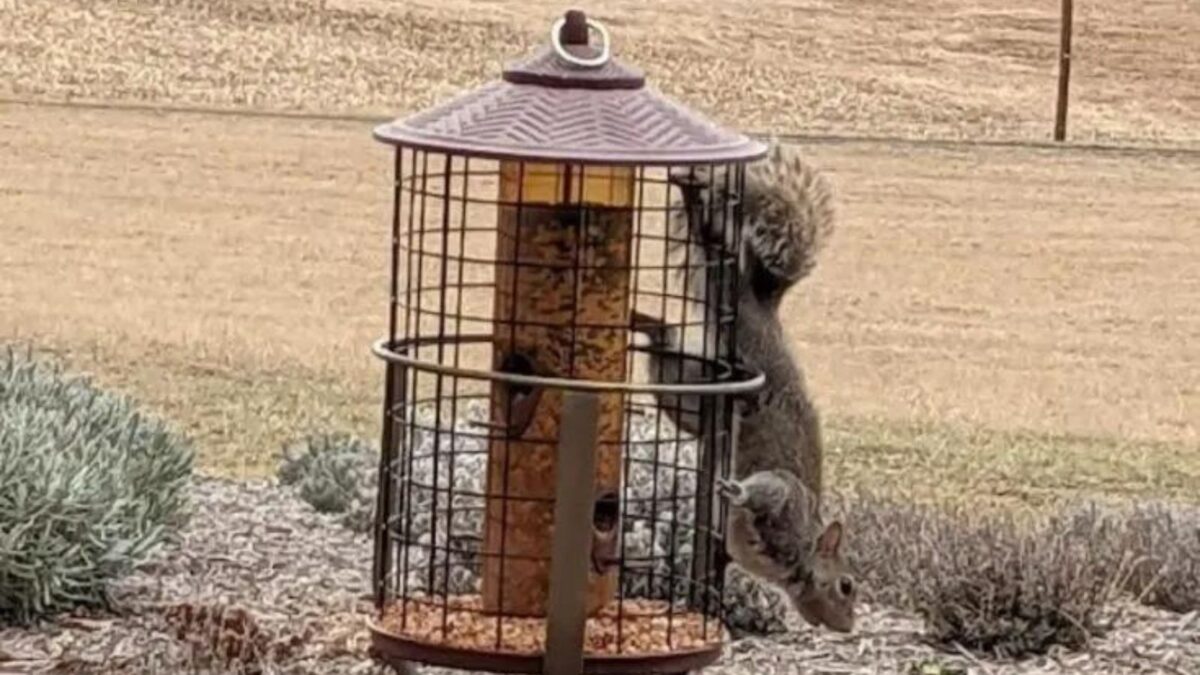
How to Keep Squirrels Away From Bird Feeders
Love them or hate them, these cute little critters are everywhere, and if you put out feeders for your birds, you’ll find the squirrels stealing from them or even aggressively scaring them away.
Here’s how to keep squirrels away from bird feeders.
More for You
Israel shot down Iranian missiles with F-35I Adir stealth fighter jets that cost $44,000 per hour to fly
Ohio GOP leaders reject Democrats' plan to get President Joe Biden on November ballot
Darkest Sitcom Theories That Actually Make Sense
Red Lobster considering bankruptcy filing: report
CBS issues statement over chaotic Billy Joel broadcast
What To Do If A Garden Snake Slithers Its Way Into Your Home
10 pairs of movies with strikingly similar plots that came out the same year
House resolution condemning 'From the River to the Sea' chant as antisemitic passes with 44 opposed
Mystery of How Pluto Got Its Heart Finally 'Solved' by Astrophysicists
7 Things Your Date Notices About You Immediately
Stop thinking your expensive watch is an investment, says Rolex boss
Why Some Travelers Put Sticky Notes in Their Passports — and What We Think You Should Do Instead
14 Movies That Aren’t Classified as ‘Scary’ but Still Give Us the Creeps
51 Mind-Blowingly Cool Things From Other Countries That The US Needs To Adopt STAT
Supreme Court consideration of obstruction law may not be Trump's salvation after all
Anheuser-Busch has ‘learned their lesson’: Former exec Anson Frericks
LA Mayor pleads for wealthy to help buy housing for the homeless: 'Unprecedented partnership'
OJ Simpson has been cremated, estate attorney in Las Vegas says. No public memorial is planned
Francesca Amewudah-Rivers Is the Latest Black Woman to Face a Predictable Pattern of Misogynoir After Success
20 facts you might not know about 'John Wick'

VIDEO
COMMENTS
11+ creative writing questions from real papers—non-fiction prompts. Write a thank you letter for a present you didn't want. You are about to interview someone for a job. Write a list of questions you would like to ask the applicant. Write a letter to complain about the uniform at your school.
If your child is in year 5 of primary school, then chances are they may be sitting their 11+ exams soon. In many of the 11 Plus exams will be an English paper that includes a creative essay, in which your child will be expected to demonstrate their literacy skills creatively by using extensive language, grammar and punctuation.
To succeed at an 11 Plus comprehension task, students need a range of skills, including: Source. 1. Imagination and creativity. One of the most important skills for creative writing is the ability to come up with an original idea which fully answers the given question and uses imaginative language.
Creative 11th-grade writing prompts. The 11th-grade teacher must give students creative writing assignments to boost their mental capacity for imaginative writing. Here is some creative writing prompts for 11 graders. • Write a short story about a city that was ruined by a flood and how the people coped with the devastation.
Unlock your child's creative potential with our comprehensive 11+ Creative Writing Guide. Packed with expert tips, engaging prompts, and practical exercises, this guide empowers parents to help their children excel in the 11+ exams. From mastering storytelling techniques to enhancing descriptive writing and crafting compelling openings, our 11 ...
11 Plus creative writing example topics list. The following topics and tasks have come up in either in grammar school or independent school 11 plus writing tests: Core themes for creative writing topics and tasks: Many stories have core themes or emotions or feelings within them. When developing your descriptions banks these are useful areas to ...
Their book, Creative Writing Skills, has sold over 4,000 copies and has been a Number One Best Seller on Amazon. It is suitable for children aged 7-14. The questions your child might be asked in an 11 plus creative writing assessment are endless, but here is a list which you could use to guide and inspire your child's practice.
Start your planning by spending two or three minutes writing down all the ideas that come into your head. This technique is also known as 'free writing' and is a great way to tap into your creativity! Don't worry about punctuation or grammar at this stage - just get your ideas down on paper. 2. Plan, plan, plan.
In most creative writing exams, your child will be given an imaginary scenario and 30-45 minutes to write about it. Here are some examples of creative writing topics your child might be asked to write about in the exam: The natural world, e.g. Imagine you are on a desert island. Activities, e.g. Describe a hobby you like doing.
15 Funny Writing Prompts. #1: Write a story which starts with someone eating a pickle and potato sandwich. #2: Write a short script where the plot has to do with evil dolls trying to take over something. #3: Write about writers' block.
Creative Writing Prompts For 11+ Students. Whilst schools are closed, we're working on sharing materials and resources to help students make the most of their time indoors. Today, I'm sharing a set of 6 Creative Writing Prompts that are ideal for helping your child to improve their writing. These title-based prompts are great for helping ...
The 11 Plus English exam might present prompts from various genres. Prepare your child by exposing them to different styles of writing—mystery, adventure, fantasy, and more. This versatility will prove invaluable during the exam. My new Bright to Brilliant 12-week Creative Writing programme equips children with the full-range of 11-Plus ...
Here's how our contest works: every Friday, we send out a newsletter containing five creative writing prompts. Each week, the story ideas center around a different theme. Authors then have one week — until the following Friday — to submit a short story based on one of our prompts. A winner is picked each week to win $250 and is highlighted ...
We created this list of 300 creative writing prompts for kids to help parents and teachers spark the imaginations of young writers everywhere! These writing prompts for children are perfect as journal prompts, daily practice, or just for fun! ... March 6, 2022 at 11:22 pm. I wrote all 300! but my fingers hurt badly now. :l But i got to admit ...
The 11 Plus creative writing exam is usually 25-30 minutes and could involve the continuation of a storyline that you'll be provided with. Alternatively you might be asked to write a short piece of your own in response to a visual stimulus - this could be describing a character or writing something from their perspective, like a diary entry.
The questions your child might be asked in an 11+ creative writing assessment is endless but here is a list which you could use to guide you. These tasks are all taken from real 11+ papers, from schools including Latymer Upper, St Pauls Girls, The Perse School, Emanuel School, Alleyn's School, Merchant Taylors and the Essex CSSE Exam.
A long list of creative writing prompts and writing ideas. 1. Symphony of the Skies. Imagine a world where music can literally change the weather. Write a story about a character who uses this power to communicate emotions, transforming the skies to reflect their inner turmoil or joy. 2.
The tough time limit and the unseen writing prompts can make the essay quite daunting. What's more, it can be difficult to find the right resources to prepare effectively for the 11+ creative writing exam. For students seeking extra help, we recommend Eleven Plus Exams's creative writing preparation course. The course consists of a thorough ...
Some high school students dream of writing for a living, perhaps pursuing an English major in college, or even attending a creative writing MFA program later on. For other students, creative writing can be useful for school assignments, in English and other subjects, and also for preparing their Common App essays.In a less goal-oriented sense, daily freewriting in a journal can be a healthy ...
Wow! 1000+ Prompts & Creative Writing Ideas. Creative Writing Ideas and Prompts For Kids and All Writers - — Oh yeah! Creative writing prompts can encourage you to step away from your comfort zone and help engage your interest in exploring new genres, themes, perspectives, creative angles, and more. And now…in this blog post, you'll ...
You can also use them just for writing practice and to get your creative juices flowing. See where these ideas take you. Fantasy Writing Prompts. In your character's world, only strong magic-users are allowed to survive past their 13th birthday. Your character has no magical ability—but even at 11 years old, they've discovered a way to ...
18. For International Women's Day (March 8), write a first-person story that takes place at a protest during the women's liberation movement. 19. In an essay, reflect on the women who've helped you become who you are today. 20. Craft a poem from the sun's perspective in honor of the spring equinox (March 20). 21.
Take a look at some examples of verbal feedback we've sent out recently. Maybe some of the top tips provided could also help improve your child's writing! Verbal Feedback Voice Note 1. The Exam Coach. Verbal Feedback Voice Note 2. The Exam Coach. Verbal Feedback Voice Note 3. The Exam Coach.
11. An Ode to… Reluctant writers are often intimidated by complicated writing ideas. By using a template like the one pictured above, your students will all be able to feel like poets as they create their own odes about a person, place, or thing. Learn More: Crafting Connections. 12. Story Starters
Click to continue. *****. 100 Creative Writing Prompts for Writers. 1. The Variants of Vampires. Think of an alternative vampire that survives on something other than blood. Write a story or scene based on this character. 2. Spinning the Globe.
Start your creative process and bring out your rough story idea's potential with Magic Write's AI story generator, powered by OpenAI. Simply launch Canva Docs to access the story maker tooI. Enter a detailed storytelling prompt, and watch as words fill the page within seconds. Run free with this AI-generated story draft and transform it ...
Remodelling small kitchens can be a real challenge, but with the right advice, expertise and inspiration, you can ensure yours feels spacious, is practical, and looks wonderful. Of course, adding ...
The Happiest Camper uses her happy-go-lucky spirit and creative ideas to find a purpose for all unwanted things. Her eco-friendly take on bird feeding took me by surprise, but I warmed up to it ...